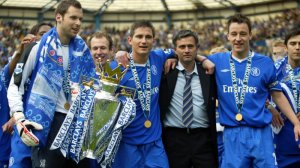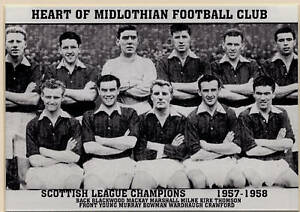This is a work in progress. Up to April 8, 2024 a total of 226 teams have been included on the list.
A
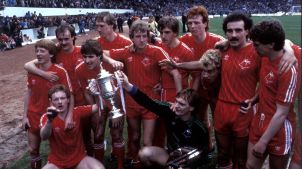
Aberdeen 1983-84: Jim Leighton, Stewart McKimmie, Alex McLeish, Willie Miller, Doug Rougvie, Neil Simpson, Gordon Strachan, Doug Bell, Neale Cooper, Ian Angus, Peter Weir, Billy Stark, Mark McGhee, John Hewitt, Eric Black.
Achievements: Scottish League Champions 1979-80, 1983-84 and 1984-95; Scottish Cup Winners 1982, 1983, 1984 and 1986. European Cup-Winners Cup Winners 1982-83; Scottish League Cup Winners 1986. Five year league record: 2, 3, 1, 1, 4
Manager: Alex Ferguson
Key men: Alex McLeish, dependable central defender. Willie Miller, described as the “best penalty box defender in the world”, by Ferguson. Gordon Strachan, perceptive midfielder once tipped to be Britain’s first £2m player.
Perception: Exciting “new firm” outfit that broke the mould in Scotland and helped end the Glasgow duopoly. Alex Ferguson’s prototype for Manchester United.
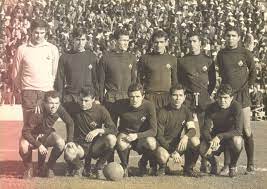 Académica de Coimbra 1966-67: João Maló, Rui Rodrigues, Vieira Nunes, Celestino Bárbara, António Mareues, Vitor Campos, Toni, Artur Jorge, Augusto Rocha, Serafim Peréira, Ernesto Sousa.
Académica de Coimbra 1966-67: João Maló, Rui Rodrigues, Vieira Nunes, Celestino Bárbara, António Mareues, Vitor Campos, Toni, Artur Jorge, Augusto Rocha, Serafim Peréira, Ernesto Sousa.
Manager/coach: Mario Wilson
Achievement: Primeira Liga runners-up 1966-67, Taca de Portugal runners-up 1966-67.
Key men: Augusto Rocha, Macau-born forward who won seven caps for Portugal. Artur Jorge, robust striker who went on to play for Benfica. Toni, played for Académica between 1965 and 1968 before joining Benfica where he played over 300 games and was capped 32 times by Portugal. Portuguese footballer of the year in 1972.
Perception: Very close to major success, deprived by Benfica and Setúbal.
 Accra Hearts of Oak 1999-2000: Sammy Adjei, Dan Quaye, Jacob Nettey, Edward Agyeman-Duah, Stephen Tetteh, Joe Ansah, Charles Allotey, Emmaneel Adjogu, Adjah tetteh, Edmond Copson, Ishmael Addo, Emmanuel Osei Kuffour, Charles Taylor, Osmanu Amadu, Yaw Amankwah Mireku.
Accra Hearts of Oak 1999-2000: Sammy Adjei, Dan Quaye, Jacob Nettey, Edward Agyeman-Duah, Stephen Tetteh, Joe Ansah, Charles Allotey, Emmaneel Adjogu, Adjah tetteh, Edmond Copson, Ishmael Addo, Emmanuel Osei Kuffour, Charles Taylor, Osmanu Amadu, Yaw Amankwah Mireku.
Manager: Cecil Jones Attuquayefio
Achievement: 1997-98 – Ghanaian League champions; 1999 – Ghanaian League champions and FA Cup winners; 2000 – CAF Champions League winners, Ghanaian League champions and FA Cup winners; 2001 – Ghanaian League champions; 2002 – Ghanaian League champions.
Key men: Daniel Quaye, a tough defender, capped by Ghana. Sammy Adjei, durable goalkeeper who won 37 caps and had three spells with Hearts of Oak. Ishmael Addo, prolific scorer nicknamed the “baby-faced assassin”.
Perception: Considered to be the finest batch of players to come out of Ghanaian football. Well-drilled and focused.
 AC Milan 1906-1907: Attilio Trere, Herbert Kilpin, Andrea Meschia, Alfred Bosshard, Oscar Giger, Hans Heuberger, Guido Pedroni, Giuseppe Rizzi, Guerriero Colombo, Ernst Widmer, Sandro Trere, Guido Moda, Guido Piazza, Hans Walter Imhoff, Johann Mädler
AC Milan 1906-1907: Attilio Trere, Herbert Kilpin, Andrea Meschia, Alfred Bosshard, Oscar Giger, Hans Heuberger, Guido Pedroni, Giuseppe Rizzi, Guerriero Colombo, Ernst Widmer, Sandro Trere, Guido Moda, Guido Piazza, Hans Walter Imhoff, Johann Mädler
Manager: Herbert Kilpin/ Daniele Angeloni
Achievement: Serie A champions 1906, 1907
Key men: Herbert Kilpin, exiled Englishman and versatile player. Founded AC Milan. Giuseppe Rizzi, midfielder capped by Italy.
Perception: Early champions of Italian football, driven by an Englishman.
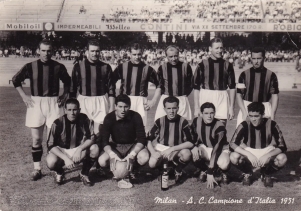 AC Milan 1950 to 1955: Lorenzo Buffon, Arturo Silvestri, Andrea Bonomi, Carlo Annovazzi, Omero Tognon, Renzo Burini, Gunnar Gren, Gunnar Nordahl, Nils Liedholm, Mario Renosto, Francesco Zagatti, Eduardo Ricagni, Amleto Frignani, Albano Vicaritto.
AC Milan 1950 to 1955: Lorenzo Buffon, Arturo Silvestri, Andrea Bonomi, Carlo Annovazzi, Omero Tognon, Renzo Burini, Gunnar Gren, Gunnar Nordahl, Nils Liedholm, Mario Renosto, Francesco Zagatti, Eduardo Ricagni, Amleto Frignani, Albano Vicaritto.
Coaches: Lajos Czeizler, Mario Sperone, Hector Puricelli, Bela Guttmann, Arrigo Morselli.
Achievements: Serie A winners 1950-51, 1954-55; Latin Cup winners 1951
Key men: Lorenzo Buffon – Considered to be one of the great goalkeepers of his generation. An acrobatic, athletic and reliable keeper who won 15 caps for Italy. Later played for Inter, Genoa and Fiorentina. Omero Tognon – Central midfielder who was renowned for his physical power as well as his sportsmanship. Capped 14 times by Italy. Gunnar Nordahl – Swedish forward signed from Norrkoping in 1948. A prolific goalscorer, he netted 221 goals in 268 for Milan and 43 goals in 33 appearances for Sweden. Powerful and physically strong, he was nicknamed Il Bisonte (the Bison). Nils Liedholm – Signed from Norrkoping in 1949, this Swedish midfielder was an intelligent and elegant playmaker who specialised in accurate crosses. Played 394 games for Milan, finishing with the club in 1961. Gunnar Gren – Another Swede, signed from IFK Goteborg in 1949, who spent four seasons with Milan. Capable of playing in midfield or as a striker. A skilful player who was known for his tactical savvy.
Perception: An attack-minded team built around the trio of Swedes, known as Gre-No-Li (Gren, Nordahl, Liedholm).
 AC Milan 1961-1963: Giorgio Ghezzi, Mario David, Mario Trebbi, Victor Benitez, Sandro Salvadore, Giovanni Trapattoni, Cesare Maldini, Luigi Radice, Dino Sani, Jose Altafini, Gianni Rivera, Bruno Mora, Paulo Barison, Gino Pivatelli
AC Milan 1961-1963: Giorgio Ghezzi, Mario David, Mario Trebbi, Victor Benitez, Sandro Salvadore, Giovanni Trapattoni, Cesare Maldini, Luigi Radice, Dino Sani, Jose Altafini, Gianni Rivera, Bruno Mora, Paulo Barison, Gino Pivatelli
Manager: Nereo Rocco
Achievement: Serie A champions 1961-62, European Cup winners 1962-63
Key men: Jose Altafini – Brazil-born striker who scored prolifically in Italy – quick, skilful and powerful; Gianni Rivera, graceful midfielder and “golden boy” of Italian football; Cesare Maldini, elegant long-serving defender.
Perception: Arch exponents of catenaccio, but capable of stunning, fast, counter-attacking football.
 AC Milan 1967-69: Fabio Cudicini, Angelo Anquilletti, Karl-Heinz Schnellinger, Roberto Rosato, Nevio Scala, Saul Malatrasi, Giovanni Trapattoni, Giovanni Lodetti, Kurt Hamrin, Angelo Sormani, Gianni Rivera, Pierino Prati.
AC Milan 1967-69: Fabio Cudicini, Angelo Anquilletti, Karl-Heinz Schnellinger, Roberto Rosato, Nevio Scala, Saul Malatrasi, Giovanni Trapattoni, Giovanni Lodetti, Kurt Hamrin, Angelo Sormani, Gianni Rivera, Pierino Prati.
Manager: Nereo Rocco
Achievement: Serie A champions 1967-68; European Cup-Winners’ Cup winners 1967-68; European Cup winners 1968-69
Key men: Gianni Rivera, graceful midfielder and “golden boy” of Italian football; Pierino Prati, sharp shooting forward, good in the air. Hat-trick in European Cup final 1969; Karl-Heinz Schnellinger, German full-back known as the Volkswagen for his relentless energy.
Perception: Continued the Milan expertise in Catenaccio, but with a little more attacking flair.
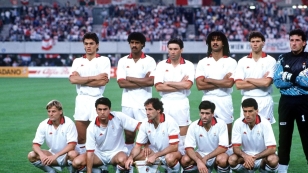 AC Milan 1987 to 1990: Giovanni Galli, Mauro Tassotti, Paolo Maldini, Angelo Colombo, Alessandro Costacurta, France Baresi, Roberto Donadoni, Frank Rijkaard, Marco van Basten, Ruud Gullit, Carlo Ancelotti, Alberico Evani, Antonio Virdis.
AC Milan 1987 to 1990: Giovanni Galli, Mauro Tassotti, Paolo Maldini, Angelo Colombo, Alessandro Costacurta, France Baresi, Roberto Donadoni, Frank Rijkaard, Marco van Basten, Ruud Gullit, Carlo Ancelotti, Alberico Evani, Antonio Virdis.
Coach: Arrigo Saachi
Achievements: Serie A winners 1987-88; European Cup winners 1988-89, 1989-90.
Five year league record in Serie A (1986-87 to 1990-91) 5 – 1 – 3 – 2 – 2
Key men: Paolo Maldini – One of the greatest defenders in the Euroopean game, Maldini could play left back or centre half. A versatile player who was also tough and a difficult opponent for any forward. Won 126 caps for Italy and played over 900 games for Milan. Franco Baresi – Played 700 times for Milan and won 81 caps for Italy. An accomplished and formidable defender who perfected the art of the sweeper. Captain of the team, he was an inspirational leader. Frank Rijkaard – Quick and strong, Rijkaard was able to play in central midfield or at the heart of the defence. He won 73 caps for the Netherlands and was in the Dutch side that won the European Championship in 1988. Marco van Basten – Although injury plagued in his career, Van Basten won three Ballon d’Or awards (1988, 1989 and 1992) and was rated as the most complete striker of his generation. He won 58 caps for the Netherlands and scored 283 goals in 379 games in his career. Ruud Gullit– With his dreadlocked hair, Gullit was an instantly-recognised figure when he burst on the scene, winning the Ballon d’Or in 1987 after joining Milan from PSV Eindhoven. A strong midfielder whose passing was matched by his ball-winning capabilities. First coined the phrase “sexy football” in the mid-1990s when he joined Chelsea.
Perception: Arguably the best team in Europe in the early-to-mid 1990s. Full of talent and flowing football.
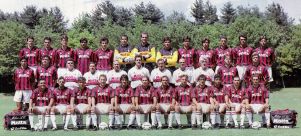 AC Milan 1993-94: Sebastiano Rossi, Mauro Tassotti, Christian Panucci, Paolo Maldini, Franco Baresi, Marcel Desailly, Demetrio Albertini, Filippo Galli, Zvonimir Boban, Roberto Donadoni, Dejan Savićević, Alessandro Costacurta, Daniele Massaro, Marco Simone, Jean-Pierre Papin, Stefano Eranio.
AC Milan 1993-94: Sebastiano Rossi, Mauro Tassotti, Christian Panucci, Paolo Maldini, Franco Baresi, Marcel Desailly, Demetrio Albertini, Filippo Galli, Zvonimir Boban, Roberto Donadoni, Dejan Savićević, Alessandro Costacurta, Daniele Massaro, Marco Simone, Jean-Pierre Papin, Stefano Eranio.
Coach: Fabio Capello
Achievements: Serie A winners 1991-92, 1992-93, 1993-94, 1995-96
Champions League winners 1993-94 runners-up 1992-93, 1994-95
Five year league record (1991-92 to 1995-96): 1 -1 -1 -4 -1
Key men: Marcel Desailly – Versatile, Ghana-born player signed from Marseille midway through the season. A powerful central defender or midfielder who was known as “the rock” due to his strength and powerful tackling. Won the World Cup with France in 1998 and was capped 116 times. Dejan Savićević – One of the key men in Red Star Belgrade’s 1991 European Cup triumph. Born in Montenegro, he won 56 caps for Yugoslavia and featured in the 1990 World Cup. A classic playmaker, he was skilful and very technical but was sometimes accused of lacking effort. His performance in the 1994 Champions League final was outstanding.Daniele Massaro – Although 33 years old in 1993-94, Massaro was top scorer for Milan in a memorable year and scored twice in the Champions League final. He was signed from Fiorentina in 1986 and went on to win 15 caps for Italy. Demetrio Albertini – Played 79 times for Italy and was rated one of the best midfielders of his generation. A tireless player who had good technique and strength, he made over 400 appearances for Milan in 14 seasons.
Perception: An excellent team with strength in depth. Tore a very good Barcelona side apart in the Champions League final.
Ajax Amsterdam 1970-73: Heinz Stuy; Wim Suurbier, Barry Hulshoff, Horst Blankenburg, Ruud Krol; Johan Neeskens, Arie Haan, Gerrie Muhren, Sjaak Swart; Johan Cruyff, Piet Keizer; Johnny Rep, Dick van Dijk
Achi evements: 1970-71 European Cup winners, KNVB Cup winners; 1971-72 Eredivisie champions, KNVB Cup winners, European Cup winners; 1972-73 Eredivisie champions, European Cup winners. Five year league record (1968-69 to 1972-73): 2 – 1 – 2 – 1 – 1
evements: 1970-71 European Cup winners, KNVB Cup winners; 1971-72 Eredivisie champions, KNVB Cup winners, European Cup winners; 1972-73 Eredivisie champions, European Cup winners. Five year league record (1968-69 to 1972-73): 2 – 1 – 2 – 1 – 1
Manager: Rinus Michels/ Stefan Kovacs
Key men: Johan Cruyff, arguably the number one player in the world in the early 1970s. Played for Ajax between 1964 and 1973, before moving to Barcelona in 1973. His domination of European football enabled him to win three Ballon d’Or titles in 1971, 1973 and 1974. He was capped 48 times by the Netherlands, scoring 33 goals. As a coach, Cruyff was very successful, winning five league titles and the 1992 European Cup with Barcelona. Ruud Krol, an Ajax youth product, Krol played in all 14 of the Netherlands’ World Cup games across the 1974 and 1978 competitions and was captain in 1978. He won 83 caps for the Netherlands, starting in November 1969 against England. Johan Neeskens, the perfect foil for Cruyff. A tough player who was energetic and very technical, becoming one of the first box-to-box midfielders in the modern game. After Ajax, he moved to Barcelona to link-up again with Rinus Michels and Cruyff. He won 49 caps for the Netherlands between 1970 and 1981, scoring 17 goals.
Perception: The arch exponents of “total football”. Arguably the greatest European team after Real Madrid of the 1950s. A team of their time, the epitome of “cool”.

Ajax Amsterdam 1994-95: Edwin van der Sar, Michael Reiziger, Danny Blind, Frank de Boer, Frank Rijkaard, Clarence Seedorf, Edgar Davids, Jari Lirmanen, Finidi George, Ronald de Boer, Marc Overmars, Winston Bogarde, Nwankwo Kanu, Patrick Kluivert.
Achievement: 1994-95 – Eredivisie champions, UEFA Champions League winners. 1995-96 Intercontinental Cup winners, Eredivisie champions, UEFA Champions League runners-up. Five year league record: 1, 1, 1, 4 , 1
Key men: Edgar Davids, a fiercely competitive midfielder. Patrick Kluivert, prodigious forward who netted 21 goals in 37 games in 1994-95. Frank de Boer, central defender/sweeper who was capped more than 100 times for Holland.
Manager: Louis van Gaal
Perception: Unbeaten in the league in 1994-95 and victorious against a strong Milan in the UCL final, Ajax revived memories of their glorious 1970s period with a young and vibrant team.
 Al-Ahly SC 2004-2009: Essam El Hadary, Amir Abdul Hamid, Islam El Shater, Tarek Said, Emad El-Nahhas, Wael Gomaa, Shady Mohamed, Emad Moteab, Hossam Ashour, Mohamed SHawky, Mohamed Aboutrika, Flavio da Silva Amado, Hassan Mostafa, Ahmad Sedik.
Al-Ahly SC 2004-2009: Essam El Hadary, Amir Abdul Hamid, Islam El Shater, Tarek Said, Emad El-Nahhas, Wael Gomaa, Shady Mohamed, Emad Moteab, Hossam Ashour, Mohamed SHawky, Mohamed Aboutrika, Flavio da Silva Amado, Hassan Mostafa, Ahmad Sedik.
Manager: Manuel Jose
Achievement: 2005: CAF Champions League winners, Egypt Premier League winners. 2006: CAF Champions League winners, Egypt Premier League winners, Egypt Cup winners. 2007: Egypt Premier League winners, Egypt Cup winners. 2008: CAF Champions League winners, Egypt Premier League winners. 2009: Egypt Premier League winners.
Key men: Essam El Hadary, one of the best goalkeepers in African football history. Emad Moteab, a prolific striker. Mohamed Aboutrika, rated one of Egypt’s best ever forwards.
Perception: One of the best teams to come out of African continent. Reliant on fast-moving front men.
 Anderlecht 1975-78: Jan Ruiter, Michel Lomme, Hugo Broos, Gilbert Van Binst, Jean Thissen, Jean Dockx, Johnny Dusbaba, Ludo Coeck, Francois Van der Elst, Peter Ressel, Arie Haan, Robbie Rensenbrink, Franky Vercauteren, Benny Nielsen
Anderlecht 1975-78: Jan Ruiter, Michel Lomme, Hugo Broos, Gilbert Van Binst, Jean Thissen, Jean Dockx, Johnny Dusbaba, Ludo Coeck, Francois Van der Elst, Peter Ressel, Arie Haan, Robbie Rensenbrink, Franky Vercauteren, Benny Nielsen
Key men: Francois Van der Elst, right winger who played 44 times for Belgium. Rob Rensenbrink, an introverted member of the famous Dutch national team of 1974.
Achievements: 1976 European Cup-Winners Cup winners; 1977 ECWC runners-up; 1978 ECWC winners. Belgian Cup winners 1975, 1976.
Manager: Hans Croon/ Raymond Goethels
Perception: Total football’s Belgian cousin – a team based on fast attacking play.
 Arbroath 1885: Jim Milne Sr, Bill Collie, Tom Salmond, Hen Rennie, Jim Milne Jr, Dyken Bruce, John Petrie, Johnny Tackett, Jim Marshall, David Crawford, Daniel Neil.
Arbroath 1885: Jim Milne Sr, Bill Collie, Tom Salmond, Hen Rennie, Jim Milne Jr, Dyken Bruce, John Petrie, Johnny Tackett, Jim Marshall, David Crawford, Daniel Neil.
Achievements: 36-0 victory in the Scottish Cup on September 12 1885 – a world record.
Key men: John “Jocky” Petrie, an 18 year-old right winger who scored 13 times in the game and tormented the Bon Accord defence. Jim Milne Junior, a powerful header of the ball.
Perception: Record-breaking team that will forever be listed in the history books.
 Argentinos Juniors 1984-85: Enrique Vidalle, Carmelo Villalba, Jose Luis Pavoni, Jorge Pellegrini, Adrian Domenech, Miguel Lemme, Caros Mayor, Emilio Commisso, Jorge Olguin, Sergio Batista, Renato Corsi, Mario Videla, Juan Jose Lopez, Claudio Borghi, Armando Dely Valdes, Carlos Ereros.
Argentinos Juniors 1984-85: Enrique Vidalle, Carmelo Villalba, Jose Luis Pavoni, Jorge Pellegrini, Adrian Domenech, Miguel Lemme, Caros Mayor, Emilio Commisso, Jorge Olguin, Sergio Batista, Renato Corsi, Mario Videla, Juan Jose Lopez, Claudio Borghi, Armando Dely Valdes, Carlos Ereros.
Key men: Claudio Borghi, attacking midfielder once considered to be the next big thing; Sergio Batista, midfielder who played in the 1986 World Cup final for Argentina; Adrian Domenech, defender who had a long career with the club.
Achievements: 1984 Primera (Metropolitano) winners; 1985 Copa Libertadores winners; 1985 Primera (Nacional) winners; 1985 Copa Interamericana winners.
Manager: Jose Yudica
Perception: Young, attacking team from Buenos Aires whose stay at the top was relatively short-lived.
 Arsenal 1929-1931: Dan Lewis, Charlie Preddy, Tom Parker, Alf Baker, Eddie Hapgood, Bob John, Bill Seddon, Herbie Roberts, Joe Hulme, Alex James, Jack Lambert, David Jack, Cliff Bastin, Charlie Jones, David Halliday
Arsenal 1929-1931: Dan Lewis, Charlie Preddy, Tom Parker, Alf Baker, Eddie Hapgood, Bob John, Bill Seddon, Herbie Roberts, Joe Hulme, Alex James, Jack Lambert, David Jack, Cliff Bastin, Charlie Jones, David Halliday
Manager: Herbert Chapman
Achievements: 1929-30 FA Cup winners; 1930-31 Football League champions. 1931-32: Football League runners-up, FA Cup runners-up. Five year league record: 9, 14, 1, 2, 1
Key men: Herbie Roberts, the first “stopper” centre half; Alex James, gifted inside forward; David Jack, £11,500 inside forward, one of the stars of the era.
Perception: The first London team to win the league, this was Herbert Chapman’s first great Arsenal line-up. Set a record for points won in 1930-31 and scored 127 goals in 42 games. With big sums paid to secure big names, this was also very much a title that was “bought”.

Arsenal 1932-1935: Frank Moss, George Male, Eddie Hapgood, Bob John, Jack Crayston, Frank Hill, Wilf Copping, Herbie Roberts, Joe Hulme, Jack Lambert, Ted Drake, Tim Coleman, David Jack, Alex James, Ray Bowden, Jimmy Dunne, Ralph Birkett, Charlie Jones, Cliff Bastin, Pat Beasley.
Manager: Herbert Chapman, Joe Shaw (caretaker), George Allison.
Achievement: Football League champions 1932-33, 1933-34, 1934-35.
Five-year league record: 1- 2 – 1 -1 – 1
Key men: Eddie Hapgood, an elegant and cool defender, signed from Kettering in 1927, spending 17 years with Arsenal. Won 30 England caps; Ted Drake, powerful and brave centre forward signed from Southampton. Good in the air and possessing a powerful shot, he won five caps for England; Cliff Bastin, goalscoring winger who joined from Exeter in 1929. Known as “boy Bastin” due to his youthful appearance. 21 England caps.
Perception: A well-drilled, functional set of players schooled in the ways of legendary manager Herbert Chapman. Sometimes accused of over-caution, but their quality was never in doubt.

Arsenal 1950-1953: George Swindin, Jack Kelsey, Laurie Scott, Walley Barnes, Alex Forbes, Leslie Compton, Joe Mercer, Freddie Cox, Jimmy Logie, Peter Goring, Reg Lewis, Dennis Compton, Lionel Smith, Ray Daniel, Cliff Holton, Doug Lishman, Don Roper, Joe Wade, Arthur Milton, Arthur Shaw.
Manager: Tom Whittaker
Achievement: Football League champions 1952-53, runners-up 1951-52; FA Cup runners-up 1951-52.
Five year league record: 5 – 2- 1 – 12 – 9
Key men: Joe Mercer, wing half who was a popular figure in the game, joined from Everton after the second world war at the veteran stage of his career; England international, five caps; Walley Barnes, Welsh full back (22 caps), joined from Southampton in 1943. A versatile player; Alex Forbes, Scottish international wing half who won 14 caps for his country. Went on to become a successful coach.
Perception: An ageing team possessing a strong defence. Frequently called “lucky Arsenal” by the media.
 Arsenal 1997-98: David Seaman, Lee Dixon, Nigel Winterburn, Patrick Vieira, Steve Bould, Tony Adams, Ian Wright, Nicolas Anelka, Dennis Bergkamp, Marc Overmar, Ray Parlou, Emmanuel Petit, Giles Grimandi, David Platt.
Arsenal 1997-98: David Seaman, Lee Dixon, Nigel Winterburn, Patrick Vieira, Steve Bould, Tony Adams, Ian Wright, Nicolas Anelka, Dennis Bergkamp, Marc Overmar, Ray Parlou, Emmanuel Petit, Giles Grimandi, David Platt.
Manager: Arsène Wenger.
Achievement: Premier League champions 1997-98; FA Cup winners 1997-98.
Five-year league record: 5 – 3 – 1 – 2 – 2
Key men: Marc Overmars, two-footed winer with pace and tremendous acceleration. Dutch international signed from Ajax, he spent three years with the club before joining Barcelona; Patrick Vieira, Senegalese born midfielder full of power and aggression, joined from AC Milan. 107 caps for France; Dennis Bergkamp, highly-skilled Dutch legend who joined Arsenal from Inter Milan in 1995. Top scorer in the double-winning season of 1998. 79 caps for the Netherlands.
Perception: Emerging power built on Wenger’s innovative methods, some of which changed English football for ever. Wonderful to watch.
 Arsenal 2001-2005: Jens Lehmann, David Seaman, Ashley Cole, Lauren, Sol Campbell, Martin Keown, Kolo Toure, Oleg Luzhny, Patrick Vieria, Robert Pires, Fredrik Ljungberg, Ray Parlour, Edu, Gilberto Silva, Dennis Bergkamp, Thierry Henry, Sylvain Wiltord, Nwankwo Kanu
Arsenal 2001-2005: Jens Lehmann, David Seaman, Ashley Cole, Lauren, Sol Campbell, Martin Keown, Kolo Toure, Oleg Luzhny, Patrick Vieria, Robert Pires, Fredrik Ljungberg, Ray Parlour, Edu, Gilberto Silva, Dennis Bergkamp, Thierry Henry, Sylvain Wiltord, Nwankwo Kanu
Manager: Arsene Wenger
Achievements: 2001-02 Premier League winners, FA Cup winners; 2002-03 FA Cup winners; 2003-04 Premier League champions; 2004-05 FA Cup winners. Five year league record: 1,2, 1, 2, 4
Key men: Patrick Vieria, Senegalese-born midfielder, power and precision. Dennis Bergkamp, sublime skills and spectacular goals. Thierry Henry, pace and intricate skill in abundance.
Perception: Unbeaten in the Premier League 2003-04, the last great side produced by Arsenal and Wenger. Excellent footballing team.
Arsenal 1970-71: Bob Wilson, Pat Rice, Bob McNab, Peter Storey, Frank McClintock, Peter Simpson,  George Armstrong, George Graham, John Radford, Ray Kennedy, Charlie George, Eddie Kelly.
George Armstrong, George Graham, John Radford, Ray Kennedy, Charlie George, Eddie Kelly.
Achievements: Football League Champions, FA Cup winners. Pre: FL Cup runners-up 1968 and 1969, Inter Cities Fairs Cup winners 1970. Post: FA Cup finalists 1972. Five-year league record: 4, 12, 1, 5, 2
Key men: Frank McClintock, veteran skipper; George Graham, strolling midfielder; Ray Kennedy, powerful striker; and Charlie George, precocious local lad.
Manager: Bertie Mee
Perception: Dull, consistent and workmanlike. Effective.
 Argentina 1928-30: Juan Botasso, Angel Bossio, Francisco Varallo, Jose Della Torre, Juan Evaristo, Ludovico Bidoglio, Fernando Paternoster, Segundo Medici, Adolfo Zumelzu, Luis Monti, Juan Evaristo, Mario Evaristo, Alfredo Carricaberry, Domingo Tarasconi, Pedro Suarez, Manuel Ferreira, Feliciano Perducca, Raimundo Orsi, Guillerme Stabile, Carlos Peucelle.
Argentina 1928-30: Juan Botasso, Angel Bossio, Francisco Varallo, Jose Della Torre, Juan Evaristo, Ludovico Bidoglio, Fernando Paternoster, Segundo Medici, Adolfo Zumelzu, Luis Monti, Juan Evaristo, Mario Evaristo, Alfredo Carricaberry, Domingo Tarasconi, Pedro Suarez, Manuel Ferreira, Feliciano Perducca, Raimundo Orsi, Guillerme Stabile, Carlos Peucelle.
Manager: Francisco Olazar
Achievement: Olympic Games silver medalists 1928, World Cup runners-up 1930, Copa America winners 1927, 1929
Key men: Raimundo Orsi – Quick-footed left winger, one of the greatest of his time. Adolfo Zumelzu, half back who knew how to score goals. Guillerme Stabile, free-scoring centre forward. Luis Monti, midfield player who was rugged and ruthless.
Perception: Only Uruguay could claim to be the best on the planet at the time. Skilful, full of flair, perhaps lacking method and discipline.
 Argentina 1978: Ubaldo Filol; Jorge Olguin, Luis Galvan, Daniel Passarella, Alberto Tarantini; Americo Gallego, Osvaldo Ardiles, Daniel Bertoni, Oscar Alberto Ortiz; Leopoldo Luque, Mario Kempes. Rene Houseman, Norberto Alonso, Omar Larrosa.
Argentina 1978: Ubaldo Filol; Jorge Olguin, Luis Galvan, Daniel Passarella, Alberto Tarantini; Americo Gallego, Osvaldo Ardiles, Daniel Bertoni, Oscar Alberto Ortiz; Leopoldo Luque, Mario Kempes. Rene Houseman, Norberto Alonso, Omar Larrosa.
Achievement: World Cup 1974: Last eight; Copa America 1975: Round One; World Cup 1978: Winners – 3-1 v Holland; Copa America 1979: Round One
Key men: Daniel Passarella, tough skipper; Osvaldo Ardiles, tricky and nimble in midfield; Mario Kempes, top scorer in World Cup 1978.
Manager: Cesar Luis Menotti
Perception: Assisted by home advantage in 1978. Exciting going forward.
 Argentina 1986: Neri Pumpido, Jose Luis Brown, Jose Cuciuffo, Oscar Ruggeri,Ricardo Giusti, Julio Olarticoechea, Sergio Batista, Hector Enrique, Diego Maradona, Jorge Burruchaga, Jorge Valdano, Marcelo Trobbiani, Ricardo Bochin, Carlos Daniel Tapia, Pedro Pasculli.
Argentina 1986: Neri Pumpido, Jose Luis Brown, Jose Cuciuffo, Oscar Ruggeri,Ricardo Giusti, Julio Olarticoechea, Sergio Batista, Hector Enrique, Diego Maradona, Jorge Burruchaga, Jorge Valdano, Marcelo Trobbiani, Ricardo Bochin, Carlos Daniel Tapia, Pedro Pasculli.
Achievement: World Cup winners 1986.
Key men: Diego Maradona, who recovered from a disappointing 1982 competition to lead his country to victory. Jorge Valdano, fast-moving forward who became an accomplished football administrator.
Manager: Carlos Bilardo
Perception: Heavily reliant on Maradona, then the best player in the world – he drove them through the 1986 World Cup with a series of virtuoso – and often controversial – performances.

Aston Villa 1896-97: Jimmy Whitehouse; Howard Spencer, Jack Reynolds; Albert Evans, James Cowan, Jimmy Crabtree; Charlie Athersmith, Jack Devey, John Campbell, Fred Wheldon, John Cowan.
Achievements: 1893-94 FL Champions; 1894-95 FA Cup Winners; 1895-96 FL Champions; 1896-97 FA Cup Winners and FL Champions. Five year league record: 3, 1, 1, 6, 1
Key men: Charlie Athersmith, England winger; Jimmy Cowan, Scottish half-back, renowned for his speed; Fred Wheldon, England inside left who joined the club in 1896 and topped scoring list with 21 goals.
Manager: George Ramsay
Perception: Victorian England’s most successful club. Influential, consistent and packed with impressive players.
 Aston Villa 1912-13: Sam Hardy, Tom Lyons, Tommy Weston, Tommy Barber, Jimmy Harrop, Jimmy Leach, Charlie Wallace, Clem Stephenson, Harry Hampton, Harold Halse, Joseph Bache, Albert Hall, William Morris, Sam Whittaker.
Aston Villa 1912-13: Sam Hardy, Tom Lyons, Tommy Weston, Tommy Barber, Jimmy Harrop, Jimmy Leach, Charlie Wallace, Clem Stephenson, Harry Hampton, Harold Halse, Joseph Bache, Albert Hall, William Morris, Sam Whittaker.
Manager: George Ramsay
Achievement: 1912-13 FA Cup winners, runners-up Football League. Five year league record: 2, 6, 2, 2, 14
Key men: Sam Hardy, England goalkeeper who was one of the best of his generation – known as “safe and stead Sam”. Clem Stephenson, cultured inside forward who later played for Herbert Chapman’s Huddersfield. Harry Hampton – England international forward who scored 30 goals in 1912-13.
Perception: Went neck-and-neck with Sunderland for both major honours, Villa winning the FA Cup and Sunderland edging them out in the league title race.
 Aston Villa 1980-1982: Jimmy Rimmer, Kenny Swain, Gary Williams, Colin Gibson, Dennis Mortimer, Ken McNaught, Allan Evans, Gordon Cowans, Des Bremner, Tony Morley, Gary Shaw, Peter Withe. David Geddis, Brendan Ormsby, Nigel Spink, Andy Blair.
Aston Villa 1980-1982: Jimmy Rimmer, Kenny Swain, Gary Williams, Colin Gibson, Dennis Mortimer, Ken McNaught, Allan Evans, Gordon Cowans, Des Bremner, Tony Morley, Gary Shaw, Peter Withe. David Geddis, Brendan Ormsby, Nigel Spink, Andy Blair.
Manager: Ron Saunders/Tony Barton
Achievement: 1980-81 – Football League Champions; 1981-82 – European Cup winners. Five year league record: 8, 7, 1, 11, 6
Key men: Dennis Mortimer, swashbuckling midfielder. Gordon Cowans, talented youngster capped 10 times by England. Peter Withe, under-rated centre forward.
Perception: Often overlooked, Villa not only overcome the more popular Ipswich but also surprised Europe by beating Bayern Munich a year later in the European Cup final.
 Athletic Bilbao 1933-36: Gregorio Blasco, Jose Ispizua, Luis Uribe, Issac Oceja, Luis Zabala, Martin Calvo, Angel Zubieta, Roberto, Jose Muguerza, Manuel Yurrebasco, Guillermo Gorostiza, Jose Iraragorri, Bata, Elices, Jose Careaga, Javier Moronati, Leonardo Cilaurren, Jose Castellanos, Juan Jose Urquizio
Athletic Bilbao 1933-36: Gregorio Blasco, Jose Ispizua, Luis Uribe, Issac Oceja, Luis Zabala, Martin Calvo, Angel Zubieta, Roberto, Jose Muguerza, Manuel Yurrebasco, Guillermo Gorostiza, Jose Iraragorri, Bata, Elices, Jose Careaga, Javier Moronati, Leonardo Cilaurren, Jose Castellanos, Juan Jose Urquizio
Manager: Fred Pentland/ Patricio Caicedo
Achievement: 1931-32: Copa del Rey winners; 1932-33: Copa del Rey winners; 1933-34: La Liga champions; 1935-36: La Liga champions. Five year league record: 2, 2, 1, 4, 1
Key men: Guillermo Gorostiza, prolific goalscorer who netted 106 goals in 146 games for Bilbao. Bata (Agustín Sauto Arana) a menacing striker who was known as El terror de San Mames. Gregorio Blasco, goalkeeper who won the prestigious Ricardo Zamora award three times.
Perception: Exciting, fast-moving team full of talented forwards that dominated Spanish football for a few years.
 Atletico Madrid 2011-14: Thibaut Courtois, Juanfran, Filipe Luis, Diego Godin, Miranda, Arda Turan, Tiago, Koke, Gabi, Diego Costa, David Villa, Adrian, Raul Garcia, Toby Alderweireld, Sosa, Radamel Falcao
Atletico Madrid 2011-14: Thibaut Courtois, Juanfran, Filipe Luis, Diego Godin, Miranda, Arda Turan, Tiago, Koke, Gabi, Diego Costa, David Villa, Adrian, Raul Garcia, Toby Alderweireld, Sosa, Radamel Falcao
Manager: Diego Simeone
Achievements: 2011-12 Europa League winners, 2012-13 Copa del Rey winners, 2013-14 La Liga winners, UEFA Champions League runners-up. Five year league record: 5, 3, 1, 3, 3
Key men: Thibaut Courtois, young Belgian goalkeeper on loan from Chelsea; Raul Garcia, central midfielder with an eye for goal; Diego Costa, Brazilian-born forward who stepped into the role vacated by Falcao.
Perception: Broke the Real-Barca duopoly with their high-octane style. Went so close to winning the Champions League against arch-rivals Real Madrid.
 Atletico Nacional 1989-1991: Rene Higuita, Hugo Almeida, Gillardo Gomez, Pablo Escobar, Geovanis Cassiani, Leonal Alvarez, Luis Herrera, Luis Carlos Perea, Jaime Arango, Alexis Garcia, Gustavo Restrepo, Niver Arboledo, John Trellez, Albeiro Usuriaga.
Atletico Nacional 1989-1991: Rene Higuita, Hugo Almeida, Gillardo Gomez, Pablo Escobar, Geovanis Cassiani, Leonal Alvarez, Luis Herrera, Luis Carlos Perea, Jaime Arango, Alexis Garcia, Gustavo Restrepo, Niver Arboledo, John Trellez, Albeiro Usuriaga.
Manager: Pacho Maturano
Achievement: Copa Libertadores winners 1989; Colombian Primera A winners 1991 – runners-up 1988, 1990.
Key men: Rene Higuita, flamboyant goalkeeper famed for his scorpion kick.
Perception: Rated one of South America’s top 20 clubs, arguably Colombia’s finest.
 Australia 2015: Matt Ryan, Ivan Franjic; Trevor Sainsbury, Matthew Spiranovic, Jason Davidson, Mark Milligan, Mile Jedinak, Massimo Luongo, Robbie Krusa, Matthew Leckie, Tim Cahill, James Troisi, Matt McKay, Tomi Juric.
Australia 2015: Matt Ryan, Ivan Franjic; Trevor Sainsbury, Matthew Spiranovic, Jason Davidson, Mark Milligan, Mile Jedinak, Massimo Luongo, Robbie Krusa, Matthew Leckie, Tim Cahill, James Troisi, Matt McKay, Tomi Juric.
Achievement: AFC Asian Cup winners 2015; World Cup finals qualification 2014 and 2018
Manager: Ange Postecoglou
Key men: Massimo Luongo, named player of the 2015 Asian Cup with the most assists. Played for QPR. Italian descent; Tim Cahill, attacking midfielder who played for Millwall and Everton, among others.
Perception: Much travelled band of players that benefitted from their experiences to become Asian champions.
 Austria 1932-34: Peter Platzer, Franz Cisar, Karl Sesta, Walter Nausch, Franz Wagner, Josef Smistik, Johann Urbanek, Anton Schall, Rudolf Viertl, Josef Bican, Matthias Sindelar, Matthias Kaburek, Franz Binder, Johann Horvath, Karl Zischek.
Austria 1932-34: Peter Platzer, Franz Cisar, Karl Sesta, Walter Nausch, Franz Wagner, Josef Smistik, Johann Urbanek, Anton Schall, Rudolf Viertl, Josef Bican, Matthias Sindelar, Matthias Kaburek, Franz Binder, Johann Horvath, Karl Zischek.
Achievements: World Cup semi-finals 1934; Central European International Cup 1931-32.
Manager: Hugo Meisl
Key men: Matthias Sindelar – frail, skilful and influential forward. Johann Horvath, an extremely technical player and prolific scorer. Josef Bican, scorer of over 600 goals in his career. Walter Nausch, captain and versatile member of team.
Perception: Das Wunderteam – the forefathers of “Total football” and arguably one of the best teams never to have won the World Cup.
 FK Austria Vienna 1933-1936: Johann Billich, Rudolf Zoehrer, Karl Andritz, Karl Sesta, Karl Graf, Walter Nausch, Karl Adamek, Matthias Najemnik, Johann Mock, Karl Gall, Josef Molzer, Franz Riegler, Josef Stroh, Matthias Sindelar, Camillo Jerusalem, Rudolf Viertl.
FK Austria Vienna 1933-1936: Johann Billich, Rudolf Zoehrer, Karl Andritz, Karl Sesta, Karl Graf, Walter Nausch, Karl Adamek, Matthias Najemnik, Johann Mock, Karl Gall, Josef Molzer, Franz Riegler, Josef Stroh, Matthias Sindelar, Camillo Jerusalem, Rudolf Viertl.
Manager: Josef Blum, Robert Lang, Walter Nausch
Achievement: Mitropa Cup winners 1933, 1936; Austrian Cup winners 1933, 1935, 1936
Key men: Matthias Sindelar, the legendary “man of paper”, skilful and influential forward. Full back Walter Nausch, captain of the “wunderteam” and supremely fit. Rudolf Viertl, winger who played for Austria in the 1934 World Cup.
Perception: Aligned to the Austrian “wunderteam” and full of class. Better in cup competitions than in the league.
B
 Barcelona 1958-1961: Antoni Ramallets, Foncho, Ramon Larraz, Celdrán, Carlos Medrano, Ferran Olivella, Jose Pinto, Rodri, Brugué, Gracia Rifé, Goicotea, Biosca, Sigfrid Gracia, Hermes González, Jesus Garay, Joan Segarra, Enric Gensana, Marti Vergés, Flotats, Ladislao Kubala, Evaristo, Eulogio Martínez, Luis Suárez, Zoltan Czibor, Sandor Kocsis, Luis Coll, Justo Tejada, Suco, Sampedro, Ramon Villaverde, Ribelles, Estremo
Barcelona 1958-1961: Antoni Ramallets, Foncho, Ramon Larraz, Celdrán, Carlos Medrano, Ferran Olivella, Jose Pinto, Rodri, Brugué, Gracia Rifé, Goicotea, Biosca, Sigfrid Gracia, Hermes González, Jesus Garay, Joan Segarra, Enric Gensana, Marti Vergés, Flotats, Ladislao Kubala, Evaristo, Eulogio Martínez, Luis Suárez, Zoltan Czibor, Sandor Kocsis, Luis Coll, Justo Tejada, Suco, Sampedro, Ramon Villaverde, Ribelles, Estremo
Manager: Helenio Herrera / Enrique Orizaola
Achievement: 1957-58 – Inter-Cities Fairs Cup winners; 1958-59 – Lia Liga champions, Copa del Rey winners; 1959-60 – La Liga champions, Inter-Cities Fairs Cup winners; 1960-61 – European Cup finalists.
Key men: Luis Suarez, Spanish international striker who became world’s most expensive player in 1961. Ladislao Kubala, Hungarian-born forward who scored 131 goals in 186 games for Barca.
Perception: Multi-national team fashioned by Herrera, reliant on the awesome striking power of Suarez and Kubala.
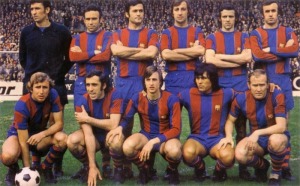 Barcelona 1973-74: Salvador Sadurni, Jesus De La Cruz, Joaquim Rife, Antonio Torres, Juan Manuel Asensi, Juan Carlos, Marcial, Enrique Costas, Hugo Sotil, Carlos Rexach, Johan Cruyff, Gallego, Juanito, Manuel Tome
Barcelona 1973-74: Salvador Sadurni, Jesus De La Cruz, Joaquim Rife, Antonio Torres, Juan Manuel Asensi, Juan Carlos, Marcial, Enrique Costas, Hugo Sotil, Carlos Rexach, Johan Cruyff, Gallego, Juanito, Manuel Tome
Manager: Rinus Michels
Achievements: 1973-74 La Liga champions. Five year league record: 3, 2, 1, 3, 2
Key men: Johan Cruyff, the legendary Dutch international, who drove Barca to their first title in 14 years; Carles Rexach, winger who formed a successful partnership with Cruyff; Juan Manuel Asensi, goalscoring midfielder.
Perception: Inspired by Cruyff, then the best player in the world, Barca ended a long, lean spell to secure the title.
 Barcelona 2008-2011: Victor Valdes, Carles Puyol, Dani Alves, Yaya Toure, Javier Mascherano, Gerard Pique, Sylvinho, Sergio Busquets, Xavi, Andres Iniesta, Cesc Fabregas, Alexis Sanchez, Lionel Messi, David Villa, Thierry Henry, Samuel Eto’o, Pedro, Isaac Cuenca
Barcelona 2008-2011: Victor Valdes, Carles Puyol, Dani Alves, Yaya Toure, Javier Mascherano, Gerard Pique, Sylvinho, Sergio Busquets, Xavi, Andres Iniesta, Cesc Fabregas, Alexis Sanchez, Lionel Messi, David Villa, Thierry Henry, Samuel Eto’o, Pedro, Isaac Cuenca
Manager: Pep Guardiola
Achievement: La Liga champions 2008-09, 2009-10, 2010-11; Copa del Rey winners 2008-09; UEFA Champions League winners 2008-09, 2010-11; FIFA World Club Cup winners 2009, 2011.
Key men: Lionel Messi, sublimely talented Argentinian international; Andreas Iniesta, often under-estimated midfielder; Xavi, precise and energetic midfielder.
Perception: The epitome of tiki-take, total football and latin flair. One of the great teams of the modern era.
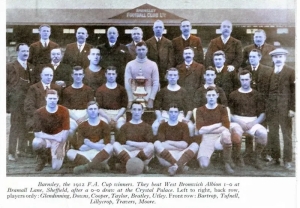 Barnsley 1909-1912: Fred Mearns, Jack Cooper, Dickie Downs, Archie Taylor, Harry Ness, Bob Glendenning, Tommy Boyle, George Utley, Wilfred Bartrop, Philip Bratley, Harry Tufnell, George Lillycrop, Ernie Gadsby, George Travers, Tom Forman, Jimmy Moore.
Barnsley 1909-1912: Fred Mearns, Jack Cooper, Dickie Downs, Archie Taylor, Harry Ness, Bob Glendenning, Tommy Boyle, George Utley, Wilfred Bartrop, Philip Bratley, Harry Tufnell, George Lillycrop, Ernie Gadsby, George Travers, Tom Forman, Jimmy Moore.
Manager: Arthur Fairclough
Achievements: FA Cup winners 1911-12, runners-up 1909-10.
Key men: Harry Tufnell, scored the winning goal in the 1912 FA Cup final. An inside foeward who was signed from Bury. Score 61 goals in 199 games for Barnsley. George Utley, a talented half back who won the Cup with Barnsley and Sheffield United (1915). Capped once by England in 1913. The only Barnsley player to play for England. Tommy Boyle, signed from local football, he was a hard-tackling half back who won a single cap for England. Later won the FA Cup and league with Burnley.
Perception: Punched above their weight in the FA Cup, mid-table second division side in 1910, finishing sixth in 1912.
 Bayer Leverkusen 2001-02: Hans-Jörg Butt, Zoltán Sebescen, Boris Živković, Lúcio, Diege Placente, Carsten Ramelow, Bernd Schneider, Michael Ballack, Thomas Brdarić, Yidiray Bastürk, Oliver Neuville, Marko Babic, Ulf Kirsten, Dimitar Berbatov, Zé Roberto.
Bayer Leverkusen 2001-02: Hans-Jörg Butt, Zoltán Sebescen, Boris Živković, Lúcio, Diege Placente, Carsten Ramelow, Bernd Schneider, Michael Ballack, Thomas Brdarić, Yidiray Bastürk, Oliver Neuville, Marko Babic, Ulf Kirsten, Dimitar Berbatov, Zé Roberto.
Manager: Klaus Topmöller
Achievement: 2001-02 – runners up in UEFA Champions League, DFB Pokal and Bundesliga.
Key men: Ulf Kirsten, Stocky striker who played for East Germany and Germany. Scored 237 goals in 446 games for Leverkusen; Michael Ballack, outstanding and versatile midfielder, powerful and physically strong. East German born, his long career included spells with Bayern Munich and Chelsea; Carsten Ramelow, strong, tough tackling central defender. Could also play in midfield.
Perception: A talented, strong team that bit off more than it could chew. Threw away a five-point advantage in the final weeks of the Bundesliga season. Losing all three major prizes gave birth to the jibes “treble horror” and “Neverkusen”.
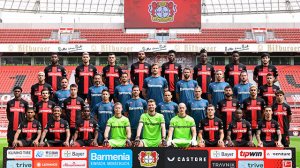 Bayer Leverkusen 2023-24: Lukas Hradecky, Piero Hincapíe, Jonathan Tah, Odilon Kossounou, Edmond Tapsoba, Jeremie Frimpong, Nathan Tella,Granit Xhaka, Jonas Hofmann, Robert Andrich, Exequiel Palacios, Florian Wirtz, Alejandro Grimaldo, Patrik Schick, Amine Adli, Adam Hložek, Victor Boniface.
Bayer Leverkusen 2023-24: Lukas Hradecky, Piero Hincapíe, Jonathan Tah, Odilon Kossounou, Edmond Tapsoba, Jeremie Frimpong, Nathan Tella,Granit Xhaka, Jonas Hofmann, Robert Andrich, Exequiel Palacios, Florian Wirtz, Alejandro Grimaldo, Patrik Schick, Amine Adli, Adam Hložek, Victor Boniface.
Manager: Xabi Alonso
Achievements: Bundesliga champions 2023-24. DFB Pokal finalists 2023-24 (final to come), UEFA Europa League QF.
Key men: Florian Wirtz, young midfielder who joined the club from Köln’s youth system and became a first team player in 2020. Capped 16 times by Germany, his goals from midfield and creativity were pivotal in Leverkusen’s first Bundesliga triumph. Granit Xhaka, experienced and tenacious midfielder signed from Arsenal for € 25 million. Swiss international, capped 126 times, he has also played for Basel and Borussia Mönchengladbach. Alejandro Grimaldo, Valencia-born defender who was signed on a free transfer from Benfica and proved to be one of the best signings of the season. Capped twice by Spain, he was most effective as a left-sided wing-back. Victor Boniface, robust centre forward who arrived from Union Saint-Gilloise in July 2023 for € 20 million. Commanding in the air, he also possessed excellent dribbling skills.
Perception: Outstanding team spirit and determination. Swift counter-attacking side that ended Bayern Munich’s dominant run in German football.
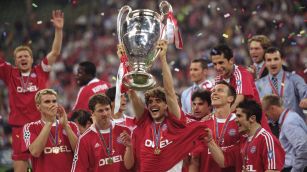 Bayern Munich 2000-01: Oliver Kahn, Thomas Linke, Willy Sagnol, Samuael Kuffour, Patrick Andersson, Bixente Lizarazu, Hassan Salihamidžić, Mehmet Scholl, Owen Hargreaves, Thorsten Fink, Michael Tarnet, Jens Jeremies, Stefen Effenberg, Ciriaco Sforze, Giovane Élber, Paulo Sergio, Carsetn Jancker, Alexander Zickler, Roque Santa Cruz
Bayern Munich 2000-01: Oliver Kahn, Thomas Linke, Willy Sagnol, Samuael Kuffour, Patrick Andersson, Bixente Lizarazu, Hassan Salihamidžić, Mehmet Scholl, Owen Hargreaves, Thorsten Fink, Michael Tarnet, Jens Jeremies, Stefen Effenberg, Ciriaco Sforze, Giovane Élber, Paulo Sergio, Carsetn Jancker, Alexander Zickler, Roque Santa Cruz
Manager: Ottmar Hitzfeld
Achievement: DFB Pokal winners 1999-00, Bundesliga champions 2000-01, UEFA Champions League winners 2000-01, Intercontinental Cup winners 20001. Five-year record: 1 – 1 – 1 – 3 – 1
Key men: Oliver Kahn, goalkeeper with excellent reflexes and agility, as well as a superb big game temperament; Steffen Effenberg, captain and central midfielder, named UEFA club player of the year in 2001; Giovane Élber, top scorer, Brazilian international prolific throughout career.
Perception: Relatively uninspiring, multi-national Bayern were controversial league champions and ground out a Champions League win on penalties against Valencia.
Bayern Munich 2012-13
 Manuel Neuer, Dante, Jéròme Boateng, Philipp Lahm, David Alaba, Franck Ribèry, Javi Martinez, Arjen Robben, Xherdan Shaqiri, Thomas Müller, Luiz Gustavo, Bastian Schweinsteiger, Tony Kroos, Mario Mandžukić, Mario Gomez
Manuel Neuer, Dante, Jéròme Boateng, Philipp Lahm, David Alaba, Franck Ribèry, Javi Martinez, Arjen Robben, Xherdan Shaqiri, Thomas Müller, Luiz Gustavo, Bastian Schweinsteiger, Tony Kroos, Mario Mandžukić, Mario Gomez
Manager:Juup Heynckes
Achievement: DFB Pokal winners 2012-13, Bundesliga champions 2012-13, UEFA Champions League winners 2012-13. Five-year record: 3 – 2 – 1 – 1- 1
Key men: Manuel Neuer, one of the most successful sweeper-keepers with sharp reflexes and skilful footwork; Philipp Lahm, known as “magic dwarf” owing to his diminutive appearance. Defence or midfield, skipper of the team. 113 caps for Germany; Tony Kroos, the archetypal modern attacking midfielder. Superb passing ability and technique.
Perception:Record-breaking team, (30 records broken in 2012-13), playing with pace, power and patience.
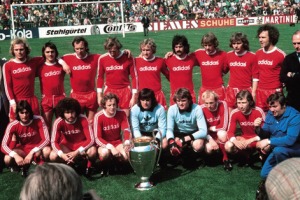 Bayern Munich 1973-1976: Sepp Maier, Johnny Hansen, Bjorn Andersson, Paul Breitner, Udo Horsmann, Hans-Grog Schwarzenbeck, Franz Beckenbauer, Franz Roth, Conny Torstensson, Rainer Zobel, Gerd Mueller, Uli Hoeness, Jupp Kapellmann, Bernd Duernberger, Klaus Wuender, Sepp Weiss, Karl-Heinz Rummenigge, Hugo Robl
Bayern Munich 1973-1976: Sepp Maier, Johnny Hansen, Bjorn Andersson, Paul Breitner, Udo Horsmann, Hans-Grog Schwarzenbeck, Franz Beckenbauer, Franz Roth, Conny Torstensson, Rainer Zobel, Gerd Mueller, Uli Hoeness, Jupp Kapellmann, Bernd Duernberger, Klaus Wuender, Sepp Weiss, Karl-Heinz Rummenigge, Hugo Robl
Manager: Udo Lattek/ Dettmar Cramer
Achievement: 1971-72 – Bundesliga champions; 1972-73 – Bundesliga champions; 1973-74 – European Cup winners, Bundesliga champions; 1974-75 – European Cup winners; 1975-76 – European Cup winners.
Key men: Sepp Maier, giant goalkeeper with huge hands. Franz Beckenbauer, Der Kaiser, the quintessential libero. Gerd Mueller, a goal machine for club and country.
Perception: Machine-like at times, the epitome of German football in the 1970s.
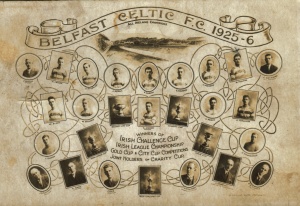 Belfast Celtic 1925-29: Chris Fitzmaurice, Jack Diffin, Billy Scott, Bob Ferguson, Billy Pollock, Bertie Fulton, Mickey Hamill, Samuel Moore, Jack McGrillen, Paddy Gallagher, Jimmy Ferris, Sammy Curran, Stanley Mahood, John Mahood.
Belfast Celtic 1925-29: Chris Fitzmaurice, Jack Diffin, Billy Scott, Bob Ferguson, Billy Pollock, Bertie Fulton, Mickey Hamill, Samuel Moore, Jack McGrillen, Paddy Gallagher, Jimmy Ferris, Sammy Curran, Stanley Mahood, John Mahood.
Manager: Austin Donnelly
Achievements: Irish League champions 1926, 1927, 1928, 1929; Irish Cup winners 1926.
Key men: Mickey Hammill, considered to be one of Ireland’s best from the 1920s. Won seven caps and played for Celtic, Manchester United and Manchester City. A skilful inside forward or half-back. Sammy Curran, known as “blind Sammy” because he only had eyes for goals. Scored 170 times for Belfast Celtic. Won four caps for Ireland. Billy Pollock, a solid defender who won a single cap for Ireland. Nicknamed “stonewall Billy” because of his formidable nature.
Perception: Skilful team who presided over the mid-1920s in Ireland.
 Benfica 1960-1962: Alberto da Costa Pereria, Mario Joao, Germano de Figueiredo, Angelto Martins, Jose Neto, Fernando Cruz, Jose Augusto, Joaquim Santana, Jose Aguas, Mario Coluna, Domiciano Cavern, Eusebio, Antonio Simoes.
Benfica 1960-1962: Alberto da Costa Pereria, Mario Joao, Germano de Figueiredo, Angelto Martins, Jose Neto, Fernando Cruz, Jose Augusto, Joaquim Santana, Jose Aguas, Mario Coluna, Domiciano Cavern, Eusebio, Antonio Simoes.
Manager: Bela Guttmann
Achievement: 1959-60 – Primeira Liga champions; 1960-61 – European Cup winners, Primeira Liga champions; 1961-62 – European Cup winners, Taca de Portugal winners; 1962-63 – Primeira Liga champions; 1963-64 – Primeira Liga champions, Taca de Portugal winners.
Key men: Eusebio, Mozambique-born striker, one of the all-time greats. Mario Coluna, powerful midfielder. Jose Augusto, right winger.
Perception: Fast and skilful side crafted by Guttmann. Broke the Real Madrid hegemony in 1961.
 Billericay Town 1979: Paul Norris, Paul Blackaller, Billy Bingham, Dave Groom, Steve Bone, John Pullin, Charlie Knott, Alan Russ, Mark Carrigan, Arthur Coughlan, Paul Scott, Phil Whettell, Terry Fearey, Doug Young, Jamie Reeves, Freddie Clayden
Billericay Town 1979: Paul Norris, Paul Blackaller, Billy Bingham, Dave Groom, Steve Bone, John Pullin, Charlie Knott, Alan Russ, Mark Carrigan, Arthur Coughlan, Paul Scott, Phil Whettell, Terry Fearey, Doug Young, Jamie Reeves, Freddie Clayden
Manager: John Newman/ Colin Searle
Achievement: 1974-75 Essex Senior League champions; 1975-76 FA Vase winners, Essex Senior League champions; 1976-77 FA Vase winners; 1977-78 Athenian League champions; 1978-79 FA Vase winners, Athenian League champions.
Key men: Freddie Clayden, prolific goalscorer who topped Billericay’s scoring list throughout the 1970s; Doug Young, in 1979, scored the first hat-trick at Wembley since Geoff Hurst’s 1966 treble; Arthur Coughlan, inspirational skipper.
Perception: Non-league football’s success story of the mid-to-late 1970s, laying foundation of Billericay Town.
 Bishop Auckland 1954-1957: Harry Sharratt, David Marshall, Childs, Tommy Stewart, Bob Thursby, Bob Hardisty, Corbett Cresswell, Jimmy Nimmins, Jack Major, Warren Bradley, Derek Lewin, Ray Oliver, Seamus O’Connell, Benny Edwards, Billy Russell, Frank McKenna.
Bishop Auckland 1954-1957: Harry Sharratt, David Marshall, Childs, Tommy Stewart, Bob Thursby, Bob Hardisty, Corbett Cresswell, Jimmy Nimmins, Jack Major, Warren Bradley, Derek Lewin, Ray Oliver, Seamus O’Connell, Benny Edwards, Billy Russell, Frank McKenna.
Achievement: 1953-54 – FA Amateur Cup runners-up, Northern League champions; 1954-55 – FA Amateur Cup winners Northern League champions; 1955-56 – FA Amateur Cup winners, Northern League champions; 1956-57 – FA Amateur Cup winners.
Key men: Bob Hardisty, England and Great Britain international and legendary half back figure in amateur football; Derek Lewin, forward capped by England and Great Britain. Went on to become a successful football administrator.
Perception: The leading amateur club of their day, Bishop Auckland epitomised everything that was good about the game outside the Football League. A fine footballing side whose reputation extended beyond Britain.
 Blackburn Olympic 1883: Thomas Hacking, James Ward, Albert Warburton, Thomas Gibson, William Astley, Jack Hunter, Thomas Dewhurst, Arthur Matthews, George Wilson, Jimmy Costley, John Yates
Blackburn Olympic 1883: Thomas Hacking, James Ward, Albert Warburton, Thomas Gibson, William Astley, Jack Hunter, Thomas Dewhurst, Arthur Matthews, George Wilson, Jimmy Costley, John Yates
Coach: Jack Hunter
Achievement: FA Cup winners 1882-83
Key men: John Yates, left winger who went on to play for England; Jack Hunter, half back capped by England, he coached the Olympic team.
Perception: Backed by a local foundry owner, Sidney Yates, Olympic’s team of tradesmen and weavers broke the dominance of the “gentleman” teams of the south.
 Blackburn Rovers 1994-95: Tim Flowers, Henning Berg, Graeme Le Saux, Colin Hendry, Ian Pearce, Tony Gale, Tim Sherwood, Stuart Ripley, Jason Wilcox, Mark Atkins, Paul Warhurst, Chris Sutton, Alan Shearer, Robbie Slater
Blackburn Rovers 1994-95: Tim Flowers, Henning Berg, Graeme Le Saux, Colin Hendry, Ian Pearce, Tony Gale, Tim Sherwood, Stuart Ripley, Jason Wilcox, Mark Atkins, Paul Warhurst, Chris Sutton, Alan Shearer, Robbie Slater
Coach: Kenny Dalglish Key men: Alan Shearer, England centre forward signed from Southampton for £ 3.5m. Chris Sutton, striker who cost £5m when signed from Norwich. Colin Hendry, uncompromising central defender.
Achievement: Premier League champions 1994-95. Five year league record: 4, 2, 1, 7, 13
Perception: Funded by lifelong fan and multi-millionaire, Jack Walker, Rovers were accused of “buying” the title, mostly by disgruntled Manchester United fans who had seen their team win the previous two Premier League championships. Success was relatively short-lived.
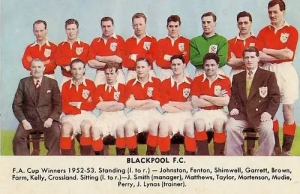 Blackpool 1950-1953: George Farm, Eddie Shimwell, Tommy Garrett, Ewan Fenton, Eric Hayward, Harry Johnston, Hugh Kelly, Cyril Robinson, Stanley Matthews, Ernie Taylor, Stan Mortensen, Jackie Mudie, Bill Perry, Bill Slater.
Blackpool 1950-1953: George Farm, Eddie Shimwell, Tommy Garrett, Ewan Fenton, Eric Hayward, Harry Johnston, Hugh Kelly, Cyril Robinson, Stanley Matthews, Ernie Taylor, Stan Mortensen, Jackie Mudie, Bill Perry, Bill Slater.
Achievements: FA Cup winners 1952-53, FA Cup finalists 1950-51. Five-year record (1950-51 to 1954-55): 3 – 9 – 7 – 6 – 19
Manager: Joe Smith
Key men: Stan Mortensen – Scored a hat-trick in the 1953 FA Cup final. Born in the North-East of England but played for Blackpool between 1941 and 1955, playing 350 games and scoring 227 goals. A strong striker who won 25 caps for England, scoring 23 times. His last cap was the infamous 6-3 defeat by Hungary in November 1953. Stanley Matthews – Legendary figure who ranks among the finest players of all time. Began with Stoke in 1932 and joined Blackpool in 1947 at the age of 32. He finally won a FA Cup winners’ medal in 1953 after going close twice with Blackpool. His England career spanned 1934 to 1957, winning 54 caps. He returned to Stoke in 1961 and finally retired in 1965 aged 50. Harry Johnston – A one-club man who captained Blackpool in the 1953 FA Cup final. A versatile defender, he was capped 10 times by England.
Perception: A team that was encouraged to play good football and became something of an attraction at away grounds. Blackpool’s golden age.
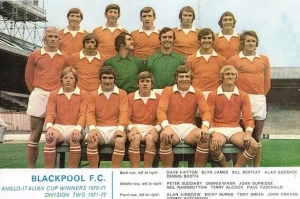 Blackpool 1971: John Burridge, Dave Hatton, Bill Bentley, Alan Ainscow, Terry Alcock, Peter Suddaby, Micky Burns, Tony Green, John Craven, Johnny Johnston, Alan Suddick, Tommy Hutchison.
Blackpool 1971: John Burridge, Dave Hatton, Bill Bentley, Alan Ainscow, Terry Alcock, Peter Suddaby, Micky Burns, Tony Green, John Craven, Johnny Johnston, Alan Suddick, Tommy Hutchison.
Achievements: Anglo-Italian Cup winners 1971
Manager: Bob Stokoe
Key men: Tommy Hutchison, midfielder or winger who won 17 caps for Scotland and was part of the 1974 World Cup squad. Went on to play for Coventry City and Manchester City. Tony Green, a talented midfielder whose career was ended by prematurely by injuries. A Scotland international, he moved to Newcastle United where he became a popular figure with fans. John Burridge, a huge character and a very competent goalkeeper. A fitness and health fanatic whose career involved more than 20 clubs.
Perception: An average side who were relegated from the first division in 1970-71 but won a summer tournament involving six English and six Italian clubs. Beat Bologna 2-1 in the final.
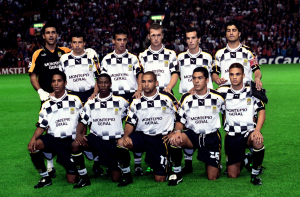 Boavista 2000-01: Ricardo, Rui Óscar, Pedro Emanuel, Litos, Erivan, Petit, Rui Bento, Erwin Sánchez, Martelinho, Duda, Whelliton, Pedro Santos, Jorge Silva, Elpídio Silva, Nuno Frechaut, Jorge Couto.
Boavista 2000-01: Ricardo, Rui Óscar, Pedro Emanuel, Litos, Erivan, Petit, Rui Bento, Erwin Sánchez, Martelinho, Duda, Whelliton, Pedro Santos, Jorge Silva, Elpídio Silva, Nuno Frechaut, Jorge Couto.
Manager/coach: Jaime Pacheco
Achievement: Primeira Liga champions 2000-01.
Key men: Petit, French-born diminutive midfielder who was named Portuguese footballer of the year in 2001. Won 57 caps for Portugal. Erwin Sánchez, Bolivian attacking midfielder who was previously with Benfica. A popular player with the Boavista fans. Duda, Brazilian forward who had a varied career that took in spells in Japan, Brazil and Malta. A fast winger with an eye for goal.
Perception: A team with a watertight defence, but also one that could score goals. Took their chance and won the title against the odds.
 Boca Juniors 1977-1978: Hugo Gatti, Carlos Rodriguez, Vincente Pernia, Francisco Sa, Roberto Mouzo, Alberto Tarantini, Carlos Veglio, Mario Zanabria, Enresto Mastrangelo, Daniel Pavon, Dario Felman, Jorge Ribalzi, Jose Tesare, Carlos Ortiz, Hector Bernabitti, Miguel Bordon, Jorge Benitez, Ruben Sune, Carlos Salinas, Hugo Perotti.
Boca Juniors 1977-1978: Hugo Gatti, Carlos Rodriguez, Vincente Pernia, Francisco Sa, Roberto Mouzo, Alberto Tarantini, Carlos Veglio, Mario Zanabria, Enresto Mastrangelo, Daniel Pavon, Dario Felman, Jorge Ribalzi, Jose Tesare, Carlos Ortiz, Hector Bernabitti, Miguel Bordon, Jorge Benitez, Ruben Sune, Carlos Salinas, Hugo Perotti.
Manager: Juan Carlos Lorenzo
Achievement: 1976 – Primera Division champions (Metropolitano and Nacional); 1977 – Copa Libertadores winners; 1978 – Copa Libertadores winners.
Key men: Ruben Sune, midfielder who played 300 games in two spells with Boca. Capped six times by Argentina. Hugo Gatti, unorthodox and outstanding. Saved penalty in Libertadores final in 1977. Roberto Mouzo, 400 plus games in defence for Boca. Alberto Tarantini, wild-haired defender who had an aborted spell in England.
Perception: Underpinned by steely defence, experience and the speed of forwards like Mastrangelo and Felman. This Boca side was widely considered to be the best since the club’s first golden age of the 1960s.
 Bologna 1963-64: William Negri, Carlo Furlanis, Mirko Pavinato, Paride Tumburus, Francesco Janich, Romano Fogli, Marino Perani, Giancomo Bulgarelli, Harald Nielsen, Helmut Haller, Ezio Pascutti, Antonio Renna
Bologna 1963-64: William Negri, Carlo Furlanis, Mirko Pavinato, Paride Tumburus, Francesco Janich, Romano Fogli, Marino Perani, Giancomo Bulgarelli, Harald Nielsen, Helmut Haller, Ezio Pascutti, Antonio Renna
Manager: Fulvio Bernardini
Achievement: 1963-64 – Serie A champions Five year record: 4, 4, 1, 6, 2
Key men: Harald Nielsen, free-scoring Danish forward; Helmut Haller, West Germany inside forward. Fast and tricky. William Negri, kept 18 clean sheets in 34 games in Serie A.
Perception: Unfancied Bologna stunned Italian and European champions Inter by lifting the title.
Bolton Wanderers 1923-1929: Dick Pym, Bob Haworth, Harry Greenhalgh, Fred Kean, Alex Finney, Harry Nuttall, Jimmy Seddon, Billy Jennings, Billy Butler, Jim McClelland, Harold Blackmore, George Gibson, David Jack, Jack Smith, Joe Smith, Ted Vizard, Willie Cook.
Manager: Charles Foweraker
Achievement: FA Cup winners 1923, 1926 and 1929. Five-year league record (starting in 1922-23): 13, 4, 3, 8, 4
Key men: Dick Pym, dependable and consistent goalkeeper. David Jack, one of the most sought-after forwards of his generation. Ted Vizard, Welsh left winger who gave Bolton 18 years.
Perception: FA Cup specialists who were not quite consistent enough for league success.
 Bordeaux 1983-1987: Christian Delachet, Dominique Dropsy, Raymond Domenech,Leonard Specht, Jean-Ch. Thouvenel, Zoran Vujovic, Alain Roche, Gernot Rohr, Jean Tigana, Rene Girard, Dieter Mueller, Bernard Lacombe, Jose Toure, Philippe Vercruysse, Patrick Battiston, Alain Giresse, Antoine Martinez, Bernard Zenier, Thierry Tusseau, Michel Audrain, Fernando Chalana, Uwe Reinders, Marc Pascal, Zlatko Vujovic, Philippe Fargeon.
Bordeaux 1983-1987: Christian Delachet, Dominique Dropsy, Raymond Domenech,Leonard Specht, Jean-Ch. Thouvenel, Zoran Vujovic, Alain Roche, Gernot Rohr, Jean Tigana, Rene Girard, Dieter Mueller, Bernard Lacombe, Jose Toure, Philippe Vercruysse, Patrick Battiston, Alain Giresse, Antoine Martinez, Bernard Zenier, Thierry Tusseau, Michel Audrain, Fernando Chalana, Uwe Reinders, Marc Pascal, Zlatko Vujovic, Philippe Fargeon.
Manager: Aimé Jacquet
Achievement: 1983-84 – Ligue 1 champions; 1984-85 – Ligue 1 champions; 1985-86 – Coupe de France winners; 1986-87 – Ligue 1 champions, Coupe de France winners.
Five-year league record: 1, 1, 3, 1, 2
Key men: Alain Giresse, intelligent playmaker in midfield. Bernard Lacombe, goal-hungry striker. Jean Tigana, outstanding box-to-box midfielder.
Perception: A team built with significant amounts of money, luring a cluster of French internationals to the club.
 Borussia Dortmund 1964-1966: Hans Tilkowski, Gerhard Cyliax, Theodor Redde, Dieter Kurrat, Wolfgang Paul, Hermann Staschitz, Wilhelm Sturm, Alfred Schmidt, Reihard Wosab, Friedhelm Konietzka, Lothar Emmerich, Rudi Assauer, Reinhard Libuda, Siegfried Held.
Borussia Dortmund 1964-1966: Hans Tilkowski, Gerhard Cyliax, Theodor Redde, Dieter Kurrat, Wolfgang Paul, Hermann Staschitz, Wilhelm Sturm, Alfred Schmidt, Reihard Wosab, Friedhelm Konietzka, Lothar Emmerich, Rudi Assauer, Reinhard Libuda, Siegfried Held.
Manager: Hermann Eppenkhoff/ Willi Multhaup
Achievement: 1963 German champions and Cup finalists; 1964-65 German Cup winners; 1965-66 European Cup-Winners Cup winners, Bundesliga runners-up. Five-year league record: 4, 3, 2, 3, 14
Key men: Hans Tilkowski, goalkeeper who played between 1963 and 1967, 39 caps for West Germany; Siegfried Held, exciting midfielder/forward signed from Kickers Offenbach. Scored in the ECWC final; Lothar Emmerich, free scoring winger who netted 115 goals in 183 Bundesliga games. Also scored in ECWC final.
Perception: Arguably the best German side before Bayern’s 1970s team.
 Borussia Dortmund 1997: Stefan Klos, Matthias Sammer, Jürgen Kohler, Martin Kree, Julio Cesar, Stefan Reuter, Jörg Heinrich, Bodo Schmidt, Michael Zorc, Steffen Freund, Patrik Berger, Lars Ricken, Andreas Möller, Knut Reinhardt, Thomas Franck, Paul Lambert, Karl-Heinz Riedle, Ruben Sosa, Paulo Sousa, Stephane Chapuisat.
Borussia Dortmund 1997: Stefan Klos, Matthias Sammer, Jürgen Kohler, Martin Kree, Julio Cesar, Stefan Reuter, Jörg Heinrich, Bodo Schmidt, Michael Zorc, Steffen Freund, Patrik Berger, Lars Ricken, Andreas Möller, Knut Reinhardt, Thomas Franck, Paul Lambert, Karl-Heinz Riedle, Ruben Sosa, Paulo Sousa, Stephane Chapuisat.
Manager: Ottmar Hitzfeld
Achievement: 1994-95 Bundesliga champions; 1995-96 Bundesliga champions; 1996-97 UEFA Champions League winners.
Five-year league record: 1, 1, 3, 10, 8
Key men: Matthias Sammer, captain born in East Germany, capped by both DDR and unified Germany; Andreas Möller, attacking midfielder who won 85 caps for Germany; Stephane Chapuisat, Swiss striker named as his country’s best player of all time.
Perception: Surprise UCL winners in 1997, beating Juventus. A powerful unit.
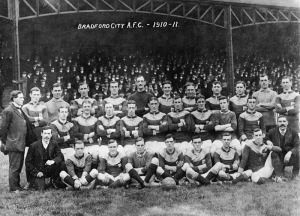 Bradford City 1910-11: Mark Mellors, Robert Campbell, David Taylor, George Robinson, Willie Gildea, Jimmy McDonald, Peter Logan, Jimmy Speirs, Frank O’Rourke, Archie Devine, Frank Thompson, Bob Torrance.
Bradford City 1910-11: Mark Mellors, Robert Campbell, David Taylor, George Robinson, Willie Gildea, Jimmy McDonald, Peter Logan, Jimmy Speirs, Frank O’Rourke, Archie Devine, Frank Thompson, Bob Torrance.
Manager: Peter O’Rourke
Key men: Jimmy Speirs, Scottish forward sadly killed at Ypres 1917. Scored winning goal in 1911 cup final. Archie Devine, Scottish midfielder who also played for Arsenal.
Achievement: FA Cup winners 1910-11. Five year league record: 18, 7, 5, 11, 13
Perception: Bradford’s best ever season was assisted by Newcastle, their FA Cup final opponents, being without key players.
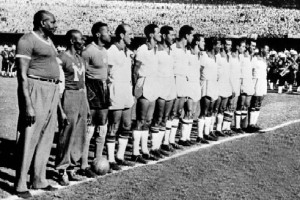 Brazil 1950: Moacir Barbosa, Augusto, Juvenal, Jose Carlos Bauer, Danilo, Bigode, Friaca, Zizinho, Ademir, Jair, Chico
Brazil 1950: Moacir Barbosa, Augusto, Juvenal, Jose Carlos Bauer, Danilo, Bigode, Friaca, Zizinho, Ademir, Jair, Chico
Manager: Flavio Costa
Achievement: 1949 – Copa America winners; 1950 – World Cup runners-up.
Key men: Ademir, golden boot winner in 1950 World Cup, fast and powerful. Zizinho, described by Pele as the “most complete player I ever saw.” Midfield or forward. Bauer, one of the finest midfielders of his time.
Perception: Lost to Uruguay in 1950 final but everyone’s favourites to win the World Cup that year.
 Brazil 1958 to 1962: Gilmar, Djalma Santos, Orlando Peranha, Bellin, Nilton Santos, Zito, Didi, Garrincha, Mario Zagallo, Vava, Pele, Mauro Ramos, Zozimo, Amarildo.
Brazil 1958 to 1962: Gilmar, Djalma Santos, Orlando Peranha, Bellin, Nilton Santos, Zito, Didi, Garrincha, Mario Zagallo, Vava, Pele, Mauro Ramos, Zozimo, Amarildo.
Manager: Vicente Feola/Aymore Moreira
Achievement: 1958 – World Cup winners; 1962 – World Cup winners.
Key men: Garrincha, the “little bird” at his best on the flank. Gilmar, rated Brazil’s best ever goalkeeper. Vava, striker rated one of the best of his time. Didi, midfielder who was a dead-ball specialist, possibly the first ever. Djalma Santos, one of the greatest full backs of all time. Pele, young talent who burst onto the scene in 1958.
Perception: Packed with ball-playing skill and trickery, this was the first Brazil side to capture the imagination of the rest of the world.
 Brazil 1970: Felix, Carlos Alberto, Brito, Piazza, Everaldo, Clodoaldo, Gerson, Jairzinho, Tostao, Pele, Rivelino, Marco Antonio, Roberto, Paulo Cesar.
Brazil 1970: Felix, Carlos Alberto, Brito, Piazza, Everaldo, Clodoaldo, Gerson, Jairzinho, Tostao, Pele, Rivelino, Marco Antonio, Roberto, Paulo Cesar.
Manager: Mario Zagallo Achievement: 1970 – World Cup winners.
Key men: Carlos Alberto, skipper and overlapping full back. Pele, the great, charimastic talisman of the team. Gerson, chain-smoking midfield genius. Jairzinho, goalscoring front man, strong and agile – nicknamed “the hurricane”.
Perception: Steeped in the tradition of Brazilian teams from the 1950s and 1960s, this team, with Pele at his peak, is arguably the all-time great international XI.
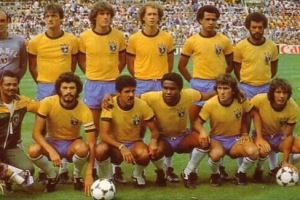 Brazil 1982: Waldir Peres, Leandro, Oscar, Luizinho, Junior, Toninho Cerezo, Falcao, Socrates, Zico, Serginho, Eder, Edevaldo, Paulo Isidoro, Edinho.
Brazil 1982: Waldir Peres, Leandro, Oscar, Luizinho, Junior, Toninho Cerezo, Falcao, Socrates, Zico, Serginho, Eder, Edevaldo, Paulo Isidoro, Edinho.
Manager: Tele Santana
Achievement: 1982 – World Cup second stage; 1983 – Copa America runners-up.
Key men: Socrates, technical playmaker with great vision and passing ability. Zico, heralded as a successor to Pele, he was a flair player who could score great goals. Falcao, a deep-lying playmaker with a powerful shot.
Perception: The “people’s champions” in 1982 World Cup, beaten by Italy in the second stage. Flowing football, sublime free-kicks, but weaknesses in defence and up front.
 Breslau Elf (Germany 1937): Hans Jakob, Paul Janes, Reinhold Münzenberg, Andreas Kupfer, Ludwig Goldbrunner, Albin Kitzinger, Ernst Lehner, Rudolf Gellesch, Otto Stiffling, Fritz Szepan, Adolf Urban.
Breslau Elf (Germany 1937): Hans Jakob, Paul Janes, Reinhold Münzenberg, Andreas Kupfer, Ludwig Goldbrunner, Albin Kitzinger, Ernst Lehner, Rudolf Gellesch, Otto Stiffling, Fritz Szepan, Adolf Urban.
Manager: Sepp Herberger Achievement: One defeat in 11 games. 8-1 victory against Denmark in May 1937 in Breslau.
Key men: Otto Stiffling, a clever forward who scored four times in that game with Denmark. Fritz Szepan, Schalke forward who lacked pace but had the uncanny ability to make the ball do the work for him. Prolific in front of goal.
Perception: A team that was never allowed to fulfill its potential.
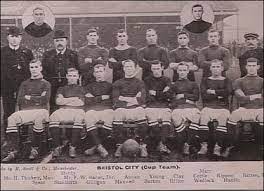 Bristol City 1908-09: Harry Clay, Archie Annan, Joe Cottle, Pat Hanlin, Bill Wedlock, Arthur Spear, Fred Staniforth, Bob Hardy, Sam Gilligan, Andy Burton, Frank Hilton.
Bristol City 1908-09: Harry Clay, Archie Annan, Joe Cottle, Pat Hanlin, Bill Wedlock, Arthur Spear, Fred Staniforth, Bob Hardy, Sam Gilligan, Andy Burton, Frank Hilton.
Manager: Harry Thickett
Achievement: FA Cup finalists 1908-09
Key men: Billy Wedlock, centre half who played 26 times for England. A stout, short defender, who was known as “Fatty” and “India Rubber Man”. Played over 400 games for City, who named a stand after him. Joe Cottle, dependable left back who played over 200 games for Bristol City. A local lad, he won one England cap in 1909.
Perception: A mid-table team that overperformed to reach the FA Cup final. Played nine games on the way to the final, needing a replay in four of five rounds.
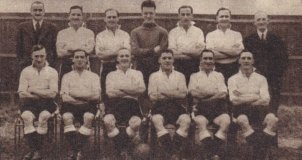 Bromley 1948-49: Tommy Cornthwaite, Doug Cameron, Ken Yenson, Tom Fuller, Charlie Fuller, Eric Fright, Cyril Martin, Tommy Hopper, George Brown, Reg Dunmall, Martin Ruddy.
Bromley 1948-49: Tommy Cornthwaite, Doug Cameron, Ken Yenson, Tom Fuller, Charlie Fuller, Eric Fright, Cyril Martin, Tommy Hopper, George Brown, Reg Dunmall, Martin Ruddy.
Manager: C.F. King
Achievements: FA Amateur Cup winners 1948-49, Athenian League champions 1948-49.
Key men: Ken Yenson was an England international defender, considered to be among the best in amateur football at the time. He also played for Notts County and Grays and enjoyed Amateur Cup success with Leyton in the 1950s. Charlie Fullerwas also an England international and also played for Dagenham, his home town club. Eric Fright, a half-back, started his career with Margate but captained Bromley in the 1949 Amateur Cup final. He was a member of the Great Britain Olympic squad in 1948. George Brown was a tough and daunting centre forward who played for the club from 1938 to 1961, scoring 570 goals in the process. In 1948-49, he netted 129 times.
Perception: One of the top amateur teams of the early post-war period. Played football with a swagger.
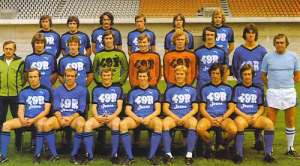 Club Brugge 1975-76 to 1977-78: Birger Jensen, Hugo Pieters, Fons Bastijns, Eddie Krieger, George Keekens, Jos Volders, Julien Cools, René Vandereycken, Danny De Cubber, Roger Van Gool, Raoul Lambert, Ulrik Le Fevre, Dirk Hinderyckx, Dirk Sanders, Gino Maes, Jan Simeon, Jan Sørensen, Lajos Kū.
Club Brugge 1975-76 to 1977-78: Birger Jensen, Hugo Pieters, Fons Bastijns, Eddie Krieger, George Keekens, Jos Volders, Julien Cools, René Vandereycken, Danny De Cubber, Roger Van Gool, Raoul Lambert, Ulrik Le Fevre, Dirk Hinderyckx, Dirk Sanders, Gino Maes, Jan Simeon, Jan Sørensen, Lajos Kū.
Manager: Ernst Happel (Austria)
Achievements: Belgian league champions 1975-76, 1976-77, 1977-78; Belgian Cup winners 1976-77; UEFA Cup finalists 1975-76; European Cup finalists 1977-78.
Five-year league record (1974-75 to 1978-79): 4 – 1 – 1 – 1 – 6
Key men: Raoul Lambert, one of Belgium’s greatest forwards and a Bruges clubman. Won 33 caps for Belgium and played in the 1970 World Cup. Strong and determined player who won five league titles with the club. Roger Van Gool, much travelled striker who became the first one million Deutsche mark signing in German football when he left Bruges for Köln. René Vandereycken, midfielder who won 50 caps for Belgium. Also played in Italy and Germany and went on to enjoy a successful managerial career.
Perception: Functional, workmanlike team. Marvellously consistent and denied European success both times by Liverpool.
 Burnley 1920-21: Jerry Dawson, Cliff Jones, Len Smelt, Billy Watson, David Taylor, George Halley, Tommy Boyle, Alf Basnett, Eddie Mosscrop, Billy Nesbitt, Walter Weaver, Joe Anderson, Benny Cross, Bob Kelly.
Burnley 1920-21: Jerry Dawson, Cliff Jones, Len Smelt, Billy Watson, David Taylor, George Halley, Tommy Boyle, Alf Basnett, Eddie Mosscrop, Billy Nesbitt, Walter Weaver, Joe Anderson, Benny Cross, Bob Kelly.
Manager: John Haworth
Achievement: 1920-21: Football League Champions. Five year league record (starting in 1919-20): 2, 1, 3, 15, 17
Key men: Joe Anderson, Scottish centre forward who netted 25 goals in the league campaign. Tommy Boyle, underrated half back who captained Burnley to FA Cup glory in 1914. Bob Kelly, another free-scoring forward who went on the break the record transfer record when he moved to Sunderland in 1925.
Perception: Fine footballing side that set a 30-game unbeaten record that stood until 2003-04.
 Burnley 1959-60: Adam Blacklaw, John Angus, Alex Elder, Jimmy Adamson, Tony Cummings, Brian Miller, Trevor Meredith, Jimmy McIlroy, Ray Pointer,Jimmy Robson, Brian Pilkington, John Connelly
Burnley 1959-60: Adam Blacklaw, John Angus, Alex Elder, Jimmy Adamson, Tony Cummings, Brian Miller, Trevor Meredith, Jimmy McIlroy, Ray Pointer,Jimmy Robson, Brian Pilkington, John Connelly
Manager: Harry Potts
Achievement: 1959-60 – Football League champions. Five year league record: 6, 7, 1, 4, 2
Key men: Ray Pointer, prolific goalscorer who was capped by England three times. Jimmy McIlroy, superb passer of the ball in midfield. One of Burnley’s all-time greats. John Connelly, tricky winger who was capped 20 times by England. Played in the 1966 World Cup.
Perception: Cultured footballing team that surprised a few people in the post-Munich years. Eclipsed only by Tottenham’s 1960-61 double side.
C
 Cagliari 1969-70: Enrico Albertosi, Mario Martiradonna, Giulio Zignoli, Pierluigi Cera, Comunardo Niccolai, Giuseppe Tomasini, Angelo Domenghini, Nené, Sergio Gori, Ricciotti Greatti, Luigi Riva.
Cagliari 1969-70: Enrico Albertosi, Mario Martiradonna, Giulio Zignoli, Pierluigi Cera, Comunardo Niccolai, Giuseppe Tomasini, Angelo Domenghini, Nené, Sergio Gori, Ricciotti Greatti, Luigi Riva.
Manager: Manlio Scopigno
Achievement: Italian Serie A champions 1969-70. Runners-up 1968-69. Five year league record: 9, 2, 1, 7, 4
Key men: Luigi Riva, powerful, legendary striker for Cagliari and Italy. Scored 21 goals in 1969-70; Enrico Albertosi, consistent goalkeeper for club and country; Angelo Domenghini, fast and agile striker with great technical ability.
Perception: A team that broke the northern stranglehold on Serie A and became a local legend on Sardinia.
 Cardiff City 1924-1927: Tom Farquharson, James Nelson, Tom Watson, Fred Keenor, Tommy Sloan, Billy Hardy, Ernie Curtis, Sam Irving, Hughie Ferguson, Len Davies, George McLachlan.
Cardiff City 1924-1927: Tom Farquharson, James Nelson, Tom Watson, Fred Keenor, Tommy Sloan, Billy Hardy, Ernie Curtis, Sam Irving, Hughie Ferguson, Len Davies, George McLachlan.
Achievement: FA Cup winners 1926-27, Football League Runners-up 1923-24, FA Cup finalists 1924-25. Five year record: 2, 11, 16, 14, 6
Manager: Fred Stewart
Key men: Fred Keenor, a hard-tackling character a fiercely loyal to Cardiff City. A Welsh international; Len Davies, free-scoring forward from Splott; Hughie Ferguson, scored the winning goal in the 1927 FA Cup final against Arsenal.
Perception: The golden age of Cardiff City, taking the FA Cup out of England for the only time.
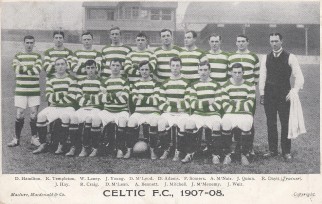 Celtic 1904-1910: David Adams, Don McLeod, William Strang, James Weir, Hugh Watson, Joseph Dodds, Daniel Munro, William Orr, Jim Young, James Hay, Alec McNair, John Graham, James McMenemy, William Loney, Alex Bennett, Edward Garry, Jimmy Quinn, Peter Somers, David Hamilton, Peter Johnstone, William Kivlichen.
Celtic 1904-1910: David Adams, Don McLeod, William Strang, James Weir, Hugh Watson, Joseph Dodds, Daniel Munro, William Orr, Jim Young, James Hay, Alec McNair, John Graham, James McMenemy, William Loney, Alex Bennett, Edward Garry, Jimmy Quinn, Peter Somers, David Hamilton, Peter Johnstone, William Kivlichen.
Achievement: 1904-05 – Scottish League champions; 1905-06 Scottish League champions; 1906-07 – Scottish League champions and Scottish Cup winners; 1907-08 – Scottish League champions and Scottish Cup winners; 1908-09 – Scottish League champions; 1909-10 – Scottish League champions.
Manager: Willie Maley
Key men: Jimmy Quinn, free-scoring forward who switched from the wing to centre and scored 216 goals in 331 appearances for the club; Alex McNair, intelligent and composed right back who spent 21 years with Celtic; Jim Young, right half nicknamed “Sunny”; Jimmy McMenemy, nicknamed “Napoleon”, a long-serving forward who scored 144 goals in 456 games.
Perception: The dominant force in Scotland at the time, thanks to the consistent backbone of the team.
Celtic 1965-1970
 Ronnie Simpson, John Fallon, Evan Williams; Jim Craig, Tommy Gemmell, David Hay, Jim Brogan, Billy McNeill, John Clark; Bobby Murdoch, Bertie Auld, Willie Wallace, Jimmy Johnstone, Joe McBride; Steve Chalmers, Bobby Lennox, John Hughes, George Connelly.
Ronnie Simpson, John Fallon, Evan Williams; Jim Craig, Tommy Gemmell, David Hay, Jim Brogan, Billy McNeill, John Clark; Bobby Murdoch, Bertie Auld, Willie Wallace, Jimmy Johnstone, Joe McBride; Steve Chalmers, Bobby Lennox, John Hughes, George Connelly.
Manager: Jock Stein
Achievement: Scottish League Champions 1965-66, 1966-67, 1967-68, 1968-69, 1969-70; Scottish Cup Winners 1966-67, 1968-69; Scottish League Cup Winners 1965-66, 1966-67, 1967-68, 1968-69, 1969-70; European Cup Winners 1966-67. Five year record: 1, 1, 1, 1, 1.
Key men:Billy McNeill, commanding centre half and captain; Tommy Gemmell, attacking full back, good eye for goal; Jimmy Johnstone, tricky winger, known as “jinky”; Bertie Auld, midfielder or wide man, a big character.
Perception: Brilliant, attacking football, one of Britain’s best-ever teams.
 Chelsea 1970-1972
Chelsea 1970-1972
Peter Bonetti, Ron Harris, Eddie McCreadie, John Boyle, John Dempsey, David Webb, Marvin Hinton, John Hollins, Alan Hudson, Charlie Cooke, Steve Kember, Peter Houseman, Tommy Baldwin, Chris Garland, Peter Osgood, Ian Hutchinson, Keith Weller.
Achievement: FA Cup winners 1970; European Cup-Winners’ Cup 1971; Football League Cup runners-up 1972. Five year record (68-72): 6 – 5 – 3 – 6 – 7
Manager: Dave Sexton
Key men: Peter Osgood, supremely skilful forward and a club legend; Charlie Cooke, outstanding dribbler; John Hollins, hard-working and reliable midfielder with an eye for goal; Alan Hudson, teenage prodigy in midfield.
Perception: Lacked the professionalism and drive to challenge for league honours, but a great cup side.
Charlie Thomson, Bill Robertson, Stan Willemse, Peter Sillett, Stan Wicks, Derek Saunders, Ron Greenwood, John Harris, Ken Armstrong, Seamus O’Connell, Johnny McNichol, Roy Bentley, Les Stubbs, Frank Blunstone, Jim Lewis, Eric Parsons.
Achievements: Football League champions 1954-55.
Manager: Ted Drake
Key men: Roy Bentley, England centre forward who netted 21 goals in the title-winning campaign; Eric Parsons, flying winger who had an outstanding season, known as “Rabbit”; Ken Armstrong, dependable right half; Peter Sillett, young full back.
Perception: A team for a season that failed to build on its success.
Chelsea 2004-2006
Peter Cech, Paulo Ferreira, Wayne Bridge, Asier Del Horno, Glen Johnson, John Terry, Ricardo Carvalho, William Gallas, Claude Makelele, Frank Lampard, Tiago, Michael Essien, Arjen Robben, Damien Duff, Joe Cole, Shaun Wright-Phillips, Mateja Kezman, Didier Drogba, Eidar Gudjohnsen, Hernan Crespo.
Achievements: Premier League Champions 2004-05, 2005-06; Football League Cup winners 2004-05. Five-record (2003-2008): 2 – 1 – 1 – 2 – 2
Manager: Jose Mourinho
Key men: Frank Lampard, goalscoring midfielder signed from West Ham, very consistent, scored 211 goals for Chelsea in 648 appearances. Capped 106 times by England, scoring 29 goals. An inspirational player who later managed the club. John Terry, old-style English central defender, incredibly popular with the club’s fans. Commanding in the air, he also had remarkable speed and strong tackling skills. Played 717 games for Chelsea, scoring 67 goals. Capped 78 times by England. Arjen Robben, Dutch winger who was one of the most gifted players of his era. Signed from PSV Eindhoven for £ 12 million in 2004, he played 106 games before moving to Real Madrid. He later played for Bayern Munich. Capped 96 times by the Netherlands, he had pace, a fierce shot and excellent dribbling ability.
Perception: Wonderfully consistent, ruthless and focused.
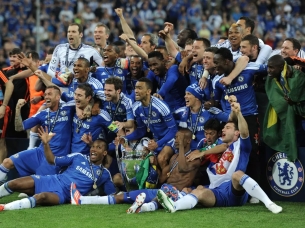 Chelsea 2009-2012: Petr Cech, Branislav Ivanović, Ashley Cole, Michael Essien, Ricardo Carvalho, John Terry, David Luiz, José Bosingwa, Alex, Paulo Ferreira, Gary Cahill, Ryan Bertrand, Frank Lampard, Joe Cole, Mike John Obi, Michael Ballack, Deco, Juan Mata, Florent Malouda, Salomon Kalou, Nicolas Anelka, Didier Drogba, Fernando Torres.
Chelsea 2009-2012: Petr Cech, Branislav Ivanović, Ashley Cole, Michael Essien, Ricardo Carvalho, John Terry, David Luiz, José Bosingwa, Alex, Paulo Ferreira, Gary Cahill, Ryan Bertrand, Frank Lampard, Joe Cole, Mike John Obi, Michael Ballack, Deco, Juan Mata, Florent Malouda, Salomon Kalou, Nicolas Anelka, Didier Drogba, Fernando Torres.
Manager: Carlo Ancelotti, André Villas-Boas, Roberto di Matteo
Achievements: Premier League champions 2009-10; FA Cup winners 2009-10, 2011-12; UEFA Champions League winners 2011-12.
Key men: Petr Cech, joined Chelsea in 2004 from Rennes for a £3.9 million fee and went on to play almost 500 games for the club. He won 124 caps for the Czech Republic. One of the greatest goalkeepers of the Premier League era, brave, agile and possessing excellent reflexes. Didier Drogba, Ivorian forward who scored Chelsea’s winning penalty in the 2012 Champions League final shoot-out. A powerful, fast centre forward who joined the club from Olympique Marseille in 2004. A legend in his own country, Drogba played 105 times for the Ivory Coast. Michael Essien, Ghanaian midfielder, nicknamed “the Bison”, who was powerful, competitive and capable of playing in defence and the middle of the park. Joined from Lyon in 2005 for £ 24 million.
Perception: The second phase of the Abramovich era at Chelsea, a team that had power in abundance but lacked the surprise factor of the 2004 side.
Chile 1962
 Misael Escuti, Adan Goday, Raul Sanchez, Carlos Contreras, Eladio Rojas, Jamie Ramirez, Jorge Toro, Honorino Landa, Leonel Sanchez, Manuael Rodriguez, Armando Tobar, Carlos Campos, Sergio Navarro.
Misael Escuti, Adan Goday, Raul Sanchez, Carlos Contreras, Eladio Rojas, Jamie Ramirez, Jorge Toro, Honorino Landa, Leonel Sanchez, Manuael Rodriguez, Armando Tobar, Carlos Campos, Sergio Navarro.
Achievement: Third place, World Cup 1962 (as hosts)
Manager: Fernando Riera
Key men: Leonel Sanchez, joint top scorer in the 1962 World Cup. Fractious left-sided forward with an eye for goal; Jorge Toro, attacking midfielder and dangerous in front of goal; Jaime Ramirez, a winger with great technique, fast. Nicknamed “Superclase”.
Perception: Tenacious side who made the most of their host status in 1962.
Chile 2015-2016
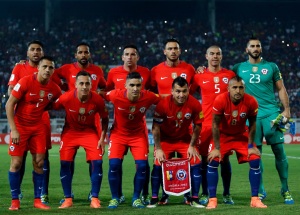 Claudio Bravo, Gary Medel, Francisco Silva, Marcelo Diaz, Mauricio Isla, Charles Aranguiz, Arturo Vidal, Jean Beausejour, Jorge Valdivia, Eduardo Vargas, Alexis Sánchez, Matias Fernandez, Angelo Henriquez, Gonzalo Jara, José Pedro Fuenzalida, Edson Puch, Nicolas Castillo.
Claudio Bravo, Gary Medel, Francisco Silva, Marcelo Diaz, Mauricio Isla, Charles Aranguiz, Arturo Vidal, Jean Beausejour, Jorge Valdivia, Eduardo Vargas, Alexis Sánchez, Matias Fernandez, Angelo Henriquez, Gonzalo Jara, José Pedro Fuenzalida, Edson Puch, Nicolas Castillo.
Achievements: Copa America winners 2015 and 2016.
Manager: Jorge Sampaoli (2015), Juan Antonio Pizzi (2016)
Key men: Eduardo Vargas, quick and dynamic forward, capable of creativity and goals; Arturo Vidal, hard-working versatile midfielder; Alexis Sanchez, winger or forward, quick and busy.
Perception: Despite some outstanding players, lacked breadth of quality, hence failed to qualify for 2018 World Cup.
Clyde 1958
 Tommy McCulloch, Albert Murray, Harry Haddock, Joe Walters, Willie Finlay, Mike Clinton, George Herd, Dan Currie, John Coyle, Archie Robertson, Tommy Ring.
Tommy McCulloch, Albert Murray, Harry Haddock, Joe Walters, Willie Finlay, Mike Clinton, George Herd, Dan Currie, John Coyle, Archie Robertson, Tommy Ring.
Manager: Johnny Haddow
Achievement: Scottish Cup winners 1957-58.
Key men:Harry Haddock, played 500-plus games at left back for Clyde and included in Scotland World Cup squad; Tommy Ring, outside left who scored winner in the 1955 cup final; John Coyle, a member of the 1958 Scotland squad for the World Cup. Scored frequently in second half of 1957-58 season.
Perception: Hard-working team that also finished fourth in the Scottish League and semi-final of the Scottish League Cup.
 Colchester United 1970-72: Graham Smith, Brian Hall, Bobby Cram, John Gilchrist, John Kurila, Brian Lewis, Dave Simmons, Mick Mahon, Ray Crawford, Brian Gibbs, Micky Cook, Ken Jones.
Colchester United 1970-72: Graham Smith, Brian Hall, Bobby Cram, John Gilchrist, John Kurila, Brian Lewis, Dave Simmons, Mick Mahon, Ray Crawford, Brian Gibbs, Micky Cook, Ken Jones.
Achievement:FA Cup giant-killers 1970-71; Watney Cup winners 1971
Manager: Dick Graham
Key men:Ray Crawford, veteran former England striker plucked from non-league at the age of 34. Scored over 30 goals in 1970-71, including two against Leeds.
Perception:Pulled off one of the great FA Cup giant-killings in beating the mighty Leeds United. Beat West Brom in the short-lived Watney Cup in the next pre-season.
Croatia 2018
 Danijel Subašić, Šime Vrsaliko, Dejan Lovren, Domagoj Vida, Ivan Strinić, Marcelo Brizović, Ante Rebić, Luka Modrić, Ivan Perišić, Ivan Rakitić, Mario Mandžukić, Andrej Kramarić, Marko Pjaca, Vedran Ćorluka, Milan Badelj, Josip Pivarić.
Danijel Subašić, Šime Vrsaliko, Dejan Lovren, Domagoj Vida, Ivan Strinić, Marcelo Brizović, Ante Rebić, Luka Modrić, Ivan Perišić, Ivan Rakitić, Mario Mandžukić, Andrej Kramarić, Marko Pjaca, Vedran Ćorluka, Milan Badelj, Josip Pivarić.
Manager: Zlatko Dalić
Achievement: World Cup finalists 2018
Key men: Luka Modrić, hard-working and clever midfielder; Ivan Rakitić, a quick-passing midfielder with Barcelona, often under-rated; Ivan Perišić, covered more ground than any other player in the World Cup 2018.
Perception: Performed against the odds, beating hosts, Russia, and Argentina on the way to the final. An intelligent side, making the most of their strengths.
 Crystal Palace 1980
Crystal Palace 1980
John Burridge, Billy Gilbert, Peter Nicholas, Jim Cannon, Jerry Murphy, Kenny Sansom, Dave Swindlehurst, Vince Hilarie, Barry Silkman, Mike Elwiss, Tony Sealy, Ian Walsh, Steve Lovell, Nicky Chatterton.
Manager: Terry Venables
Achievement: Second Division champions 1978-79. Five year record: 3+,9+,1+, 13, 22.
+Football League Division Two.
Key men: Kenny Sansom, talented full back who went on to win 86 caps for England as an Arsenal player; Vince Hilaire, skilful midfielder.
Perception: Built on Palace’s FA Youth Cup-winning team of 1977 and 1978, an example of how hype can lead people getting carried away with expectation. Dubbed “team of the 80s”, the side never fulfilled its potential.
 Czechoslavakia 1960-62: Viliam Schrojf, Jirí Tichy, Ján Popluhár, Svatopluk Pluskal, Ladislav Novák, Tomáš Pospichal, Titus Bubernik, František Šafránek, Andrej Kvašnák, Josef Masopust, Pavol Molnár, Josef Jelínek, Adolf Scherer, Vlatimil Bubnik, Milan Dolinsky, Josef Kadraba.
Czechoslavakia 1960-62: Viliam Schrojf, Jirí Tichy, Ján Popluhár, Svatopluk Pluskal, Ladislav Novák, Tomáš Pospichal, Titus Bubernik, František Šafránek, Andrej Kvašnák, Josef Masopust, Pavol Molnár, Josef Jelínek, Adolf Scherer, Vlatimil Bubnik, Milan Dolinsky, Josef Kadraba.
Achievement:European Championship 1960 third place, World Cup runners-up 1962.
Manager: Rudolf Vytlačil
Key men:Ladislav Novak, captain and defender, reliable and strong. 75 caps; Josef Masopust, supremely skilful and European Footballer of the Year in 1962.
Perception:Very talented, highly-skilled team.
 Czechoslavakia 1976: Ivo Viktor, Anton Ondruš, Ján Pivarnik, Koloman Gögh, Jozef Čapkovič, Karol Dobiaš, Jozef Móder, Antonin Panenka, Marian Masny, Zdenêk Nehoda, Ján Švehlík, Ladislav Jurkemik, František Vesely.
Czechoslavakia 1976: Ivo Viktor, Anton Ondruš, Ján Pivarnik, Koloman Gögh, Jozef Čapkovič, Karol Dobiaš, Jozef Móder, Antonin Panenka, Marian Masny, Zdenêk Nehoda, Ján Švehlík, Ladislav Jurkemik, František Vesely.
Achievement: European Championship winners 1976
Manager: Václav Ježek
Key men: Zdenêk Nehoda, striker/winger who netted a goal every three games. Played for Dukla and then went to play in Belgium, France and Germany later in his career; Marián Masny, skilful winger, rated among the world’s best, from Slovan Bratislava; Antonin Panenka, attacking midfielder, famous for his jinked penalty that won the Euros.
Perception: Surprise winners of the Euros, but skilful in attack. Inconsistent.
D
Denmark 1984-1986
 Troels Rasmussen, Ole Qvist, John Sivebaek, Morten Olsen, Søren Busk, Ivan Nielsen, Henrik Andersen, Frank Arnesen, Jens Bertelsen, Klaus Berggreen, Søren Lerby, Michael Laudrup, Preben Elkjaer, Jesper Olsen, Jan Mølby, John Eriksen, Allan Simonson
Troels Rasmussen, Ole Qvist, John Sivebaek, Morten Olsen, Søren Busk, Ivan Nielsen, Henrik Andersen, Frank Arnesen, Jens Bertelsen, Klaus Berggreen, Søren Lerby, Michael Laudrup, Preben Elkjaer, Jesper Olsen, Jan Mølby, John Eriksen, Allan Simonson
Achievement: Euro 1984 Semi-final; World Cup round of 16 1986
Manager: Sepp Piontek
Key men: Michael Laudrup, wonderfully skilful forward, tricky and clever; Frank Arnesen, polished midfielder; Morten Olsen, calm in defence.
Perception: Free-flowing, skilful football team that should have achieved more. An 1980s version of Total Football. Defining moment, 6-1 against Uruguay in Mexico 1986.
Deportivo La Coruna 1999-00
 Jacques Songo’o, Emrique Romero, Noureddine Naybet, Gabriel Schuerrer, Victor Sanchez, Mauro Silva, Donato, Manuel Pablo, Djalminha, Flavio Conceicao, Slaviska Conceicao, Slaviska Jokanovik, Fran, Jaime, Fernando, Lionel Scaloni, Roy Makaay, Turu Flores, Pauleta.
Jacques Songo’o, Emrique Romero, Noureddine Naybet, Gabriel Schuerrer, Victor Sanchez, Mauro Silva, Donato, Manuel Pablo, Djalminha, Flavio Conceicao, Slaviska Conceicao, Slaviska Jokanovik, Fran, Jaime, Fernando, Lionel Scaloni, Roy Makaay, Turu Flores, Pauleta.
Achievement: La Liga champions 1999-00; Five year record: 12 – 6 – 1 – 2 – 2
Manager: Javier Irureta
Key men: Roy Makaay, free-scoring Dutch striker, 22 goals in 99-00. 43 Dutch caps. Djalminha, eccentric Brazilian attacking midfielder. Mauro Silva, Brazilian holding midfielder.
Perception: Expensively assembled multi-national team that challenged the big two in Spain. Played extravagant football at times.
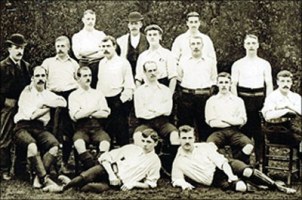 Derby County 1897-1899: Jack Fryer, Jimmy Methven, Jonathan Staley, Joe Leiper, John Cox, Robert Patterson, Archie Goodall, Jimmy Turner, Johnny May, John Goodall, Steve Bloomer, John Boag, Tommy Arkesden, Jimmy Stevenson, Billy MacDonald, Harry Allen, Hughie McQueen.
Derby County 1897-1899: Jack Fryer, Jimmy Methven, Jonathan Staley, Joe Leiper, John Cox, Robert Patterson, Archie Goodall, Jimmy Turner, Johnny May, John Goodall, Steve Bloomer, John Boag, Tommy Arkesden, Jimmy Stevenson, Billy MacDonald, Harry Allen, Hughie McQueen.
Manager: Harry Newbould
Achievements: FA Cup finalists 1897-98, 1898-99
Key men: Steve Bloomer – Legendary striker who scored 273 goals for Derby in 419 games. A quick-thinking player who specialised in low shots, he won 23 caps for England and scored 28 goals. He later enjoyed a lengthy coaching career. Archie Goodall – Belfast-born half back or forward who also played for Preston, Aston Villa and Wolves. Renowned for his shoulder charging, he played 10 games for Ireland. John Goodall – Brother of Archie, his birthplace, Westminster, meant he could play for England (14 caps). A speedy forward, he was a member of the Preston “Invincibles” and was also a highly respected cricketer.
Perception: Cup-fighters with no small amount of skill.
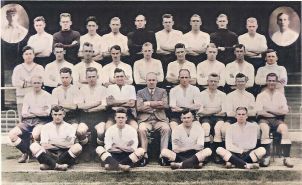 Derby County 1935-36: Jack Kirby, Ted Udall, Jack Webb, Jack Nicholas, Jack Barker, Ralph Hann, Sammy Crooks, Reg Stockill, Hughie Gallacher, Peter Ramage, Dally Duncan, George Collin, Eric Keen, Jimmy Hagan, Charlie Napier, Jack Howe.
Derby County 1935-36: Jack Kirby, Ted Udall, Jack Webb, Jack Nicholas, Jack Barker, Ralph Hann, Sammy Crooks, Reg Stockill, Hughie Gallacher, Peter Ramage, Dally Duncan, George Collin, Eric Keen, Jimmy Hagan, Charlie Napier, Jack Howe.
Manager: George Jobey
Achievements: Football League runners-up 1935-36
Key men: Sammy Crooks – Outside right who spent almost 20 years with Derby County. A native of the North-East of England, he previously played for Durham City. Won 26 caps for England between 19300 and 1936. Dally Duncan – Scottish left winger who joined the club from Hull City for £ 2,000 and played 261 league games for the club, scoring 63 goals. Later played for Luton Town and also managed the Bedfordshire club.
Perception: With Crooks, Duncan and Gallacher, they were formidable going forward.
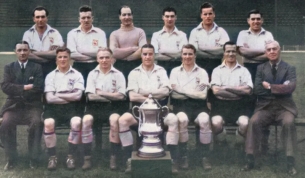 Derby County 1945-46: Vic Woodley, Jack Nicholas, Jack Howe, Jim Bullions, Leon Leuty, Chick Musson, Reg Harrison, Raich Carter, Jackie Stamps, Peter Doherty, Dally Duncan.
Derby County 1945-46: Vic Woodley, Jack Nicholas, Jack Howe, Jim Bullions, Leon Leuty, Chick Musson, Reg Harrison, Raich Carter, Jackie Stamps, Peter Doherty, Dally Duncan.
Manager: Stuart McMillan
Achievements: FA Cup winners 1945-46
Key men: Raich Carter – Talented inside forward who joined Derby from Sunderland. Considered to be one of most natural footballers of his time, Carter won 13 England caps. He scored 12 goals in the FA Cup in 1945-46. A demanding team-mate, he was often very vocal about the performances of others. Peter Doherty – Londonderry-born inside forward who also played for Blackpool and Manchester City, joining Derby in 1945. He was capped 16 times by Ireland.
Perception: A team with some exceptional veterans, very skilful but inconsistent in the league.
Derby County 1971-1975
 Colin Boulton, Rob Webster, Peter Daniel, David Nish, Rod Thomas, John Robson, Terry Hennessey, Roy McFarland, Colin Todd, Bruce Rioch, Alan Durban, Archie Gemmill, John McGovern, Alan Hinton, Henry Newton, John O’Hare, Kevin Hector, Francis Lee, Roger Davies
Colin Boulton, Rob Webster, Peter Daniel, David Nish, Rod Thomas, John Robson, Terry Hennessey, Roy McFarland, Colin Todd, Bruce Rioch, Alan Durban, Archie Gemmill, John McGovern, Alan Hinton, Henry Newton, John O’Hare, Kevin Hector, Francis Lee, Roger Davies
Achievement: Football League champions 1971-72 and 1974-75
Manager: Brian Clough (1972), Dave Mackay (1975)
Key men: Roy McFarland, towering centre half and skipper; Colin Todd, cultured defender; Archie Gemmill, tenacious midfielder; Kevin Hector, legendary striker.
Perception: Good footballing side schooled by Brian Clough. Played the game the right way.
Dinamo Bucharest 1961-65
 Ilie Datcu, Iulius Cezer Ut, Dumitru Ivan, Ion Nunweiler, Cornel Popa, Vasile Alexandru, Constantin Stefean, Vasile Anghel, Haralambie Eftimie, Constantin Fratila, Ion Pircalab, Ion Tircovnicu, Gheorghe Ene, Aurel Ungurolu, Iosif Varga, Emil Petru, Octavian Popescu, Radu Nunweiler.
Ilie Datcu, Iulius Cezer Ut, Dumitru Ivan, Ion Nunweiler, Cornel Popa, Vasile Alexandru, Constantin Stefean, Vasile Anghel, Haralambie Eftimie, Constantin Fratila, Ion Pircalab, Ion Tircovnicu, Gheorghe Ene, Aurel Ungurolu, Iosif Varga, Emil Petru, Octavian Popescu, Radu Nunweiler.
Achievement: Romanian champions 1961-62, 1962-63, 1963-64, 1964-65. Romanian cup winners 1963-64.
Manager: Traian Ionescu, Constantin Teasca, Dumitru Nicolae, Angelo Niculescu
Key men: Ion Nunweiler, one of five brothers, a tough defender who won 40 caps for Romania. Radu Nunweiler, central midfielder. Constantin Fratila, small free-scoring forward.
Perception: Powerful and robust unit built on strong defence. First Romanian double winners.
Dinamo Tbilisi 1978-1981
 Otar Gabelia, Tamaz Kostava, Aleksandre Chivadze, Nodar Khizanishvili, Giori Tavadza, Vitaly Daraselia, Zaur Svanadze, Tengiz Sulakvelidze, Vladimir Gutsaev, David Kipiani, Ramaz Shegelia, Nugzar Kakilasjvili, Shota Khinchagashvili, David Mujiri, Munachar Machaidze, Vakhtang Koridze, Gocha Machaidze, Vakhtang Koridze
Otar Gabelia, Tamaz Kostava, Aleksandre Chivadze, Nodar Khizanishvili, Giori Tavadza, Vitaly Daraselia, Zaur Svanadze, Tengiz Sulakvelidze, Vladimir Gutsaev, David Kipiani, Ramaz Shegelia, Nugzar Kakilasjvili, Shota Khinchagashvili, David Mujiri, Munachar Machaidze, Vakhtang Koridze, Gocha Machaidze, Vakhtang Koridze
Manager: Nodar Akhalkatsi
Achievements: Soviet League champions 1978, Soviet Cup winners 1979, European Cup-Winners’ Cup winners 1980-81
Key men: Ramaz Shengelia, USSR international striker and USSR player of the year in 1978n and 1981. Skilful and prolific. David Kipiani, elegant midfielder with good dribbling and passing skills. Vitaly Daraselia, energetic midfielder who died tragically young in 1982.
Perception: Georgian team capable of stunning football played at pace.
Dundee 1961-64
 Pat Liney, Robert Slater, Bobby Cox, Alex Hamilton, Bobby Seith, Ian Ure, Alex Stuart, George Ryden, Andy Penman, Gordon Smith, Hugh Robertson, Bobby Wishart, Ken Cameron, Doug Houston, Alan Gilzean, Alan Cousin.
Pat Liney, Robert Slater, Bobby Cox, Alex Hamilton, Bobby Seith, Ian Ure, Alex Stuart, George Ryden, Andy Penman, Gordon Smith, Hugh Robertson, Bobby Wishart, Ken Cameron, Doug Houston, Alan Gilzean, Alan Cousin.
Achievement: Scottish League champions 1961-62; European Cup semi-finalists 1962-63, Scottish Cup finalists 1963-64
Manager: Bob Shankly
Key men: Alan Gilzean, skilful and aggressive striker; Ian Ure, powerful defender; Alan Cousin, tricky forward known as the “king of the double shuffle”.
Perception: Tenacious, skilful team considered to be the best produced in Scotland between 1945 and 1961. Bucked the old firm trend.
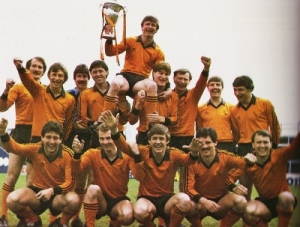 Dundee United 1982-83: Hamish McAlpine, Derek Stark, Maurice Malpas, Richard Gough, Paul Hegarty,Dave Narey, Eamonn Bannon, Ralph Milne, Billy Kirkwood, Paul Sturrock, Davie Dodds, Iain Phillip, John Reilly, John Holt.
Dundee United 1982-83: Hamish McAlpine, Derek Stark, Maurice Malpas, Richard Gough, Paul Hegarty,Dave Narey, Eamonn Bannon, Ralph Milne, Billy Kirkwood, Paul Sturrock, Davie Dodds, Iain Phillip, John Reilly, John Holt.
Achievement: Scottish League champions 1982-83 Five year record: 3, 3, 1, 3, 3
Manager: Jim McLean
Key men: Richard Gough, commanding central defender; Eamonn Bannon, skilful playmaker who had a brief spell in England; Davie Dodds, 22-goal target man.
Perception: Unlikely but deserving champions who also made a mark in Europe in the 1980s.
Dynamo Moscow 1945
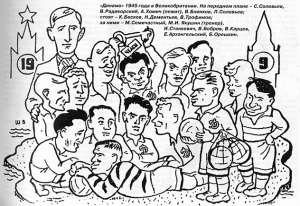 Aleksey Khomich, Vsevolod Radikorsyky, Mikhail Semichastny, Boris Stankevich,Vsevolod Blinkov, Leonid Solovyov, Yevgenly Arkhangeslsky, Vasiliy Kartsev, Konstantin Beskov, Vsevolod Bobrov, Sergey Solovyov, Vasiliy Trofimov, Boris Oreshkin
Aleksey Khomich, Vsevolod Radikorsyky, Mikhail Semichastny, Boris Stankevich,Vsevolod Blinkov, Leonid Solovyov, Yevgenly Arkhangeslsky, Vasiliy Kartsev, Konstantin Beskov, Vsevolod Bobrov, Sergey Solovyov, Vasiliy Trofimov, Boris Oreshkin
Achievement: Russian spring champions 1945, 1949 Unbeaten on tour of England in 1945.
Manager: Mikhail Yakushin
Key men: Aleksey “Tiger” Khomich, brave goalkeeper with superb reflexes; Konstantin Beskov, prolific striker who later managed USSR; Vsevolod Bobrov, striker who turned to Ice Hockey.
Perception: Highly skilled and fit team that went on an ambassadorial tour of the UK in 1945, winning friends and showing the world a different brand of football.
E
East Germany 1974
 Juergen Croy, Lothar Kurbjuweit, Bernd Bransch, Konrad Weise, Hans-Juergen Kreischem Siegmar Waetzlich, Reinhard Lauckm Juergen Sparwasser, Harald Irmscher, Gerd Kische, Martin Hoffmann, Joachim Fritsche, Joachim Streich, Erich Hamann, Juergen Pommerkenke, Peter Ducke, Eberhard Vogel.
Juergen Croy, Lothar Kurbjuweit, Bernd Bransch, Konrad Weise, Hans-Juergen Kreischem Siegmar Waetzlich, Reinhard Lauckm Juergen Sparwasser, Harald Irmscher, Gerd Kische, Martin Hoffmann, Joachim Fritsche, Joachim Streich, Erich Hamann, Juergen Pommerkenke, Peter Ducke, Eberhard Vogel.
Manager: Georg Buschner
Achievements: Olympic Games 1972 bronze medal, World Cup 1974 second stage
Key men: Juergen Croy, goalkeeper with outstanding reflexes, named GDR player of the year 1972, 1976 and 1978. Joachim Streich, striker capped 98 times by the GDR, scoring 53 goals. Juergen Sparwasser, scorer of the goal that beat West Germany in 1974 World Cup.
Perception: An outstanding eastern bloc team that came to fruition in the 1972-74 period. Functional, but also capable of highly technical football.
England 1908
 Horace Bailey, Bob Crompton, Walter Corbett, Jesse Pennington, Ben Warren, Billy Wedlock, Bob Hawkes, Jock Rutherford, Vivien J Woodward, George Hilsdon, Jimmy Windridge, Frank Bradshaw, Arthur Bridgett.
Horace Bailey, Bob Crompton, Walter Corbett, Jesse Pennington, Ben Warren, Billy Wedlock, Bob Hawkes, Jock Rutherford, Vivien J Woodward, George Hilsdon, Jimmy Windridge, Frank Bradshaw, Arthur Bridgett.
Manager: England selection committee
Key men: George Hildson, nicknamed “gatling gun” for his sharp-shooting, scored eight on the European tour in four games; Vivien J Woodward, a gentleman amateur, skilful and sporting; Billy Wedlock, stout centre half, known for his power. Nicknamed “fatty” or “the India rubber man”.
Achievement: Home International champions, 1908; GB XI winners of Olympic gold medal 1908; Unbeaten on first Continental European tour, 1908, goal-difference of 28-2.
Perception: Skilful team with devastating forwards. Ahead of the field in Europe.
England 1947-48
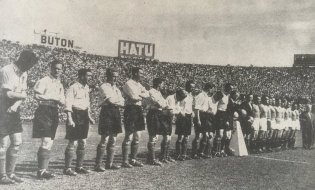 Frank Swift, Laurie Scott, John Howe, Billy Wright, Neil Franklin, Henry Cockburn, Stanley Matthews, Stanley Mortensen, Tommy Lawton, Wilf Mannion, Tom Finney, George Hardwick, Stan Pearson, Raich Carter.
Frank Swift, Laurie Scott, John Howe, Billy Wright, Neil Franklin, Henry Cockburn, Stanley Matthews, Stanley Mortensen, Tommy Lawton, Wilf Mannion, Tom Finney, George Hardwick, Stan Pearson, Raich Carter.
Manager:Walter Winterbottom
Key men:Frank Swift, giant keeper with a handspan of almost 12 inches. Tragically died in the 1958 Munich crash; Billy Wright, dependable and skilful defender, first England player to win 100 caps; Stanley Matthews, legendary figure in the English game, excellent close control and dribbling; Tom Finney, named by Bill Shankly (a team mate at Preston) as the greatest to have played the game.
Achievement: 1947-48 Home International champions; beat Italy, reigning world champions, in Turin 4-0.
Perception: An ageing collection of players whose careers were impacted by war, but some of the great post-war names from English football.
England 1966
 Gordon Banks, George Cohen, Ray Wilson, Nobby Stiles, Jack Charlton, Bobby Moore, Alan Ball, Roger Hunt, Bobby Charlton, Geoff Hurst, Martin Peters, Jimmy Greaves, Ian Callaghan, John Connelly, Terry Paine
Gordon Banks, George Cohen, Ray Wilson, Nobby Stiles, Jack Charlton, Bobby Moore, Alan Ball, Roger Hunt, Bobby Charlton, Geoff Hurst, Martin Peters, Jimmy Greaves, Ian Callaghan, John Connelly, Terry Paine
Manager: [Sir] Alf Ramsey
Achievements: World Cup winners 1966
Key men: Bobby Charlton, winger turned midfielder, fierce shot. Ambassador of the game. Bobby Moore, cultured defender, immaculate timing. Geoff Hurst, tall inside forward who netted a hat-trick in the World Cup final. Gordon Banks, occasionally spectacular but mostly safe and reliable goalkeeper.
Perception: Often underated world champions whose style didn’t endear them to the media at the time. Reputation had grown with time and a realisation that it was a unique occasion.
 Estudiantes de La Plata 1968-70
Estudiantes de La Plata 1968-70
Alberto Jose Poletti, Oscar Malbernat, Ramon Aguirre Suarez, Raul Madero, Jose Hugo Medina, Carlos Bilardo, Carlos Pachame, Nestor Togneri, Felipe Ribaudo, Marcos Conigliaro, Juan Ramon Veron, Juan Echecopar, Christian Rudzki, Errea, Ruben Paganini, Jorge Solari.
Manager: Oscar Zubeldia
Achievements: Argentine champions 1967; Libertadores Cup winners 1968, 1969, 1970; Intercontinental Cup winners 1968.
Key men: Juan Ramon Veron, known as “the witch”, a highly technical player who could line-up in midfield or up front. Prolific scorer. Carlos Bilardo, midfielder anchor, tenacious. Carlos Pachame, fearsome battler in midfield.
Perception: Very skilful team, too often distracted by over robust tactics.
 Everton 1931-33: Ted Sagar, Billy Cook, Warney Cresswell, Ben Williams, Jock Thomson, Charlie Gee, Archie Clark, Cliff Britton, Ted Critchley, Albert Geldard, Tommy White, Jimmy Dunn, Dixie Dean, Tommy Johnson, Jimmy Stein.
Everton 1931-33: Ted Sagar, Billy Cook, Warney Cresswell, Ben Williams, Jock Thomson, Charlie Gee, Archie Clark, Cliff Britton, Ted Critchley, Albert Geldard, Tommy White, Jimmy Dunn, Dixie Dean, Tommy Johnson, Jimmy Stein.
Achievement: Football League Champions 1931-32, FA Cup winners 1932-33.
Manager: Tom McIntosh
Key men: Dixie Dean, 45 goals in 1931-32, excellent in the air and a legend of the inter-war years; Tommy Johnson, 22 goals in 1931-32, powerful left foot; Cliff Britton, classy playmaker signed from Bristol Rovers.
Perception: Free-scoring, powerful team.
 Everton 1962-63: Gordon West, Alex Parker, Mick Meagan, George Thomson, Jimmy Gabriel, Brian Labone, Brian Harris, Alex Scott, Dennis Stevens, Tony Kay, Alex Young, Roy Vernon, Billy Bingham, Johnny Morrissey
Everton 1962-63: Gordon West, Alex Parker, Mick Meagan, George Thomson, Jimmy Gabriel, Brian Labone, Brian Harris, Alex Scott, Dennis Stevens, Tony Kay, Alex Young, Roy Vernon, Billy Bingham, Johnny Morrissey
Manager: Harry Catterick
Key men: Alex Young, creative midfielder known as “the golden vision”; Roy Vernon, heavy smoking inside forward, prolific in front of goal; Jimmy Gabriel, powerful midfielder, adding grit to the defence.
Achievement: Football League champions 1962-63. Five-year record: 5 – 4- 1 – 3- 4
Perception: Skilful team that combined flair with a certain hard edge.
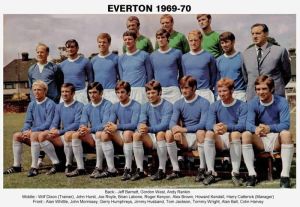 Everton 1969-70: Gordon West, Tommy Wright, Sandy Brown, Keith Newton, Howard Kendall, Brian Labone, John Hurst, Colin Harvey, Alan Ball, Alan Whittle, Joe Royle, Jimmy Husband, Johnny Morrissey.
Everton 1969-70: Gordon West, Tommy Wright, Sandy Brown, Keith Newton, Howard Kendall, Brian Labone, John Hurst, Colin Harvey, Alan Ball, Alan Whittle, Joe Royle, Jimmy Husband, Johnny Morrissey.
Achievement: Football League champions 1969-70, FA Cup finalists 1968. Five year record: 5, 3, 1, 14, 15
Manager: Harry Catterick
Key men: Alan Ball, England World Cup winner, foraging midfielder; Joe Royle, young striker, superb in the air; Brian Labone, England centre half.
Perception: Exciting team that finished nine points ahead of Leeds United to win the title. Failed to build on success.
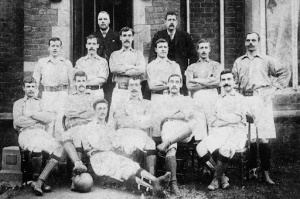 Everton 1890 to 1893: Jack Angus, Richard Williams, Andrew Hannah, Dan Doyle, Daniel Kirkwood, Johnny Holt, William Campbell, Alex Latta, Alec Brady, Fred Geary, Edgar Chadwick, Alf Milward, Charlie Parry, David Jardine, Tom Wylie, Bob Howarth, Alan Maxwell, Dickie Boyle, Alec Stewart, Hope Robertson.
Everton 1890 to 1893: Jack Angus, Richard Williams, Andrew Hannah, Dan Doyle, Daniel Kirkwood, Johnny Holt, William Campbell, Alex Latta, Alec Brady, Fred Geary, Edgar Chadwick, Alf Milward, Charlie Parry, David Jardine, Tom Wylie, Bob Howarth, Alan Maxwell, Dickie Boyle, Alec Stewart, Hope Robertson.
Manager: Dick Molyneux
Achievements: Football League champions 1890-91, runners-up 1889-90; FA Cup finalists 1892-93.
Key men: Fred Geary, centre forward who joined the club from Notts Rangers. A small and powerful player, he had pace and could accelerate past defenders. He won two England caps and moved to Liverpool in 1895. Edgar Chadwick, an expert dribbler, he formerly played for Blackburn Olympic and Blackburn Rovers. A compact inside forward, he won seven caps for England and made 300 appearances for Everton, scoring 110 goals. Johnny Holt, half back signed from Bootle. One of the best centre halves of the 1890s, he was a tough player with boundless energy. He could be temperamental and sly with his challenges, hence he was called “the Little Everton devil”. Won 10 caps for England. Dan Doyle, Scottish international left back who was capped eight times. He won league titles in England and Scotland (with Celtic), the first player to achieve this double.
Perception: A team of great skill and energy. One of the best from the early years of the Football League.
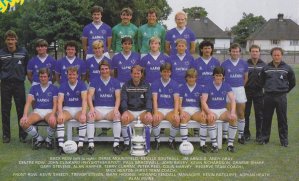 Everton 1983 to 1987: Neville Southall, John Bailey, Gary Stevens, Pat Van Den Hauwe, Paul Power, Derek Mountfield, Kevin Ratcliffe, Trevor Steven, Peter Reid, Kevin Sheedy, Alan Harper, Ian Snodin, Andy King, Alan Irvine, Kevin Richardson, Paul Bracewell, Adrian Heath, Andy Gray, Gary Lineker, Wayne Clarke, Kevin Langley, Graeme Sharp.
Everton 1983 to 1987: Neville Southall, John Bailey, Gary Stevens, Pat Van Den Hauwe, Paul Power, Derek Mountfield, Kevin Ratcliffe, Trevor Steven, Peter Reid, Kevin Sheedy, Alan Harper, Ian Snodin, Andy King, Alan Irvine, Kevin Richardson, Paul Bracewell, Adrian Heath, Andy Gray, Gary Lineker, Wayne Clarke, Kevin Langley, Graeme Sharp.
Manager: Howard Kendall
Achievements: Football League champions 1984-85, 1986-87. Runners-up 1985-86. FA Cup winners 1983-84, finalists 1984-85, 1985-86. FL Cup finalists 1983-84. European Cup-Winners’ Cup winners 1984-85.
Key men: Neville Southall, goalkeeper signed from Bury. A great shot-stopper who played 751 games for Everton. Also capped 92 times by Wales. One of the best keepers of the 1980s. Peter Reid, stocky midfielder whose career was blighted by injuries. Joined Everton from Bolton for £ 60,000. Hard-worker who won 13 caps for England and was a key player in their 1986 World Cup side. Joined QPR in 1989 and also played for Manchester City and Southampton. Kevin Sheedy, a gifted left-foot player who excelled at free-kicks. Although born in Wales, he played 46 times for the Republic of Ireland. Joined Everton from Liverpool for £ 100,000. Left the club in 1992. Gary Lineker was signed from Leicester for £ 800,000 in the summer of 1985 and scored 40 goals in 57 appearances for his new club. He went on to win the golden boot at the 1986 World Cup as the tournament’s top scorer and was signed by Barcelona for £ 2.8 million. A speedy striker whose finishing was first class.
Perception: A hard-working team of young players that surprised English football with their 1985 title win. Well managed and very unlucky not to have won more.
F
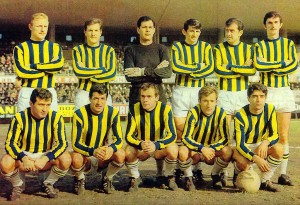 Fenerbahçe 1967-68: Yavuz Simsek, Hazim Cantez, Levent Engineri, Yilmaz Sen, Sukrü Birand, Numan Okumus, Özcan Köksoy, Selim Soydan, Fuat Saner, Ziya Sengüi, Ogün Altiparmak, Yasar Mumcuoglu, Nedim Dögan, Abdullah Çevrin, Erdinç Sandalci, Can Bartu.
Fenerbahçe 1967-68: Yavuz Simsek, Hazim Cantez, Levent Engineri, Yilmaz Sen, Sukrü Birand, Numan Okumus, Özcan Köksoy, Selim Soydan, Fuat Saner, Ziya Sengüi, Ogün Altiparmak, Yasar Mumcuoglu, Nedim Dögan, Abdullah Çevrin, Erdinç Sandalci, Can Bartu.
Achievements: Turkish League champions 1967-68, Turkish Cup winners 1967-68.
Manager: Ignác Molnár
Key men: Yilmaz Sen, strong central defender, 24 years old, capped 18 times by Turkey; Ogün Altiparmak, leading scorer, two spells with the club. 32 caps for Turkey.
Perception: Defence-orientated team, conceding just 12 goals in the league.
 Ferencvaros 1928: Ignác Amsel, Géza Takács, János Hungler, Károly Furmann, Márton Bukovi, Elemér Berkessy, Imre Koszta, József Takács, József Turay, Ferenc Szedlacsik, Vilmos Kohut.
Ferencvaros 1928: Ignác Amsel, Géza Takács, János Hungler, Károly Furmann, Márton Bukovi, Elemér Berkessy, Imre Koszta, József Takács, József Turay, Ferenc Szedlacsik, Vilmos Kohut.
Achievements: Hungarian champions 1925-26, 1926-27, 1927-28. Runners-up 1928-29, 1929-30; Magyar Kupa winners 1926-27, 1927-28; Mitropa Cup winners 1927-28.
Manager: Istvan Toth
Key men: Márton Bukovi, defender who went on to become an innovative coach who helped develop the 4-2-4 formation; József Takács, prolific goalscorer from Budapest who won 32 caps for Hungary.
Perception: Fast, attacking team who scored 26 goals in six games to win the Mitropa Cup.
 Ferencváros 1964-68: István Géczi, Dezsö Novak, Sándor Mátrai, László Horvath, István Juhász, Pál Orosz, Janos Orosz, Janos Karaba, Zoltán Varga, Flórian Albert, Gyula Rákosi, Máte Fenyvesi, Miklós Páncsics, Sándor Havasi, Lajus Szöke, László Balint, Sándo Katona
Ferencváros 1964-68: István Géczi, Dezsö Novak, Sándor Mátrai, László Horvath, István Juhász, Pál Orosz, Janos Orosz, Janos Karaba, Zoltán Varga, Flórian Albert, Gyula Rákosi, Máte Fenyvesi, Miklós Páncsics, Sándor Havasi, Lajus Szöke, László Balint, Sándo Katona
Achievements: 1964 Hungarian League champions, 1964-65 Inter-Cities Fairs’ Cup winners; 1965 Hungarian League runners-up, 1966 Hungarian League runners-up, 1965-66 Hungarian Cup finalists; 1967 Hungarian League champions; 1968 Hungarian League champions, 1967-68 Inter-Cities Fairs’ Cup finalists.
Managers: József Mészáros, Oszkár Vilezsál, Sándor Tátri, Károle Lakat.
Key men: Flórian Albert, elegant midfielder who was named European Footballer of the Year in 1967. Nicknamed “the emperor”; Zoltán Varga, much-travelled midfielder who won Olympic gold; Gyula Rákosi, midfielder who played in World Cups and Olympics.
Perception: Tough, cultured team, difficult to beat in Hungary.
 Feyenoord 1970: Eddie Pieters Graafland, Piet Romeijn, Theo Laseroms, Rinus Israël, Theo van Duivenbode, Wim Jansen, Franz Hasil, Wim van Hanegem, Henk Wery, Ove Kindvall, Coen Moulijn, Guus Haak, Ruud Geels.
Feyenoord 1970: Eddie Pieters Graafland, Piet Romeijn, Theo Laseroms, Rinus Israël, Theo van Duivenbode, Wim Jansen, Franz Hasil, Wim van Hanegem, Henk Wery, Ove Kindvall, Coen Moulijn, Guus Haak, Ruud Geels.
Achievements: 1968-69 Eredivisie champions, KNVB Cup winners; 1969-70 European Cup winners; 1970-71 Eredivisie champions.
Manager: Ernst Happel
Key men: Rinus Israël, nicknamed “Iron Rinus” for his solid defending, captain of the team and Dutch international (47 caps); Wim van Hanegem, superb passer of the ball, strong tackler and very tactical in his play, one of the Netherlands’ greatest players; Ove Kindvall, Swedish striker who was the first non-Dutch leading scorer in the Eredivisie (1969, 1970, 1971). Scored winning goal in European Cup final 1970.
Perception: Less celebrated exponents of a more pragmatic style of “Total Football” but an excellent team that confounded the odds by winning the European Cup against highly-fancied Celtic.
 Fiorentina 1955-1957: Giuliano Sarti, Ardico Magnini, Sergio Cervato, Guiseppe Chiappella, Francesco Rosetta, Armando Segato, Alberto Orzan, Julinho, Guido Gratton, Giuseppe Virgili, Miguel Montuori, Maurilio Prini
Fiorentina 1955-1957: Giuliano Sarti, Ardico Magnini, Sergio Cervato, Guiseppe Chiappella, Francesco Rosetta, Armando Segato, Alberto Orzan, Julinho, Guido Gratton, Giuseppe Virgili, Miguel Montuori, Maurilio Prini
Achievements: 1955-56, Serie A champions; 1956-57 Serie A runners-up, European Cup finalists; 1957-78 Serie A runners-up; 1958-59 Serie A runners-up; 1959-60 Serie A runners-up.
Manager: Fulvio Bernardini
Key men: Giuliano Sarti, excellent goalkeeper who went on to star in the Grand Inter team of the mid-1960s; Julinho, Brazilian who was one of the great right wingers in history; Miguel Montuori, Argentinian-born forward whose career was plagued by injuries.
Perception: An exciting team with outstanding individuals in Julinho and Montuori. Lost just one game in 1955-56 and were unlucky to come up against all-conquering Real Madrid in the European Cup final 1957.
 First Vienna 1930-1933: Karl Horeschovsky, Karl Rainer, Josef Blum, Willi Schmaus, Leopold Hofmann, Leonhard Machu, Anton Brosenbauer, Josef Adelbrecht, Fritz Gschwéidl, Gustav Tögel, Franz Erdl.
First Vienna 1930-1933: Karl Horeschovsky, Karl Rainer, Josef Blum, Willi Schmaus, Leopold Hofmann, Leonhard Machu, Anton Brosenbauer, Josef Adelbrecht, Fritz Gschwéidl, Gustav Tögel, Franz Erdl.
Achievements: Austrian Champions 1931 and 1933; Austrian Cup winners 1930; Mitropa Cup winners 1931.
Manager: Ferdinand Frithum
Key men:Josef Blum, uncompromising defender and captain, won 51 caps for Austria; Leopold Hofmann, spent 15 years with the club, a skilful half-back who played in the 1934 World Cup. Won 27 caps for Austria. Josef Aldebrecht, much-travelled forward.
Perception: Early adopters of the Danubian style.
 Flamengo 1981: Raul, Nei Das, Marinho, Mozer, Júnior, Andrade, Leandro, Zico, Nunes, Tita, Adílio, Anselmo, Lico, Baroninho.
Flamengo 1981: Raul, Nei Das, Marinho, Mozer, Júnior, Andrade, Leandro, Zico, Nunes, Tita, Adílio, Anselmo, Lico, Baroninho.
Achievements: Campeanato Brasileiro Série A winners 1980, 1982, 1983; Libertadores Cup winners 1981; Campeanato Carioca (Rio state championship) 1981. World Club champions (Intercontinental Cup) 1981.
Manager: Paulo César Capegiani
Key men: Zico, the “white Pele” who won over 70 caps for Brazil. Attacking midfielder, two-footed and a free-kick specialist; Júnior, attacking left-sided full back who could play in midfield; Leandro, one of Brazil’s all-time great defenders, a right wing-back with good dribbling skills.
Perception: Attacking team who enjoyed their best ever season in 1981. Packed with talent and typical Brazilian skill.
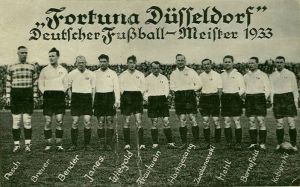 Fortuna Düsseldorf 1933: Willi Pesch, Kurt Trautwein, Paul Janes, Paul Bornefeld, Jakob Bender, Paul Mehl, Georg Hochsegang, Theo Breuer, Felix Zwolanowski, Willi Wigold, Stanislaus Kobierski.
Fortuna Düsseldorf 1933: Willi Pesch, Kurt Trautwein, Paul Janes, Paul Bornefeld, Jakob Bender, Paul Mehl, Georg Hochsegang, Theo Breuer, Felix Zwolanowski, Willi Wigold, Stanislaus Kobierski.
Achievements: Western Germany Champions 1931; German Championship winners 1933.
Manager: Heinz Körner
Key men:Paul Janes, one of the best full backs of his era, alsoplayed sweeper. Techniclaly brilliant, he was one of the first players to perform the bicycle kick; Jakob Bender, midfielder who played in the 1934 World Cup for Germany; Georg Hochsegang, veteran forward, also an international; Stanislaus Kobierski, forward who scored Germany’s first ever goal in the World Cup.
Perception: Underdogs who won the German championship against FC Schalke.
 France 1982-1986: Joël Bats, Patrick battiston, Yvon Le Roux, Maxime bossis, Marius Tresor, Gerard Janvion, Jean-François Domergue, Luis Fernández, Alain Giresse, Jean Tigana, Michel Platini, Bernard Lacombe, Bruno Bellone, Manuel Amoros, Christian Lopez, Dominique Rocheteau, Bernard Genghini, Didier Six, William Ayache, Yannick Stopyra.
France 1982-1986: Joël Bats, Patrick battiston, Yvon Le Roux, Maxime bossis, Marius Tresor, Gerard Janvion, Jean-François Domergue, Luis Fernández, Alain Giresse, Jean Tigana, Michel Platini, Bernard Lacombe, Bruno Bellone, Manuel Amoros, Christian Lopez, Dominique Rocheteau, Bernard Genghini, Didier Six, William Ayache, Yannick Stopyra.
Achievements: World Cup semi-finalists 1982 and 1986; European Championship winners 1984.
Manager: Michael Hidalgo, Henri Michel
Key men: Michel Platini, one of the all-time greats. Skilful, elegant, strategic and an eye for goal, along with superb dead-ball ability; Alain Giresse, attacking or central midfielder who acted as a playmaker and possessed pace and stamina; Jean Tigana, box-to-box midfielder with great movement, pace, defensive ability and teamwork ethic.
Perception: Wonderful midfield, marshalled by Platini. Flowing, dynamic football.
 France 1998-2000: Fabien Barthez, Lilian Thurum, Frank Leboeuf, Marcel Desailly, Bixente Lizaru, Didier Deschamps, Christian Karembeu, Emmanuel Petit, Zinedine Zidane, Youri Djorkaeff, Stephane Guivarc’h, Patrick Vieira, Christoph Dugarry, Laurent Blanc, Thierry Henry, Sylvain Wiltord, David Trezeguet, Robert Pires.
France 1998-2000: Fabien Barthez, Lilian Thurum, Frank Leboeuf, Marcel Desailly, Bixente Lizaru, Didier Deschamps, Christian Karembeu, Emmanuel Petit, Zinedine Zidane, Youri Djorkaeff, Stephane Guivarc’h, Patrick Vieira, Christoph Dugarry, Laurent Blanc, Thierry Henry, Sylvain Wiltord, David Trezeguet, Robert Pires.
Achievements:World Cup winners 1998, European Championship winners 2000.
Managers: Aimé Jacquet, Roger Lemerre
Key men: Zinedine Zidane, one of the finest players of his generation. Elegant playmaker and attacking midfielder with an eye for goal; Didier Deschamps, intelligent and hard-working defensive midfielder and captain; Marcel Desailly, powerful sweeper/central defender born in Ghana.
Perception:Exciting, skilful side with superb individuals.
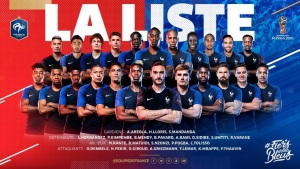 France 2018: Hugo Lloris, Benjamin Pavard, Raphaël Varane, Samuel Umtiti, Lucas Hernandez, Paul Pogba, N’Golo Kanté, Kylian Mbappe, Antoine Griezmann, Blaise Matuidi, Olivier Giroud, Steven Nzonzi, Corentin Tolisso, Nabil Fakir.
France 2018: Hugo Lloris, Benjamin Pavard, Raphaël Varane, Samuel Umtiti, Lucas Hernandez, Paul Pogba, N’Golo Kanté, Kylian Mbappe, Antoine Griezmann, Blaise Matuidi, Olivier Giroud, Steven Nzonzi, Corentin Tolisso, Nabil Fakir.
Achievements: 2016 European Championship finalists; 2018 World Cup winners.
Manager: Didier Deschamps
Key men: Paul Pogba, tall, powerful midfielder, skilful but often temperamental; N’Golo Kanté, busy, hard-working midfielder who provides link between defence and attack; Kylian Mbappe, young striker brimming with skill and goal power.
Perception: The best side in an entertaining World Cup in Russia.
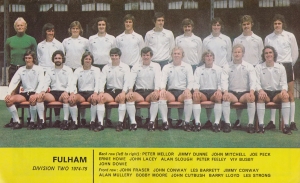 Fulham 1974-75: Peter Mellor, John Cutbush, John Fraser, Alan Mullery, John Lacy, Bobby Moore, John Mitchell, Jimmy Conway, Viv Busby, Alan Slough, Les Barrett, Barry Lloyd.
Fulham 1974-75: Peter Mellor, John Cutbush, John Fraser, Alan Mullery, John Lacy, Bobby Moore, John Mitchell, Jimmy Conway, Viv Busby, Alan Slough, Les Barrett, Barry Lloyd.
Manager: Alec Stock
Achievements: FA Cup finalists 1974-75, Anglo-Scottish Cup finalists 1975-76.
Key men: John Mitchell, 23 year-old forward plucked from non-league football (St. Albans) who scored the decisive semi-final goal against Birmingham. Played 170 league games for Fulham, scoring 57 goals. Later played for Millwall and returned to his first club. Bobby Moore, although 34 years old, former England skipper Moore played a key role in helping Fulham’s younger players. He joined in 1974 from West Ham and finally retired in 1977 having played 148 games for Fulham. John Lacy, tall central defender who was signed from non-league Kingstonian. He was sold to Spurs in 1978 for £ 195,000.
Perception: Surprise FA Cup finalists, boosted by veterans like Alan Mullery and Bobby Moore.
G
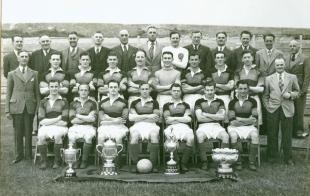 Glentoran 1950-51: Cecil Moore, John Dunlop, Noel McCarthy, Patrick Mulholland, Tommy Hughes, Jimmy Ferran, Michael Cunningham, Sammy Ewing, Sammy Hughes, Thomas Williamson, Jimmy Feeney, Billy Neill, Billy Humphries, Jim Murdough.
Glentoran 1950-51: Cecil Moore, John Dunlop, Noel McCarthy, Patrick Mulholland, Tommy Hughes, Jimmy Ferran, Michael Cunningham, Sammy Ewing, Sammy Hughes, Thomas Williamson, Jimmy Feeney, Billy Neill, Billy Humphries, Jim Murdough.
Manager: Frank Grice
Achievements: Irish League champions 1950-51, 1952-53; Irish Cup winners 1950-51.
Key men: Sammy Hughes, Ballymena-born centre forward who was a prolific scorer, netting 297 goals for Glentoran in 378 games. Topped the Irish League scoring list three times in his career. Cecil Moore, goalkeeper who was capped by Ireland the United States. Joined Glentoran after the second world war and played six years with the club.
Perception: Hard-to-beat team moulded by Frank Grice.
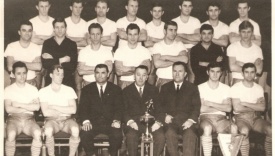 Górnik Zabrze 1964-1967: Hubert Kostka, Stefan Florenski, Jan Kowalski, Roman Lentner, Włodzimierz Lubanski, Jerzy Musiałek, Edward Olszowska, Stanisław Oslizło,Ernest Pohl, Waldemar Słomiany, Erwin Wilczek, Zygfryd Szołtysik, Jan Gomola, Rainer Kuchta, Norbert Gwosdek, Alfred Olek.
Górnik Zabrze 1964-1967: Hubert Kostka, Stefan Florenski, Jan Kowalski, Roman Lentner, Włodzimierz Lubanski, Jerzy Musiałek, Edward Olszowska, Stanisław Oslizło,Ernest Pohl, Waldemar Słomiany, Erwin Wilczek, Zygfryd Szołtysik, Jan Gomola, Rainer Kuchta, Norbert Gwosdek, Alfred Olek.
Achievements: Polish League champions 1964-65, 1965-66, 1966-67; Polish Cup winners 1964-65.
Manager: Ferenc Farsang, Władyslaw Giergiel, Geza Kalocsai.
Key men: Włodzimierz Lubanski, fast and prolific in front of goal. Injury robbed him of a place in Poland’s 1974 World Cup team. Second highest scorer for Polish national team; Hubert Kostka, goalkeeper who placed for the national team for a decade; Zygfryd Szołtysik, diminutive midfielder nicknamed “Zyga”, won 46 caps for Poland.
Perception: Fast-moving team, fearsome on their own patch.
 Grasshopper Zurich 1936-37: Willy Huber, Severino Minellu, Walter Weiler, Oscar Rauch, Sirio Vernati, Max Abegglen, Josef Artimovics, Alfred Bickel, Eugen Rupf, Fritz Wagner, Robert Weiler.
Grasshopper Zurich 1936-37: Willy Huber, Severino Minellu, Walter Weiler, Oscar Rauch, Sirio Vernati, Max Abegglen, Josef Artimovics, Alfred Bickel, Eugen Rupf, Fritz Wagner, Robert Weiler.
Achievements: Swiss League champions 1936-37, Swiss Cup winners 1936-37, Swiss Cup winners 1937-38
Manager: Karl Rappan
Key men: Willy Huber, strong goalkeeper who played in two World Cups for Switzerland, winning 16 caps; Severino Minelli, one of the first sweepers, a calm defender who won 80 caps in a long career with Grasshopper; Alfred Bickel, tough striker who played 71 times for Switzerland.
Perception: Innovative team coached by Rappan, early adopters of catenaccio system “the bolt” and use of sweepers.
 Great Britain Olympic XI 1912: Ronald Brebner, Thomas Burn, Arthur Knight, Joseph Dines, Edward Hanney, Henry Littlewort, Doug McWhirter, Harold Stamper, Gordon Wright, Harold Walden, Vivien Woodward, Arthur Berry, Gordon Hoare, Ivan Sharpe.
Great Britain Olympic XI 1912: Ronald Brebner, Thomas Burn, Arthur Knight, Joseph Dines, Edward Hanney, Henry Littlewort, Doug McWhirter, Harold Stamper, Gordon Wright, Harold Walden, Vivien Woodward, Arthur Berry, Gordon Hoare, Ivan Sharpe.
Achievements: Olympic Gold medal, 1912 in Stockholm.
Managers: A.Birch
Key men: Ivan Sharpe, fast winger who went on to become a leading football writer; R.G. Brebner, outstanding goalkeeper who sadly signed two years on from a head injury sustained in a football match; Harold Walden, goalscoring forward to was later a music hall star.
Perception: Cultured team, full of the Corinthian spirit.
 Greece 2004: Antonios Nikopolidis, Giourkas Seitaridis, Michalis Kapsis, Traianos Dellas, Takis Fyssas, Kostas Katsouranis, Theodoros Zagorakis, Angelos Basinas, Angelos Charisteas, Stelios Giannakopoulos, Zisis Vryzas, Stylianos Venetidis, Dimitris Papadopoulos.
Greece 2004: Antonios Nikopolidis, Giourkas Seitaridis, Michalis Kapsis, Traianos Dellas, Takis Fyssas, Kostas Katsouranis, Theodoros Zagorakis, Angelos Basinas, Angelos Charisteas, Stelios Giannakopoulos, Zisis Vryzas, Stylianos Venetidis, Dimitris Papadopoulos.
Achievements:European Championship winners 2004
Manager: Otto Rehhagel
Key men: Angelos Charisteas, tall striker who scored the winning goal in the final against Portugal, won more than 80 caps for Greece; Theodoros Zagorakis, captain of the team – a battling, industrious midfielder; Antonios Nikopolidis, one of the best Greek goalkeepers of all time and absolutely vital during Euro 2004.
Perception: Dour side, pragmatic and made best of limited resources. Shock winners.
 Grêmio 1994-1996: Danrlei, Francisco Arce, Adilson Batista, Roger, Catino Rivarolo, Goianio, Carlos Miguel, Arílson, Paulo Nunes, Jardel, Alexandre Gaucho, Nildo, Dinho, Luciano Dias.
Grêmio 1994-1996: Danrlei, Francisco Arce, Adilson Batista, Roger, Catino Rivarolo, Goianio, Carlos Miguel, Arílson, Paulo Nunes, Jardel, Alexandre Gaucho, Nildo, Dinho, Luciano Dias.
Achievements: Copa Brasil 1994, Copa Libertadores 1995, Brazil Série A champions 1996.
Manager: Luiz Felipe Scolari
Key men: Catino Rivarolo, sought-after Paraguayan defender; Paulo Nunes, prolific scorer signed from Flamengo, two caps for Brazil, formed a powerful partnership with Jardel; Jardel, another excellent scorer with good positional ability who later had a good career with Porto, topping Europe’s goalscoring charts for three seasons.
Perception: Skilful, fast attacking team with superb individuals.
H
 Hamburg 1978-79: Rudolf Kargus, Manny Kaltz, Peter Nogly, Ivan Buljan, Peter Hidien, Kevin Keegan, Jimmy Hartwig, Casper Memering, Horst Bertl, Felix Magath, Horst Hrubesch, Willi Ramann, Bernd Wehmeyer.
Hamburg 1978-79: Rudolf Kargus, Manny Kaltz, Peter Nogly, Ivan Buljan, Peter Hidien, Kevin Keegan, Jimmy Hartwig, Casper Memering, Horst Bertl, Felix Magath, Horst Hrubesch, Willi Ramann, Bernd Wehmeyer.
Achievement: Bundesliga champions 1978-79, European Cup runners-up 1979-80, Bundesliga runners-up 1979-80, 1980-81.
Manager: Branko Zebec
Key men: Kevin Keegan, buzzing forward, high work rate and team play. England captain. Felix Magath, captained the team, central and attacking midfielder, tough and capable of fierce shooting. Manny Kaltz, right back who possessed excellent crossing ability. Penalty taker. Horst Hrubesch, old fashioned centre forward, good in the air and tough for defenders to mark.
Perception: Attacking team, well-drilled and fit.
Gordon Marshall, Wilson Brown, John Lough, Bobby Kirk, Tom Mackenzie, Bobby Parker, George Thomson, Jimmy Milne, Billy Higgins, Andy Bowman, Davie Mackay, John Cumming, Ian Crawford, Jimmy Wardhaugh, Bobby Blackwood, Johnny Hamilton, Alex Young, Willie Bauld, Jimmy Murray.
Achievement: 1955-56 Scottish Cup winners; 1956-57 Scottish League runners-up; 1957-58 Scottish League champions, Scottish League Cup winners; 1958-59 Scottish League runner-up, Scottish League Cup winners; 1959-60 Scottish League champions.
Manager: Tommy Walker
Key men: Davie Mackay, tough, uncompromising midfield/half back who became one of the legends of the post-war game. 22 caps for Scotland, joined Spurs in 1959 where he won the fabled ‘double’; Alex Young, the ‘golden vision’, a talented forward who went on to play for Everton; Jimmy Wardhaugh, an excellent goalscorer who had sublime dribbling skills. 206 goals in 303 league games for Hearts.
Perception: Tough, fast-moving team, one of Scotland’s best teams of the 1950s.
Hibernian 1949-1953
 Tommy Younger, John Grant, Hugh Howie, John Ogilvie, Bobby Combe, Archie Buchanan, Jock Paterson, Pat Ward, Eddie Turnbull, Gordon Smith, Bobby Johnstone, Lawrie Reilly, Willie Ormond, Tommy McDonald, James Mulkerrin.
Tommy Younger, John Grant, Hugh Howie, John Ogilvie, Bobby Combe, Archie Buchanan, Jock Paterson, Pat Ward, Eddie Turnbull, Gordon Smith, Bobby Johnstone, Lawrie Reilly, Willie Ormond, Tommy McDonald, James Mulkerrin.
Achievement: 1949-50 Scottish League runners-up; 1950-51 Scottish League champions; 1951-52 Scottish League champions; 1952-53 Scottish League runners-up.
Manager: Hugh Shaw
Key men: Lawrie Reilly, long-serving forward who won 38 caps for Scotland, scoring 22 goals; Bobby Johnstone, inside forward who enjoyed success at Hibs and Manchester City, possessed elegant ball control; Willie Ormond, left-winger who played over 500 games for Hibs, going on to manage the Scottish national team later in life.
Perception: Exciting team that was built around a superb five-man forward line, ‘the famous five’.
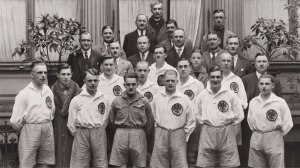 Hertha Berlin 1929-1931: Paul Gehlhaar, Willi Völker, Rudolf Wilhelm, Otto Leuschner, Ernst Müller, Herbert Radeche, Hanne Sobek, Hermann Hahn, Willi Kirsei, Bruno Lehmann, Hans Ruch, Hans Appel, Alfred Stahr.
Hertha Berlin 1929-1931: Paul Gehlhaar, Willi Völker, Rudolf Wilhelm, Otto Leuschner, Ernst Müller, Herbert Radeche, Hanne Sobek, Hermann Hahn, Willi Kirsei, Bruno Lehmann, Hans Ruch, Hans Appel, Alfred Stahr.
Coach: Richard Girulatis
Achievement: German champions 1930, 1931
Key men: Willi Völker, Berlin-born defender who died in a Soviet prisoner of war camp in 1946. Played one game for Germany. Hanne Sobek tall inside forward who was extremely influential in Hertha’s golden age. Capped 10 times by Germany and later managed the club. Willi Kirsei, the club’s record goalscorer who netted 244 goals in 164 games.
Perception: Early adopters of Herbert Chapman’s W-M formation and Germany’s dominant side in the early-1930s.
 Hungary 1938: Antal Szabô, Sándor Bíró, Gyula Polgár, Gyula Lázár, Antal Szalay, György Szücs, Gyula Zsengellér, Jenõ Vincze, Pál Titkos, György Sárosi, Ferenc Sas, Vilmos Kohut, Geza Toldi, Lajos Koranyi, Istvan Balogh.
Hungary 1938: Antal Szabô, Sándor Bíró, Gyula Polgár, Gyula Lázár, Antal Szalay, György Szücs, Gyula Zsengellér, Jenõ Vincze, Pál Titkos, György Sárosi, Ferenc Sas, Vilmos Kohut, Geza Toldi, Lajos Koranyi, Istvan Balogh.
Achievement: World Cup finalists 1938
Manager: Alfréd Schaffer
Key men: György Sárosi, outstanding footballer who was versatile and very tehnical. Played for Ferencvaro and won 62 caps, scoring 42 goals for Hungary. Captained the team that finished second in the 1938 World Cup. Gyula Zsengellér, Ujpest striker, top scorer in Hungary for five years. Also had a successful and long managerial career.
Perception: Attacking, often overlooked team. Very technical.
 Hungary 1952-1954: Gyula Grosics, Jenõ Dalnoki, Imre Kovács, Laśzló Budal, Jenõ Buzánsky, Zoltán Czibor, Lajos Csordás, Ferenc Puskás, József Bozsik, Mihály Lantos, Gyula Lóránt, József Zakariás, Péter Palotá, Nándor Hidegkuti, Sándor Kocsis, Mihály Tóth.
Hungary 1952-1954: Gyula Grosics, Jenõ Dalnoki, Imre Kovács, Laśzló Budal, Jenõ Buzánsky, Zoltán Czibor, Lajos Csordás, Ferenc Puskás, József Bozsik, Mihály Lantos, Gyula Lóránt, József Zakariás, Péter Palotá, Nándor Hidegkuti, Sándor Kocsis, Mihály Tóth.
Manager: Gusztáv Sebes
Achievement: Winners of the 1952 Olympic gold medal; 1954 World Cup finalists, losing to West Germany in the famous final in Bern.
Key men: Gyula Grosics, relatively short for a goalkeeper, he was known as “the black panther” due to his agility. Arguably the first “sweeper-keeper”, advancing out of his box to act as a back-stop defender. An interesting character who attempted to defect in the 1950s and was accused of espionage by the communist authorities; Sándor Kocsis, slender striker with good aerial skills. Played for Ferencvaros and Honved before playing outside Hungary after the revolt of 1956, joining Young Fellows Zurich and then Barcelona. Scored 376 goals in 402 games in his career and was capped 68 times by Hungary. Was top scorer in the 1954 World Cup with 11 goals; Nándor Hidegkuti, the so-called “deep-lying centre forward” that caused England so many problems in 1953 and 1954. Played for Vörös Lobogó (Red Banner) and MTK in Budapest and won 69 caps, scoring 39 goals. A versatile forward with excellent ball control and positional awareness; Ferenc Puskás, one of the all-time greats of football, known as “the galloping major” and “pancho”. Puskas was captain of Hungary and the talisman of the golden team that captivated Europe. He was not fully fit in the 1954 World Cup final, which may have affected the outcome of the game. Played for Honved and then Real Madrid, where he won three European Cups. In his career, he scored 619 goals in 618 club games.
Perception: One of the best teams never to win the World Cup. Talented, skilful, ground-breaking in so many ways, notably in their use of the “deep-lying centre forward”. Changed the face of European and World football in the early-to-mid 1950s.
I
 Independiente 1964-1965: Miguel Ángel Santoro, Héctor Zerrillo, Thomás Rolan, Roberto Ferreiro, David Acevedo, Jorge Maldonado, Raúl Bernao, Osvaldo Mura, Luis Suárez, Mario Rodriguez, Raúl Savoy, Juan C. Guzmán, Prospitti, Roque Avallay, Rubén Navarro, Raul Decario, Jose Paflik, Vicente De La Mata Jr.
Independiente 1964-1965: Miguel Ángel Santoro, Héctor Zerrillo, Thomás Rolan, Roberto Ferreiro, David Acevedo, Jorge Maldonado, Raúl Bernao, Osvaldo Mura, Luis Suárez, Mario Rodriguez, Raúl Savoy, Juan C. Guzmán, Prospitti, Roque Avallay, Rubén Navarro, Raul Decario, Jose Paflik, Vicente De La Mata Jr.
Achievements: 1963 Primera División; 1964 Copa Libertadores; 1965 Copa Libertadores
Manager: Manuel Giúdice
Key men: Mario Rodriguez, goalscoring forward who was strong and powerful. Won 10 caps for Argentina; Raúl Savoy, much-travelled forward, who was prolific in front of goal, known as “Raulito”; Jorge Maldonado, captain and midfield dynamo, tough holding player.
Perception: Well organised, strong defence with an indomitable team spirit.
 Inter Milan 1962-1966: Lorenzo Buffon, Guiliano Sarti, Tarcisio Burgnich, Giacinto Facchetti, Carlo Tagnin, Franco Zaglio, Gianfranco Bedin, Aristide Guarneri, Saul Malatrasi, Armando Picchi, Angelo Domenghini, Jair, Joaquin Peiró, Sandro Mazzola, Beniamino Di Giacomo, Luis Suárez, Mario Corso, Humberto Machio, Aurelio Milani
Inter Milan 1962-1966: Lorenzo Buffon, Guiliano Sarti, Tarcisio Burgnich, Giacinto Facchetti, Carlo Tagnin, Franco Zaglio, Gianfranco Bedin, Aristide Guarneri, Saul Malatrasi, Armando Picchi, Angelo Domenghini, Jair, Joaquin Peiró, Sandro Mazzola, Beniamino Di Giacomo, Luis Suárez, Mario Corso, Humberto Machio, Aurelio Milani
Achievement: Serie A champions 1962-63, 1964-65, 1965-66; European Cup winners 1963-64, 1964-65. Runners-up 1966-67.
Manager: Helenio Herrera
Key men: Giacinto Facchetti, one of the first and best attacking full backs, discliplined, great stamina, elegant and hard-working. National team manager, winning 94 caps. Powerful shot and excellent crosser of the ball; Sandro Mazzola, 70 caps for Italy. Quick, skilful and versatile midfidlder. Son of Valentino Mazzola of the great Torino side that perished in air crash; Angelo Domenghini, winger or striker. Excellent technical ability and speed.
Perception: The “grande Inter” team that used catenaccio to devastating effect, thanks to the intense methods of Helenio Herrera.
 Inter Milan 1988-89: Walter Zenga, Giuseppe Bwergomi, Andreas Brehme, Gianfranco Mattedi, Ricardo Ferri, Andrea Mandorlini, Bianchi Alessandro, Nicola Berti, Ramón Diaz, Lothar Matthäus, Aldo Serena, Giuseppe Baresi, Conrdado Verdelli.
Inter Milan 1988-89: Walter Zenga, Giuseppe Bwergomi, Andreas Brehme, Gianfranco Mattedi, Ricardo Ferri, Andrea Mandorlini, Bianchi Alessandro, Nicola Berti, Ramón Diaz, Lothar Matthäus, Aldo Serena, Giuseppe Baresi, Conrdado Verdelli.
Achievements: Serie A winners 1988-89 Five-year record: 3 – 5 – 1 – 3 – 3
Key men: Walter Zenga, consistent and athletic goalkeeper, great shot-stopper. 58 caps for Italy; Ramón Diaz, a contemporary of Maradona in Argentina, goalscorer signed from Fiorentina, 22 caps for Argentina; Lothar Matthäus, strong, powerful German midfielder, World Cup winner in 1990. Joined from Bayern Munich in 1984.
Manager: Giovanni Trapattoni.
Perception: Record breaking team (58 points), had the goalscoring ability that fought off the challenge of Napoli and AC Milan.
 Ipswich Town 1961-62: Roy Bailey, Billy Baxter, Larry Carberry, John Compton, Andy Nelson, Jimmy Leadbetter, John Elsworthy, Roy Stephenson, Ray Crawford, Doug Moran, Ted Phillips.
Ipswich Town 1961-62: Roy Bailey, Billy Baxter, Larry Carberry, John Compton, Andy Nelson, Jimmy Leadbetter, John Elsworthy, Roy Stephenson, Ray Crawford, Doug Moran, Ted Phillips.
Achievement: Football League Champions 1961-62.
Manager: Alf Ramsey
Key men: Ray Crawford, prolific goalscoring centre forward, good in the air. Capped twice by England in a long, much-travelled career. Ted Phillips, striker who scored 150 goals in 250 games for Ipswich. A Suffolk man who packed a punch with his dead ball skills. Jimmy Leadbetter, experienced winger who acted a a winthdrawn midfielder, thus paving the way for Ramsey’s “wingless wonders” of the 1966 World Cup.
Perception: A short-lived team that played beyond its ability to win the title, thanks to Ramsey’s inventive approach.
 Ipswich Town 1980-81: Paul Cooper, George Burley, Mick Mills, Terry Butcher, Russell Osman, Arnold Mühren, John Wark, Frans Thijjsen, Eric Gates, Paul Mariner, Alan Brazil, Steve McCall, Kevin O’Callaghan.
Ipswich Town 1980-81: Paul Cooper, George Burley, Mick Mills, Terry Butcher, Russell Osman, Arnold Mühren, John Wark, Frans Thijjsen, Eric Gates, Paul Mariner, Alan Brazil, Steve McCall, Kevin O’Callaghan.
Achievement: UEFA Cup winners 1980-81, FA Cup semi-finalists 1980-81, Football League runners-up 1980-81. Five year record: 6 – 3- 2 – 2 – 9
Manager: Bobby Robson
Key men: Terry Butcher, towering centre half who became a pivotal figure in the England squad. John Wark, outstanding midfielder who score over 30 goals in 1980-81. Arnold Mühren, elegant Dutch midfielder signed from Twente. Won the European Cup with Ajax in 1973. Frans Thijjsen, superb Dutch midfielder also signed from Twente, won 14 caps for his country and spent four years with Ipswich before joining Nottingham Forest.
Perception: An excellent footballing team whose resources were stretched as they competed on all fronts. Arguably a better team than the Villa side that pipped them to the title in 1981.
Italy 1934: Gianpiero Combi, Eraldo Monzeglio, Luigi Allemandi, Attilio Ferraris, Luis Monti, Luigi Bertolini, Enrique Guaita, Guiseppe Meazza, Giovanni Ferrari, Raimundo Orsi, Angelo Schiavio, Felice Borel, Armando Castellazzi, Mario Pizziola

Achievement: World Cup winners 1934.
Manager: Vittorio Pozzo
Key men: Raimundo Orsi, Argentinian-born winger, quick left-footed, excellent dribbler with sublime technical ability; Giuseppe Meazza, tricky forward, capable of mazy runs and dancing a decent tango! A great character who played for Inter, AC Milan and Juventus; Luis Monti, another Argentinian-born, strong tackling defensive midfielder.
Perception: Tough, fast-moving team with a high level of skill.
 Italy 1938: Aldo Olivieri, Alfredo Foni, Pietro Rava, Pietro Serantoni, Michele Andreaolo, Ugo Locatelli, Amedeo Biavati, Giuseppe Meazza, Silvio Piola, Giovanni Ferrari, Gino Colaussi, Eraldo Monzeglio, Piero Pasinati.
Italy 1938: Aldo Olivieri, Alfredo Foni, Pietro Rava, Pietro Serantoni, Michele Andreaolo, Ugo Locatelli, Amedeo Biavati, Giuseppe Meazza, Silvio Piola, Giovanni Ferrari, Gino Colaussi, Eraldo Monzeglio, Piero Pasinati.
Achievement: World Cup winners 1938.
Manager: Vittorio Pozzo
Key men: Alfredo Foni, full back who won Olympic gold medal in the 1936 games in Berlin. Lazio player, he also enjoyed long management career; Gino Colaussi, Triestina forward who was the first player to score more than one goal in a World Cup final; Silvio Piola, Serie A’s record goalscorer, he netted five goals in the 1938 World Cup, but also impressed with his work rate and technical ability.
Perception: Rebuilt side from 1934, as robust as ever and full of talent. Deservedly retained the World Cup.
 Italy 1968: Dino Zoff, Giacinto Facchetti, Tarcisio Burgnich, Aristide Guarneri, Ernesto Castano, Giovanni Lodetti, Giorgio Ferrini, Antonio Juliano, Sandro Mazzola, Angelo Domenghini, Pierino Prati, Pietro Anastasi, Luigi Riva.
Italy 1968: Dino Zoff, Giacinto Facchetti, Tarcisio Burgnich, Aristide Guarneri, Ernesto Castano, Giovanni Lodetti, Giorgio Ferrini, Antonio Juliano, Sandro Mazzola, Angelo Domenghini, Pierino Prati, Pietro Anastasi, Luigi Riva.
Manager: Ferruccio Valcareggi
Achievement: European Championship winners 1968, beating Yugoslavia in the final and the USSR in the semi-final. In the previous rounds, overcome Bulgaria, Romania, Switzerland and Cyprus.
Key men: Pierino Prati, AC Milan forward who was opportunistic in front of goal. Strong all-round player, good in the air and full of pace – could also play on the wing; Dino Zoff, imposing goalkeeper who was pragmatic rather than flamboyant. Played for Napoli from 1967 to 1972 before joining Juventus. Won the World Cup in 1982 during a 112-cap career with Italy; Giacinto Facchetti, Inter Milan and Italy skipper who played 94 times for Italy and made over 600 appearances for Inter. Combined pace, stamina and power to become one of the best full backs in the world.
Perception: Defence-minded team, hard to beat, strategically savvy.
 Italy 1982: Dino Zoff, Gaetano Scirea, Claudio Gentile, Fulvio Collovati, Giuseppe Bergomi, Antonio Cabrini, Gabriele Oriali, Marco Tardelli, Bruno Conti, Francesco Graziani, Paolo Rossi, Giancarlo Antognoni, Gianpiero Marini, Alessandro Altobelli
Italy 1982: Dino Zoff, Gaetano Scirea, Claudio Gentile, Fulvio Collovati, Giuseppe Bergomi, Antonio Cabrini, Gabriele Oriali, Marco Tardelli, Bruno Conti, Francesco Graziani, Paolo Rossi, Giancarlo Antognoni, Gianpiero Marini, Alessandro Altobelli
Achievement: World Cup winners 1982, European Championship fourth place 1980.
Manager: Enzo Bearzot
Key men: Dino Zoff, imposing goalkeeper, unspectacular but reliable and steady. One of the all-time great keepers (112 caps) and captain of the Italian team; Claudio Gentile, Tripoli-born hard man, tough, tenacious and uncompromising, 71 caps for Italy; Marco Tardelli, hard-tackling but skilful midfielder with a powerful shot. 81 caps; Paolo Rossi, returned from a ban to become leading scorer and player of the tournament in the 1982 World Cup. Quick, agile and prolific.
Perception: Not necessarily the best team in 1982, but a focused side that came to its peak in the competition.
 Italy 2006: Gianluigi Buffon, Fabio Cannavaro, Gianluca Zambrotta, Andrea Pirlo, Gennaro Gattuso, Francesco Totti, Luca Toni, Marco Matterazzi, Fabio Grosso, Mauro Camoranesi, Simone Perrotta, Alessandro Del Piero, Daniele De Rossi, Alberto Gilardino, Vincenzo Laquinta, Alessandro Nesta.
Italy 2006: Gianluigi Buffon, Fabio Cannavaro, Gianluca Zambrotta, Andrea Pirlo, Gennaro Gattuso, Francesco Totti, Luca Toni, Marco Matterazzi, Fabio Grosso, Mauro Camoranesi, Simone Perrotta, Alessandro Del Piero, Daniele De Rossi, Alberto Gilardino, Vincenzo Laquinta, Alessandro Nesta.
Achievement: World Cup winners 2006; European Championship Quarter-finals 2008.
Manager: Marcelo Lippi
Key men: Gianluigi Buffon, Juventus goalkeeper, calm, agile and strong. A great shot-stopper; Fabio Cannavaro, central defender and captain, read the game superbly, versatile and tactically intelligent; Francesco Totti, Roma legend who played almost 800 games for the club, attacking midfielder, versatile; Andrea Pirlo, gifted AC Milan midfielder, excellent vision and passing ability.
Perception: Underrated and unfancied winners of the World Cup. Some good individuals, strong in defence.

Italy 2021: Gianlugi Donnarumma, Giovanni Di Lorenzo, Leonardo Bonucci, Giorgio Chiellini, Emerson, Nicolà Barella, Jorginho, Marco Verrati, Federico Chiesa, Ciro Immobile, Lorenzo Insigne, Leonardo Spinazzola, Manuel Locatelli, Federico Bernardeschi, Bomenico Berardi, Andrea Belotti, Alessandro Florenzi, Bryan Christante.
Achievement: Euro 2020 winners 2021, beating England on penalties in the final.
Manager: Roberto Mancini
Key men: Gianluigi Donnarumma, giant goalkeeper, moved from AC Milan to Paris Saint-Germain in tournament, strong with good technique; Giorgio Chiellini, veteran Juventus centre back who combined aggression with excellent timing and tackling as well as aerial ability; Federico Chiesa, fast and skilful winger with Fiorentina, outstanding in Euro 2020.
Perception: Great team ethic, determined after failing to qualify for 2018 World Cup, and consistent. Euro victory was their 33rd game without defeat.
J
 Japan 1992: Kazuya Maekawa, Takumi Horiike, Tetsuji Hishiratani, Masami Ihara, Satoshi Tsunami, Mitsunori Yoshida, Tsuyoshi Kitazawa, Ruy ramus, Masahiro Fukuda, Takuya Takagi, Kazuyoshi Miura, Toshinobu Katsuya.
Japan 1992: Kazuya Maekawa, Takumi Horiike, Tetsuji Hishiratani, Masami Ihara, Satoshi Tsunami, Mitsunori Yoshida, Tsuyoshi Kitazawa, Ruy ramus, Masahiro Fukuda, Takuya Takagi, Kazuyoshi Miura, Toshinobu Katsuya.
Manager:Hans Ooft
Achievements:AFC Asian Cup winners 1992
Key men:Kazuyoshi Miura, the famous “Kazu” or “King Kazu” who is still playing at 51. Skilful forward who won 89 caps for Japan, scoring 55 goals; Masahi Nakayama, outspoken and humorous player who refuses to retire.
Perception:Skilful, neat team who won the Asian Cup for the first time on home soil.
 Juventus 1957-1961: Carlo Mattrel, Giuseppe Vavassori, Giuseppe Corradi, Bruno Garzena, Flavio Emoli, Rino Ferrario, Umberto Colombo, Bruno Nicolé, Giampiero Boniperti, John Charles, Enrique Sivori, Gino Stacchini, Benito Sari, Ernesto Castano, Sergio Cervato, Gianfranco Leoncini.
Juventus 1957-1961: Carlo Mattrel, Giuseppe Vavassori, Giuseppe Corradi, Bruno Garzena, Flavio Emoli, Rino Ferrario, Umberto Colombo, Bruno Nicolé, Giampiero Boniperti, John Charles, Enrique Sivori, Gino Stacchini, Benito Sari, Ernesto Castano, Sergio Cervato, Gianfranco Leoncini.
Managers: Ljubisa Brocic, Renato Cesarini, Carlo Parola
Achievements: 1957-58 Serie A champions; 1958-59 Coppa Italia winners; 1959-60 Serie A champions and Coppa Italia winners; 1960-61 Serie A champions.
Key men: John Charles, Welsh international who could play at centre half or centre forward. Powerful in the air, he cost Juve a British record £ 65,000 and repaid them with 108 goals in 155 Serie A games. Won 38 caps for Wales; Giampiero Boniperti, versatile player who spent 15 years with Juv, scoring 179 goals in 459 games; Enrique Sivori, Argentine-born diminutive forward also capped by Italy. Audacious and brilliant, quick and technically gifted.
Perception: Powerful team boosted by the inclusion of foreigners Charles and Sivori.
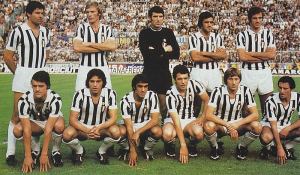 Juventus 1971-1977: Dino Zoff, Pietro Carmignani, Gianpietro Marchetti, Giuseppe Furino, Francesco Morini, Sandro Salvadore, Helmut Haller, Franco Causio, Pietro Anastasi, Fabio Capello, Roberto Bettega, Jose Altafini, Antonello Cuccureddu, Claudio Gentile, Gaetano Scirea, Giuseppe Damiani, Marco Tardelli, Roberto Boninsegna, Romeo Benetti.
Juventus 1971-1977: Dino Zoff, Pietro Carmignani, Gianpietro Marchetti, Giuseppe Furino, Francesco Morini, Sandro Salvadore, Helmut Haller, Franco Causio, Pietro Anastasi, Fabio Capello, Roberto Bettega, Jose Altafini, Antonello Cuccureddu, Claudio Gentile, Gaetano Scirea, Giuseppe Damiani, Marco Tardelli, Roberto Boninsegna, Romeo Benetti.
Managers: Cestmir Vycpalek, Carlo Parola, Giovanni Trappatoni
Achievements: 1971-72 Serie A champions; 1972-73 Serie A champions, European Cup finalists; 1974-75 Serie A champions, 1976-77 Serie A champions, UEFA Cup winners.
Key men: Dino Zoff, tall goalkeeper signed from Napoli in 1972 at the age of 30. Went on to stay 11 years, winning six Serie A titles. An effective keeper who favoured efficiency over flamboyance. Won 112 caps for Italy, winning the World Cup in 1982. Pietro Anastasi, fast and agile forward who joined Juve in 1968 from Varese for a record 650 million Lire. Won 25 caps for Italy and scored 78 goals in 205 Serie A games. Fabio Capello, a dynamic and intelligent holding midfielder, signed from Roma in 1967. Won 32 caps for Italy. Franco Causio, had two spells with Juve, playing over 300 Serie A games. A wide midfielder, creative and very nimble. 63 caps for Italy. Roberto Bettega, strong and intelligent forward who played for Juve from 1969 to 1983. Capped 42 times by Italy.
Perception: Exponents of catenaccio, highly skilled but also ruthless.
 Juventus 1981-1986: Dino Zoff, Stefano Tacconi, Antonello Cuccureddu, Antonio Cabrini, Giuseppe Furino, Claudio Gentile, Gaetano Scirea, Franco Causio, Marco Tardelli, Roberto Bettega, Liam Brady, Pietro Fanna, Domenico Maroccchino, Claudio Prandelli, Sergio Brio, Giuseppe Galderisi, Pietro Virdis, Massimo Bonini, Domenico Penzo, Paolo Rossi, Michel Platini, Zbigniew Boniek, Beniamino Vignola, Nicola Ciaricda, Luciano Favero, Lionella Manfredonia, Aldo Serena, Michael Laudrup.
Juventus 1981-1986: Dino Zoff, Stefano Tacconi, Antonello Cuccureddu, Antonio Cabrini, Giuseppe Furino, Claudio Gentile, Gaetano Scirea, Franco Causio, Marco Tardelli, Roberto Bettega, Liam Brady, Pietro Fanna, Domenico Maroccchino, Claudio Prandelli, Sergio Brio, Giuseppe Galderisi, Pietro Virdis, Massimo Bonini, Domenico Penzo, Paolo Rossi, Michel Platini, Zbigniew Boniek, Beniamino Vignola, Nicola Ciaricda, Luciano Favero, Lionella Manfredonia, Aldo Serena, Michael Laudrup.
Managers: Giovanni Trappatoni
Achievements: 1980-81 Serie A champions, 1981-82 Serie A champions, 1982-83 Coppa Italia winners, European Cup finalists, 1983-84 Serie A champions, 1984-85 European Cup winners, 1985-86 Serie A champions.
Key men: Claudio Gentile, a touch, ruthless defender who could play full back or centre half. Won the World Cup with Italy, for whom he won 71 caps. Joined Juve from Varese in 1973. Zbigniew Boniek, signed from Widzew Łódz in 1982, a Polish great, winning 80 caps. A versatile midfielder, known for his pace and ability to accelerate past defenders. Michel Platini, one of the all-time greats, a superb passer and deadball expert. Scored nine goals in five games in the Euro 1984 finals. Won 72 caps for France, scoring 41 goals. Gaetano Scirea, sadly died young in a car crash a year after finishing his playing career. A talented sweeper who could also play in midfield. Another member of the 1982 Italian World Cup winners.
Marco Tardelli, forever remembered for his goal celebration in the 1982 World Cup final. A hard-tackling but elegant midfielder, quick and tenacious.
Perception: An all-star team who combined Italian steel and organisation with the flair of international acquisitions.
K
 Kaiserslautern 1951-53: Willi Hölz, Werner Liebrich, Werner Kohlmeyer, Fritz Walter, Otto Render, Werner Baßler, Ernst Liebrich, Horst Eckel, Willi Wenzel, Karl Wanger, Ottmar Walter, Erwin Schleffler, Heinz Klee, Erich Folz, Helmut Rasch, Heinz Jergens, Bernard Fuchs.
Kaiserslautern 1951-53: Willi Hölz, Werner Liebrich, Werner Kohlmeyer, Fritz Walter, Otto Render, Werner Baßler, Ernst Liebrich, Horst Eckel, Willi Wenzel, Karl Wanger, Ottmar Walter, Erwin Schleffler, Heinz Klee, Erich Folz, Helmut Rasch, Heinz Jergens, Bernard Fuchs.
Achievement: German national champions 1951 and 1953
Manager: Richard Schneider
Key men: Fritz Walter, captain of the West German World Cup winning team of 1954. Cultured midfielder/inside forward who could score spectacular goals. 61 caps for his country; Ottmar Walter, brother of Fritz, prolific striker, 307 goals in 275 games for the club. Elegant player with a powerful shot; Horst Eckel, defensive workhorse with exceptional passing skills. Like the Walters, a member of the 1954 West German side.
Perception: Exponents of fast and fluid football.
L
 Leeds United 1966-69: Gary Sprake, Paul Reaney, Willie Bell, Terry Cooper, Billy Bremner, Jack Charlton, Norman Hunter, Mike O’Grady, Albert Johanneson, Jimmy Greenhoff, Peter Lorimer, Johnny Giles, Paul Madeley, Mick Jones, Eddie Gray.
Leeds United 1966-69: Gary Sprake, Paul Reaney, Willie Bell, Terry Cooper, Billy Bremner, Jack Charlton, Norman Hunter, Mike O’Grady, Albert Johanneson, Jimmy Greenhoff, Peter Lorimer, Johnny Giles, Paul Madeley, Mick Jones, Eddie Gray.
Achievement:1966-67, Inter-Cities Fairs Cup finalists, FA Cup semi-finalists; 1967-68, Football League Cup winners, Inter-Cities Fairs Cup winners, FA Cup semi-finalists; 1968-69, Football League champions. Five-year record (66-67 to 70-71): 4, 4, 1, 2, 2
Manager: Don Revie
Key men: Billy Bremner, tigerish midfielder and captain of the team. Scottish international who came through the ranks and acted as Don Revie’s Lieutenant on the pitch; Johnny Giles, Irish midfielder, cultured passer of the ball with a tough side to his nature; Jack Charlton, tough centre half who was a member of the 1966 England World Cup winning team. Deadly at corners and set-pieces due to his extraordinary heading ability.
Perception: Ultra-professional side drilled by Revie, consistent over a long period, competing on multiple fronts.
 Leeds United 1973-74: David Harvey, Paul Reaney, Trevor Cherry, Billy Bremner, Gordon McQueen, Norman Hunter, Peter Lorimer, Johnny Giles, Paul Madeley, Allan Clarke, Mick Jones, Joe Jordan, Terry Yorath.
Leeds United 1973-74: David Harvey, Paul Reaney, Trevor Cherry, Billy Bremner, Gordon McQueen, Norman Hunter, Peter Lorimer, Johnny Giles, Paul Madeley, Allan Clarke, Mick Jones, Joe Jordan, Terry Yorath.
Achievement: 1970-71, Inter-Cities Fairs Cup winners; 1971-72, FA Cup winners; 1972-73, FA Cup finalists, European Cup-Winners’ Cup finalists; 1973-74, Football League champions. Five-year record (69-70 to 73-74): 2, 2, 2, 3, 1
Manager: Don Revie
Key men: Billy Bremner, tigerish midfielder and captain of the team. Scottish international who came through the ranks and acted as Don Revie’s Lieutenant on the pitch; Allan Clarke, one of the great predatory strikers, known as “sniffer” for his ability in the penalty area; Gordon McQueen, imposing centre half, Scottish international.
Perception: A more relaxed Leeds side reaching maturity with a more expansive style of football. Their 1974 title proved to be the end of an era as Revie moved on and many of the team passed their peak.
 Leeds United 1991-92: John Lukic, Tony Dorigo, Mel Sterland, Chris Fairclough, John McClelland, Chris Whyte, Steve Hodge, Gary McAllister, Gary Speed, Gordon Strachan, David Batty, Lee Chapman, Eric Cantona, Rod Wallace.
Leeds United 1991-92: John Lukic, Tony Dorigo, Mel Sterland, Chris Fairclough, John McClelland, Chris Whyte, Steve Hodge, Gary McAllister, Gary Speed, Gordon Strachan, David Batty, Lee Chapman, Eric Cantona, Rod Wallace.
Achievement: Football League champions 1991-92
Manager: Howard Wilkinson
Key men: Eric Cantona, French forward signed in January 1992 from Nimes and proved to be the catalyst for Leeds to win the title, despite scoring only three goals in 18 games. By November 1992, he had joined Manchester United after falling out with Leeds; Gordon Strachan, industrious veteran midfielder signed from Manchester United. 50 caps for Scotland. Although in his mid-30s, was outstanding as he captained Leeds to the title; Gary McAllister, versatile midfielder signed from Leicester who was a dead-ball specialist. Won 57 caps for Scotland.
Perception: Hard-working team with an outstanding midfield. Unable to maintain their success – a team for a season.
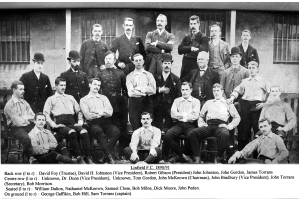 Linfield 1890-1893: Tom Gordon, Willie Gordon, Sam Torrans, Tim Morrison, Thanny McKeown, Bob Milne, Sam Johnston, Richard Moore, Rab Torrans, Tom Torrans, John Peden, Robert Hill, Martin Turley, George Gaffikin, William Dalton
Linfield 1890-1893: Tom Gordon, Willie Gordon, Sam Torrans, Tim Morrison, Thanny McKeown, Bob Milne, Sam Johnston, Richard Moore, Rab Torrans, Tom Torrans, John Peden, Robert Hill, Martin Turley, George Gaffikin, William Dalton
Manager: Selected by committee
Achievements: Irish League champions 1890-91, 1891-92, 1892-93; Irish Cup winners 1890-91, 1891-92, 1892-93.
Key men: George Gaffikin, Inside right from Belfast who won 15 caps for Ireland amateurs. Was a founder member of Linfield and scored over 100 goals for the club. Jack Peden, left winger with a sharp eye for goal. Played 24 times for Ireland, scoring seven goals. Later played for Newton Heath and Sheffield United before enjoying a second spell with Linfield. Sam Torrans, one of the greats of 19th century Irish football. A versatile player who started out as a prolific forward but gradually became more comfortable as a full back. 26 caps for Ireland, he was the outstanding member of the Torrans family, which produced four footballers.
Perception: The first dominant team in the first years of the Irish League.
Liverpool 1921-1923:
 Elisha Scott, Ephraim Longworth, Tommy Lucas, Don McKinlay, Jock McNab, Walter Wadsworth, Tom Bromilow, Bill Lacey, Dick Forshaw, Dick Johnson, Harry Chambers, Danny Shone, Cyril Gilhesby, Harry Lewis, Fred Hopkin
Elisha Scott, Ephraim Longworth, Tommy Lucas, Don McKinlay, Jock McNab, Walter Wadsworth, Tom Bromilow, Bill Lacey, Dick Forshaw, Dick Johnson, Harry Chambers, Danny Shone, Cyril Gilhesby, Harry Lewis, Fred Hopkin
Achievement: Football League champions 1921-22 and 1922-23
Five-year record (1919-1924): 4 – 4 – 1 – 1 – 12
Manager: David Ashworth/ Matt McQueen
Key men: Elisha Scott, legendary goalkeeper, 31 Irish caps, great agility. Liverpool’s longest serving player; Harry Chambers, nicknamed “smiler”, powerful left foot and leading scorer; Don McKinlay, Scottish international full back. Tough player who spent 19 years with the club; Tom Bromilow, local lad and England international half back.
Perception: Fast-moving and consistent team built on a very strong defence. The best team in the immediate post WW1 years.
Liverpool 1963-1966:
 Tommy Lawrence, Gerry Byrne, Tommy Smith, Ron Yeats, Ronnie Moran, Chris Lawler, Geoff Strong, Ian Callaghan, Gordon Milne, Jimmy Melia, Willie Stevenson, Peter Thompson, Roger Hunt, Ian St. John, Alf Arrowsmith.
Tommy Lawrence, Gerry Byrne, Tommy Smith, Ron Yeats, Ronnie Moran, Chris Lawler, Geoff Strong, Ian Callaghan, Gordon Milne, Jimmy Melia, Willie Stevenson, Peter Thompson, Roger Hunt, Ian St. John, Alf Arrowsmith.
Achievement: Football League champions 1963-64 and 1965-66; FA Cup winners 1964-65; European Cup-Winners’ Cup finalists 1965-66.
Five-year record (1962-1967): 8 – 1 – 7 – 1 – 5
Manager: Bill Shankly
Key men: Ron Yeats, strong centre half and skipper. Tough and outstanding in the air. Scottish international, 2 caps, he was a formidable opponent; Roger Hunt, quick, strong and skilful goalscorer (244 goals for the club) and a member of the England 1966 World Cup winners; Ian St. John, strong and tricky forward, great in the air. 21 caps for Scotland.
Perception: Shankly’s first successful Liverpool squad, a combination of hard-work, power and skill.
Ray Clemence, Phil Neal, Joey Jones, Emlyn Hughes, Tommy Smith, Phil Thompson, Alan Hansen, Alan Kennedy, Ray Kennedy, Jimmy Case, Peter Cormack, Graeme Souness, Ian Callaghan, Terry McDermott, Kevin Keegan, Kenny Dalglish, John Toshack, Steve Heighway, David Fairclough, David Johnson.
Achievement: Football League champions 1975-76, 1976-77, 1978-79; UEFA Cup winners 1975-76; European Cup winners 1976-77, 1977-78.
Five-year record: 2 – 1 – 1 – 2 – 1
Manager: Bob Paisley
Key men: Kevin Keegan, one of the outstanding English players of the mid-1970s, a busy, tireless forward, good in the air, despite his size. Won 63 caps for England, scoring 21 goals. Joined Hamburg for £ 500,000 in 1977; Kenny Dalglish, Keegan’s replacement, signed from Celtic for £ 440,000. A natural goalscorer, no small measure of skill. Won over 100 caps for Scotland; Ray Clemence, towering goalkeeper who won 61 caps for England. Good positional sense and quick reflexes; Graeme Souness, uncompromising midfielder but skilful. Joined from Middlesbrough for £ 350,000.
Perception: Machine-like at times, but powerful, brilliant and intelligent.
 Liverpool 1985-86 to 1987-88: Bruce Grobbelaar, Steve Nicol, Gary Ablett, Jim Beglin, Glenn Hysen, Alan Hansen, Mark Lawrenson, Barry Venison, Ronnie Whelan, Kevin MacDonald, Steve McMahon, Ray Houghton, Jan Mølby, Nigel Spackman, Craig Johnston, John Barnes, Peter Beardsley, Ian Rush, John Aldridge, Paul Walsh
Liverpool 1985-86 to 1987-88: Bruce Grobbelaar, Steve Nicol, Gary Ablett, Jim Beglin, Glenn Hysen, Alan Hansen, Mark Lawrenson, Barry Venison, Ronnie Whelan, Kevin MacDonald, Steve McMahon, Ray Houghton, Jan Mølby, Nigel Spackman, Craig Johnston, John Barnes, Peter Beardsley, Ian Rush, John Aldridge, Paul Walsh
Manager: Kenny Dalglish
Achievements: Football League champions 1985-86, 1987-88, 1989-90; FA Cup winners 1985-86, 1988-89.
Five-year league record (1985-86 to 1989-90): 1 – 2 – 1 – 2 – 1
Key men: John Barnes, wonderfully talented winger who joined Liverpool from Watford for £ 900,000. Won 79 England caps and played in two World Cups. Capable of moments of brilliance, from superbly-taken goals to mazy dribbles. Peter Beardsley skilful forward who was signed from Newcastle for close to £ 2 million in the same summer as Barnes. Won 59 caps for England, playing in both the 1986 and 1990 World Cups. Enjoyed a second spell with Newcastle in the mid-1990s. Ian Rush one of the great goalscorers of all time, Rush netted 346 goals in 660 games for Liverpool. Had a short spell playing with Juventus but returned after one season to Liverpool. Won 73 caps for Wales, scoring 28 goals.
Perception: An exciting combination that added flair and individual brilliance to a tried and tested system. The last phase of Liverpool’s golden era and one of England’s great club sides.
M
 Magdeburg 1973-1975: Ulrich Schulze, Klaus Decker, Manfred Zapf, Axel Tyll, Wolfgang Abraham, Detlef Enge, Jürgen Pommerenke, Helmut Gaube, Wolfgang Seguin, Detlef Raugust, Jürgen Sparwasser, Martin Hoffmann, Siegmund Mewes, Bodo Sommer, Hans-Jürgen Hermann.
Magdeburg 1973-1975: Ulrich Schulze, Klaus Decker, Manfred Zapf, Axel Tyll, Wolfgang Abraham, Detlef Enge, Jürgen Pommerenke, Helmut Gaube, Wolfgang Seguin, Detlef Raugust, Jürgen Sparwasser, Martin Hoffmann, Siegmund Mewes, Bodo Sommer, Hans-Jürgen Hermann.
Achievements: DDR Oberliga champions 1973-74 and 1974-75; European Cup-Winners’ Cup winners 1973-74
Manager: Heinz Krügel
Key men: Jürgen Pommerencke, young attacking midfielder who played in the 1972 Olympics and 1974 World Cup for East Germany and was named DDR player of the year in 1975. Won 53 caps for his country; Jürgen Sparwasser, forward who won 49 caps for DDR and made history with the winning goal in the 1974 World Cup against West Germany; Martin Hoffmann, striker who was a pivotal figure in DDR’s World Cup and Olympic 1976 team. 62 caps, 15 goals.
Perception: Functional but full of fitness, arguably the best team to come out of the DDR.
 Manchester City 1902-1905: Jack Hillman, Johnny McMahon, Herbert Burgess, Sammy Frost, Tommy Hynds, Sam Ashworth, Billy Meredith, George Livingstone, Billie Gillespie, Sandy Turnbull, Frank Booth, Lot Jones, John Edmondson, George Dorsett, Irvine Thornley.
Manchester City 1902-1905: Jack Hillman, Johnny McMahon, Herbert Burgess, Sammy Frost, Tommy Hynds, Sam Ashworth, Billy Meredith, George Livingstone, Billie Gillespie, Sandy Turnbull, Frank Booth, Lot Jones, John Edmondson, George Dorsett, Irvine Thornley.
Manager: Tom Maley
Achievements: 1902-03 – Football League Division Two champions; 1903-04 FA Cup winners, Football League Division One runners-up.
Five year record (1901-02 to 1905-06): 18 – 1 – 2 – 3 – 5
Key men: Billy Meredith – Iconic winger who won 48 Welsh caps. A winger with superb balance and agility, capable of excellent crosses and long-range shooting; Billie Gillespie – Bustling centre forward who scored 126 goals in 218 league games for City; Sandy Turnbull – Scottish inside forward who played for City and United. Also banned during the bribery scandal. Died in the first world war in Arras.
Perception: A team of individuals who went close to winning the double in 1904. Exciting but occasionally haphazard combination of players.
 Manchester City 1967-1970: Harry Dowd, Ken Mulhearn, Joe Corrigan, Glyn Pardoe, David Connor, Tony Book, George Heslop, Tommy Booth, Mike Doyle, Alan Oakes, Mike Summerbee, Colin Bell, Neil Young, Tony Coleman, Francis Lee, Ian Bowyer, Tony Towers.
Manchester City 1967-1970: Harry Dowd, Ken Mulhearn, Joe Corrigan, Glyn Pardoe, David Connor, Tony Book, George Heslop, Tommy Booth, Mike Doyle, Alan Oakes, Mike Summerbee, Colin Bell, Neil Young, Tony Coleman, Francis Lee, Ian Bowyer, Tony Towers.
Manager: Joe Mercer
Achievements: Football League champions 1967-68, FA Cup winners 1968-69, Football League Cup winners 1969-70, European Cup-Winners’ Cup winners 1969-70.
Five-year record (1967-68 to 1971-72): 1 – 13 -10 – 11- 4
Key men: Colin Bell – High energy midfielder known as “Nijinsky” after the race horse. Signed from Bury and became one of the most dynamic midfield players of the 1970s. England international, 48 caps; Francis Lee – Stocky striker who was tenacious and direct. Signed from Bolton Wanderers, he won 27 England caps. Scored 112 league goals in 249 games before joining Derby in 1974; Mike Summerbee – Fiery right winger who was signed from Swindon Town. Won eight England caps.
Perception: Exciting young team, managed by Mercer and coached by the innovative and often wayward Malcolm Allison. Attack-minded, with some exceptional individuals.
 Manchester City 2017-2019: Ederson, Kyle Walker, Danilo, Vincent Kompany, John Stones, Aymeric Laporte, Ilkay Gündogan, Nicolás Otamendi, Fabian Delph, Kevin De Bruyne, Bernardo Silva, David Silva, Riyad Mahrez, Fernandinho, Gabriel Jesus, Sergio Agüero, Leroy Sané, Raheem Sterling.
Manchester City 2017-2019: Ederson, Kyle Walker, Danilo, Vincent Kompany, John Stones, Aymeric Laporte, Ilkay Gündogan, Nicolás Otamendi, Fabian Delph, Kevin De Bruyne, Bernardo Silva, David Silva, Riyad Mahrez, Fernandinho, Gabriel Jesus, Sergio Agüero, Leroy Sané, Raheem Sterling.
Manager: Pep Guardiola
Achievements: Premier League champions 2017-18 and 2018-19, FA Cup winners 2018-19, Football League Cup winners 2017-18 and 2018-19.
Five-year record (2014-15 to 2018-18): 2 – 4 – 3 – 1 – 1
Key men: Kevin De Bruyne – Versatile midfielder who rose to prominence at Wolfsburg after an aborted spell at Chelsea. Signed for City in 2015 for £ 55 million and became a pivotal figure in the club’s success. 72 caps for Belgium; Raheem Sterling – Signed by City from Liverpool in 2015 for £ 44 million. A versatile player who can play as striker, winger or attacking midfielder; Sergio Agüero – World-class striker, prolific goalscorer with a high level of tactical intelligence.
Perception: Outstanding footballing team built by wealthy owners, combining ruthless efficiency with individual skill and rapier-like finishing.
 Manchester United 1907-1911: Harry Moger, Hugh Edmonds, Vince Hayes, George Stacey, Alex Bell, Alex Downie, Dick Duckworth, Charlie Roberts, Jimmy Bannister, Harold Halse, Billy Meredith, Jack Picken, Jimmy Turnbull, George Wall, Enoch West, Herbert Burgess, Thomas Homer, Anthony Donnelly, George Livingstone.
Manchester United 1907-1911: Harry Moger, Hugh Edmonds, Vince Hayes, George Stacey, Alex Bell, Alex Downie, Dick Duckworth, Charlie Roberts, Jimmy Bannister, Harold Halse, Billy Meredith, Jack Picken, Jimmy Turnbull, George Wall, Enoch West, Herbert Burgess, Thomas Homer, Anthony Donnelly, George Livingstone.
Manager: Ernest Magnall
Achievement: Football League champions 1907-08 and 1910-11; FA Cup winners 1908-09.
Five-year record (1907-08-1911-12): 1 – 13 – 5 – 1 – 13
Key men: Billy Meredith, Welsh international winger, controversial figure who played with a toothpick in his mouth. Played 300 games for each of the Manchester clubs; Sandy Turnbull, bustling forward who died during WW1. Involved in scandals that led to him being banned from football; Charlie Roberts, strong and skilful centre half who was capped by England. Both he and Meredith were instrumental in establishing the players’ union.
Perception: Highly-skilled and expensive team packed with characters.
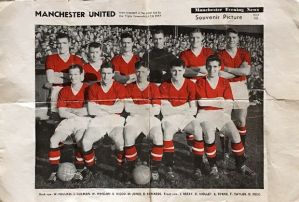 Manchester United 1955-1958: Ray Wood, Harry Gregg, Roger Byrne, Bill Foulkes, Jackie Blanchflower, Eddie Colman, Duncan Edwards, Mark Jones, Johnny Berry, David Pegg, Tommy Taylor, Dennis Viollet, Colin Webster, Billy Whelan, Bobby Charlton, John Doherty.
Manchester United 1955-1958: Ray Wood, Harry Gregg, Roger Byrne, Bill Foulkes, Jackie Blanchflower, Eddie Colman, Duncan Edwards, Mark Jones, Johnny Berry, David Pegg, Tommy Taylor, Dennis Viollet, Colin Webster, Billy Whelan, Bobby Charlton, John Doherty.
Manager: Matt Busby
Achievement: Football League Champions 1955-56 and 1956-57; FA Cup finalists 1956-57 and 1957-58.
Five-year record (1953-54 – 1957-58): 4 – 5 – 1 – 1 – 9
Key men: Duncan Edwards, strong, physical, versatile and high on stamina. A defensive midfielder who could dominate games. Tragically dies after the Munich air crash, aged just 21; Roger Byrne, captain of the United team, a defender who became one of the first attacking full backs. Won 33 caps for England but also died in Munich in 1958; Eddie Colman, the youngest of the “Busby Babes” to die in the Munich disaster, his trademark was his body swerve, which earned him the nickname, “Snakehips”; Tommy Taylor, strong centre forward signed from Barnsley for £ 29,999 who scored 137 goals in 237 games for United. Won 19 caps for England, scoring 16 goals. Another player who died in Munich.
 Manchester United 1966-1968: Alex Stepney, Tony Dunne, Bobby Noble, David Sadler, Pat Crerard, John Aston, David Herd, Denis Law, Bobby Charlton, Shay Brennan, Nobby Stiles, George Best, Brian Kidd, Francis Burns, Bill Foulkes.
Manchester United 1966-1968: Alex Stepney, Tony Dunne, Bobby Noble, David Sadler, Pat Crerard, John Aston, David Herd, Denis Law, Bobby Charlton, Shay Brennan, Nobby Stiles, George Best, Brian Kidd, Francis Burns, Bill Foulkes.
Manager: Matt Busby
Achievement: Football League champions 1966-67, European Cup winners 1967-68. Five-year record (1964-65 to 1968-69): 1 – 4 – 1 – 2 – 11
Key men: George Best, Northern Ireland international winger, 37 caps, who was one of the great players from the late 1960s and early 1970s. A wonderful, flawed genius of a performer, his off-pitch life brought an end to his relatively unfulfilled career. A great dribbler, improviser and goalscorer, he died sadly young at 59. Bobby Charlton, one of England’s greatest players who lived through the Munich air disaster of 1958 and eight years later, won the World Cup with England, for whom he won 106 caps and scored 49 goals. Gave his name to fierce, long-range shooting, the “Bobby Charlton thunderbolt”. Denis Law,won 55 caps for Scotland, scoring 30 goals, and in his club career, scored 303 times in just over 600 games. A legendary figure, acrobatic, competitive and tenacious. He had a short spell with Torino from whom he joined United in 1962. Ended his international career in the 1974 World Cup.
Perception: An exciting team, built around the triumvirate of Best, Charlton and Law. A hard act to follow for the club. Busby’s last great side.
 Manchester United 1993-94: Peter Schmeichel, Denis Irwin, Paul Parker, Steve Bruce, Gary Pallister, Lee Sharpe, Andrei Kanchelskis, Ryan Giggs, Paul Ince, Roy Keane, Brian McClair, Eric Cantona, Mark Hughes.
Manchester United 1993-94: Peter Schmeichel, Denis Irwin, Paul Parker, Steve Bruce, Gary Pallister, Lee Sharpe, Andrei Kanchelskis, Ryan Giggs, Paul Ince, Roy Keane, Brian McClair, Eric Cantona, Mark Hughes.
Manager: Sir Alex Ferguson
Achievement: Premier League champions 1993-94, FA Cup winners 1993-94, Football League Cup finalists 1993-94. Five-year record (1991-92 to 1995-96): 2 – 1 – 1 – 2 – 1
Key men: Peter Schmeichel, Danish goalkeeper who joined United in 1991 from Brøndby for £ 500,000. Won 129 caps for Denmark, including the successful 1992 European Championship. An imposing and very physical keeper, an all-time great. Eric Cantona, French forward, an iconic figure who was as controversial as he was skilful. Joined United in 1992 from Leeds for a bargain £ 1 million. Won 45 caps for France. Retired at 31 in 1997 after scoring 82 goals in 185 games for the club. Ryan Giggs, one of United’s great clubmen, playing 963 games in a career that saw him become one of the most decorated players in English football. Welsh international, he won 64 caps.
Perception: A very dynamic team, one of the first multi-national sides in English football.
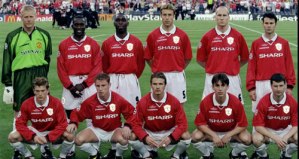 Manchester United 1998-99: Peter Schmeichel, Gary Neville, Philip Neville, Denis Irwin, Ronnie Johnsen, Japp Stam, Nicky Butt, Roy Keane, Paul Scholes, David Beckham, Andy Cole, Teddy Sheringham, Dwight Yorke, Jesper Blomquist, Ole Gunnar Solskjaer, Ryan Giggs.
Manchester United 1998-99: Peter Schmeichel, Gary Neville, Philip Neville, Denis Irwin, Ronnie Johnsen, Japp Stam, Nicky Butt, Roy Keane, Paul Scholes, David Beckham, Andy Cole, Teddy Sheringham, Dwight Yorke, Jesper Blomquist, Ole Gunnar Solskjaer, Ryan Giggs.
Manager: Sir Alex Ferguson
Achievement: Premier League champions 1998-99 (and 1999-00 and 2000-01); FA Cup winners 1998-99; UEFA Champions League winners 1998-99. Five-year record (1996-97to 2000-01): 1 – 2 – 1 – 1 – 1
Key men: Dwight Yorke, Trinidad & Tobago-born striker who joined United from Aston Villa for £ 12.6 million. A fast and tricky player, he scored 29 goals in 1998-99. Jaap Stam, Dutch central defender who won 67 caps for his country. Joined United from PSV Eindhoven in 1998, he combined strength and spped with an ability to read the game well. Gary Neville, one of England’s great full backs, a tenacious, hard-tackling defender. Born in Bury, he won 85 caps for England. Roy Keane,captain of the treble winning team, a hard man who was very, and occasionally too, competitive. Joined from Nottingham Forest for £ 3.75 million, he won 67 caps for the Republic of Ireland.
Perception: A brilliant and exciting side who refused to give up. Arguably the best of Sir Alex Ferguson’s United teams.
 Mexico 1997-1999: Jorge Campos, Salvador Carmona, Rafael Márquez, Claudio Suárez, Germán Villa, Pável Pardo, Miguel Zepeda, Ramon Ramirez, Cuauhtémoc Blanco, José Manuel Abunois, Francisco Palencia, Isaac Terrazas, Jésus Avellano, Luis Hernández, Rafael Garcia.
Mexico 1997-1999: Jorge Campos, Salvador Carmona, Rafael Márquez, Claudio Suárez, Germán Villa, Pável Pardo, Miguel Zepeda, Ramon Ramirez, Cuauhtémoc Blanco, José Manuel Abunois, Francisco Palencia, Isaac Terrazas, Jésus Avellano, Luis Hernández, Rafael Garcia.
Manager: Manuel Lapuente
Achievements: FIFA Confederations Cup winners 1999; Copa America semi-finalists 1997 and 1999; CONCACAF Gold Cup winners 1996 and 1998; World Cup 1998 last 16.
Key men: Jorge Campos – eccentric goalkeeper who acted in the role of sweeper-keeper. Relatively small for his position, he was well organised, agile and highly athletic; Rafael Márquez, regarded as the best defender in Mexican football history, versatile and durable, his career lasted 22 years and included 200-plus games with Barcelona and 147 caps for his country; Luis Hernández, long-haired striker known as El Matador, he enjoyed a 25-year career that included stints in the US and Argentina.
Perception: A team that included some outstanding players who took advantage of host status to win the Confederations Cup in 1999, beating Brazil in the final.
N
 Nacional 1971: Manga, Luis Ubiña, Atilio Ancheta, Juan Masnik, Juan C Blanco, Julio Montero Castillo, Victor Espáraggo, Ildo Maneiro, Luis Cubilla, Luis Artime, Julio Morales, Ignacio Prieto, Juan Mammelli, Rubén Bareño.
Nacional 1971: Manga, Luis Ubiña, Atilio Ancheta, Juan Masnik, Juan C Blanco, Julio Montero Castillo, Victor Espáraggo, Ildo Maneiro, Luis Cubilla, Luis Artime, Julio Morales, Ignacio Prieto, Juan Mammelli, Rubén Bareño.
Achievement: Copa Libertadores winners 1971; Uruguayan champions 1969, 1970, 1971, 197
Manager: Zezé Moreira
Key men: Luis Cubilla, winger who played in three World Cups for Uruguay. Also played for Peñarol, River Plate and Barcelona in Spain. Won 38 caps for Uruguay and later had a good managerial career; Luis Artime, Argentinian prolific scorer, scored 24 goals in 25 internationals. Clubs also included River Plate, Palmeiras, Fluminense and Independiente; Victor Espárrago, midfielder who won 67 caps for Uruguay. Also played for Sevilla.
Perception: Hard, well organised team.
 Northern Ireland 1982: Pat Jennings, Jimmy Nicholl, Chris Nicholl, John McClelland, Mal Donaghy, Martin O’Neill, Sammy McIlroy, David McCreery, Norman Whiteside, Gerry Armstrong, Billy Hamilton, Jim Platt, Sammy Nelson.
Northern Ireland 1982: Pat Jennings, Jimmy Nicholl, Chris Nicholl, John McClelland, Mal Donaghy, Martin O’Neill, Sammy McIlroy, David McCreery, Norman Whiteside, Gerry Armstrong, Billy Hamilton, Jim Platt, Sammy Nelson.
Achievement: World Cup second stage 1982; British Home Championship winners 1980 and 1984.
Manager: Billy Bingham
Key men: Martin O’Neill, busy midfielder who was part of Nottingham Forest’s European Cup winners in the late 1970s. Won 64 caps for Northern Ireland over 13 years; Norman Whiteside, broke Pelé’s record as the youngest player to appear in the World Cup (17 years, 41 days), and won 38 caps for NI. Injury forced him to retire at just 26; Billy Hamilton, striker who scored twice in the 1982 World Cup finals. Won 41 caps.
Perception: Workmanlike team who put 100% into every game at the 1982 World Cup.
 Napoli 1987- 1990: Claudio Garella, Giuliano Giuliai, Giuseppe Bruscolotti, Ciro Ferrara, Salvatore Bagni, Moreno Ferrario, Alessandro Renica, Andrea Carnevale, Fernando De Napoli, Bruno Giordano, Diego Maradona, Francesco Romano, Giuseppe Volpecina, Luigi Caffarelli, Luciano Sola, Massimo Crippa, Giovanni Francini, Careca, Alemao, Marco Baroni, Luca Fusi, Masimo Mauro, Giafranco Zola, Giancarlo Corradini.
Napoli 1987- 1990: Claudio Garella, Giuliano Giuliai, Giuseppe Bruscolotti, Ciro Ferrara, Salvatore Bagni, Moreno Ferrario, Alessandro Renica, Andrea Carnevale, Fernando De Napoli, Bruno Giordano, Diego Maradona, Francesco Romano, Giuseppe Volpecina, Luigi Caffarelli, Luciano Sola, Massimo Crippa, Giovanni Francini, Careca, Alemao, Marco Baroni, Luca Fusi, Masimo Mauro, Giafranco Zola, Giancarlo Corradini.
Manager: Ottavio Bianchi
Achievement: Serie A winners 1986-87 and 1989-90; UEFA Cup winners 1988-89; Coppa Italia winners 1987-87.
Key men: Diego Maradona, legendary Argentinian who joined Napoli from Barcelona in 1984 and won the World Cup with his country in 1986. Sublime skill, huge personality, massive idol with the fans. Career also laced with scandal and controversy. Died sadly young in 2020; Careca, joined Napoli from São Paulo and became one of the great Brazilian strikers. Fast and prolific; Fernando De Napoli, versatile Italian midfielder, tenacious and combative. 54 caps for Italy; Andrea Carnevale, journeyman striker who won 10 caps for Italy. Joined from Udinese in 1986.
Perception: A team driven on the back of Maradona and all the emotion, intrigue and drama that went with it.
 Newcastle United 1904-1907: Jimmy Lawrence, Andy McCombie, Jack Carr, Alex Gardner, Andy Aitken, Peter McWilliam, Jock Rutherford, James Howie, Bill Appleyard, Colin Veitch, Bert Gosnell, Bill McCracken, Ronald Orr, Harry Brown, Finlay Speedie.
Newcastle United 1904-1907: Jimmy Lawrence, Andy McCombie, Jack Carr, Alex Gardner, Andy Aitken, Peter McWilliam, Jock Rutherford, James Howie, Bill Appleyard, Colin Veitch, Bert Gosnell, Bill McCracken, Ronald Orr, Harry Brown, Finlay Speedie.
Manager: Frank Watt
Achievement: Football League champions 1904-05, 1906-07; FA Cup finalists 1904-05, 1905-06.
Five year record (1903-04 to 1907-08): 4 -1 – 4 – 1 -4
Perception: In a golden era for Newcastle, this talented team went close to achieving the double. A team full of talent, they were formidable at home.
Key men: Colin Veitch: A man of all talents who enjoyed a long career with Newcastle United (322 league games). Able to play at half back or inside forward, he was capped six times by England; Jimmy Lawrence: Scottish goalkeeper who spent 18 years with Newcastle after joining in 1904. A marvellously consistent keeper, he played almost 500 games for the club; James Howie: A tricky inside forward with a peculiar running style, considered to be a “brainy” footballer by the press. Tall and difficult for defenders, he was an expert dribbler and won three caps for Scotland; Andy Aitken: Wing half and captain of Newcastle United and a popular figure who joined the club in 1895 from Ayr Parkhouse.
 Newcastle United 1926-27: Bill Wilson, Alf Maitland, Frank Hudspeth, Roddie MacKenzie, Charlie Spencer, Willie Gibson, Tommy Urwin, Bob Clark, Bob McKay, Hughie Gallacher, Tom McDonald, Stan Seymour.
Newcastle United 1926-27: Bill Wilson, Alf Maitland, Frank Hudspeth, Roddie MacKenzie, Charlie Spencer, Willie Gibson, Tommy Urwin, Bob Clark, Bob McKay, Hughie Gallacher, Tom McDonald, Stan Seymour.
Manager (unofficial): Frank Watt, who took charge of the team for over 1,200 games (win rate 45.49%) between 1892 and 1929. Won four league titles (the last 1926-27) and two FA Cups. Was not actually responsible for picking the team, that was the role of a selection committee.
Key men: Stan Seymour, winger/forward indelibly linked with the Newcastle United story, as a player and manager. A fine player ranked one of the club’s greatest, who was signed from Greenock Morton. Won one England cap during WW2. Hughie Gallacher, centre forward signed from Aidrie in 1925, a fiery, brilliant player whose life was often complicated. Scored 39 goals in 1926-27 and in 160 league games for Newcastle scored 133 times. Won 20 Scottish caps, scoring 24 goals. Left for Chelsea in 1930. Frank Hudspeth, a reliable left back who was known as “old surefoot” and scored 25 penalties for the club. Won a single England cap but played 472 league caps for Newcastle.
Achievements: Football League champions 1926-27.
Five-year league placings (1924-25 to 1928-29): 6 -10 – 1 – 9 -1
Perception: A free scoring team (98 goals in 42 league games) with outstanding individuals.
 Newcastle United 1931-32: Albert McInroy, Jimmy Nelson, David Fairhurst, Roddie Mackenzie, Dave Davidson, Sam Weaver, Jimmy Boyd, Jimmy Richardson, Jack Allen, Harry McMenemy, Tommy Lang.
Newcastle United 1931-32: Albert McInroy, Jimmy Nelson, David Fairhurst, Roddie Mackenzie, Dave Davidson, Sam Weaver, Jimmy Boyd, Jimmy Richardson, Jack Allen, Harry McMenemy, Tommy Lang.
Manager: Andy Cunningham
Achievement: FA Cup winners 1932.
Five year league placings (1929-20 to 1933-34): 19 – 17 -11 – 5 – 21R
Key men: Jack Allen, scored twice in the 1932 FA Cup final against Arsenal. Former Sheffield Wednesday winger who won two league titles in 1929 and 1930. Jimmy Richardson, forward signed from Blyth Spartans. Won two England caps and later played for Huddersfield, Millwall and Orient.
Sam Weaver, aggressive half back whose throw-ins could reach up to 35 yards. Won three England caps and also played for Chelsea.
Perception: Took a lot of effort to win the Cup against 1931 league champions. A team that was in decline, relegated two years later.
 Newcastle United 1950-1955: Jack Fairbrother, Ronnie Simpson, Bobby Cowell, Bobby Corbett, Joe Harvey, Tommy Walker, Frank Brennan, Charlie Crowe, Ernie Taylor, Jimmy Scouler, Bob Stokoe, Ron Batty, Jackie Milburn, George Robledo, Bobby Mitchell, Alf McMichael, Ted Robledo, Tom Casey, Len White, Vic Keeble, George Hannah, Billy Foulkes.
Newcastle United 1950-1955: Jack Fairbrother, Ronnie Simpson, Bobby Cowell, Bobby Corbett, Joe Harvey, Tommy Walker, Frank Brennan, Charlie Crowe, Ernie Taylor, Jimmy Scouler, Bob Stokoe, Ron Batty, Jackie Milburn, George Robledo, Bobby Mitchell, Alf McMichael, Ted Robledo, Tom Casey, Len White, Vic Keeble, George Hannah, Billy Foulkes.
Manager: Stan Seymour until 1954, Doug Livingstone from 1954-1956.
Key men: Jackie Milburn, Ashington-born forward who possessed speed and excellent aerial ability. Prolific scorer, netting 201 goals in 399 games for Newcastle. Won 13 England caps, scoring 10 times. Bobby Mitchell, Scottish left-winger who won international caps and featured in all three of the FA Cup wins. Signed from Third Lanark. Joe Harvey, Newcastle’s longest serving captain and manager (1962-1975). Half back who joined from Bradford City in 1945 and became very popular with Newcastle supporters. Tommy Walker, a centre half who never got the credit he deserved and was unlucky not to have won an England cap.
Achievements: FA Cup winners 1950-51, 1951-52 and 1954-55.
Five-year league placings (1950-51 to 1954-55): 4 – 8 – 16 – 15 – 8
Perception: Excellent cup-fighting side, but too inconsistent to make much headway in the league.
 Newcastle United 1968-69: Iam McFaul, David Craig, Frank Clark, Tommy Gibb, Ollie Burton, Bobby Moncur, Jim Scott, Bryan Robson, Wyn Davies, Preben Arentoft, Jackie Sinclair, Alan Foggon.
Newcastle United 1968-69: Iam McFaul, David Craig, Frank Clark, Tommy Gibb, Ollie Burton, Bobby Moncur, Jim Scott, Bryan Robson, Wyn Davies, Preben Arentoft, Jackie Sinclair, Alan Foggon.
Manager: Joe Harvey
Achievement: Inter-Cities’ Fairs Cup winners 1968-69.
Key men: Wyn Davies, tall Welsh international forward, good in the air. A much travelled player who won 34 caps for Wales; Iam McFaul, Coleraine-born goalkeeper signed from Linfield. A sound keeper who was limited to a handful of caps for Northern Ireland due to the presence of Pat Jennings; Bobby Moncur, Scottish left half who scored three goals in the two Fairs Cup final games. Captain of the team.
Perception: Workmanlike team with some outstanding individuals. Beat some very strong opposition on the way to winning the Fairs Cup including 1970 European Cup winners Feyenoord, Glasgow Rangers, Sporting Lisbon and Ujpest.
 New York Cosmos 1977- 1978: Shep Messing, Jack Brand, Bobby Smith, Bob Iarusci, Werner Roth, Giuseppe Wilson, Carlos Alberto, Nelsi Morais, Terry Garbett, Vladislav Bogievic, Franz Beckenbauser, Dennis Tueart, Tony Field, Pelé, Giorgio Chinaglia, Steve Hunt, Seninho, Vitro Dimitrijevic, Erol Yasin.
New York Cosmos 1977- 1978: Shep Messing, Jack Brand, Bobby Smith, Bob Iarusci, Werner Roth, Giuseppe Wilson, Carlos Alberto, Nelsi Morais, Terry Garbett, Vladislav Bogievic, Franz Beckenbauser, Dennis Tueart, Tony Field, Pelé, Giorgio Chinaglia, Steve Hunt, Seninho, Vitro Dimitrijevic, Erol Yasin.
Manager: Eddie Firmani
Achievement: NASL Soccer Bowl winners 1977, 1978
Key men: Steve Hunt, speedy winger who revitalised his career in the US before returning to England, winning two caps for his country. A powerful shot from long distance; Franz Beckenbauer, legendary West Germany captain who won the World Cup as a player and manager; one of the original liberos; Giorgio Chinaglia, Italian international striker who had a very physical style. Top scorer in the NASL for four consecutive seasons 1978- 1981.
Perception: Star-studded team that briefly made the NASL an attractive proposition.
 Newell’s Old Boys 1992: Norberto Scoponi, Gustavo Raggio, Fernando Gamboa, Mauricio Pochettino, Julio Saldaña, Alfredo Berti, Gerardo Martinoi, Eduardo Berizzo, Julio Alberto Zamora, Ricardo Lunari, Alfredo Mendoza, Christian Domizzi, Fabián Gartagnoli, Juan Manuel Llop.
Newell’s Old Boys 1992: Norberto Scoponi, Gustavo Raggio, Fernando Gamboa, Mauricio Pochettino, Julio Saldaña, Alfredo Berti, Gerardo Martinoi, Eduardo Berizzo, Julio Alberto Zamora, Ricardo Lunari, Alfredo Mendoza, Christian Domizzi, Fabián Gartagnoli, Juan Manuel Llop.
Manager: Marcelo Bielsa
Achievement: Argentina Primeira division Clausura winners 1992; Copa Libertadores runners-up 1992.
Key men: Gerardo Martimo, attacking midfielder capped by Argentina, named best player of all-time in a poll by Newell’s fans; Mauricio Pochettino, centre back who won six caps for Argentina and spent six years with the club before moving to Spain with Espanyol. Enjoyed a fruitful period in management at Tottenham.
Perception: Fast-paced and intense team coached by Bielsa.
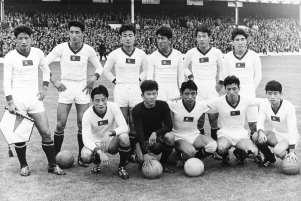 North Korea 1966: Li Chan-myung, Lim Zoong-sun, Shin Yung-kyoo, Ha Jung-won, Oh Yoon-Kyung, Pak Seung-zin, Im Seung-hwi, Han Bong-zin, Pak Doo-ik, Li Dong-woon, Yang Seung-kook, Pak Li-sup, Kang Bong-chil, Kang Ryong-woon, Kim seung-il.
North Korea 1966: Li Chan-myung, Lim Zoong-sun, Shin Yung-kyoo, Ha Jung-won, Oh Yoon-Kyung, Pak Seung-zin, Im Seung-hwi, Han Bong-zin, Pak Doo-ik, Li Dong-woon, Yang Seung-kook, Pak Li-sup, Kang Bong-chil, Kang Ryong-woon, Kim seung-il.
Manager: Myung Rye-hyun
Achievements: World Cup quarter-finalists 1966
Key men: Pak Doo-ik, born 1936 in Pyongyang, he became part of World Cup folklore by scoring NK’s winning goal against Italy at Ayresome Park, Middlesbrough, knocking the highly-fancied Italians out of the competition. An army corporal at the time, he was promoted to sergeant after the World Cup and became a gymnastics instructor following his army career. Capped just five times by North Korea. Pak Seung-zin, Morabang Sports striker, born in Wonsan in 1941. He became the first Asian to score in the World Cup finals, netting twice in the 1966 competition. Shin Yung-kyoo, defender who captained his club (Morabang) and country, a solid performer.
Perception: An unknown quantity before the World Cup, they pulled off a major shock in beating Italy and were very unfortunate to bump into Eusébio in the quarter-finals after going 3-0 up inside 25 minutes at Goodison Park against Portugal. Never forgotten.
 Nottingham Forest 1977-1990: Peter Shilton, Chris Woods, Colin Barrett, Viv Anderson, Kenny Burns, Larry Lloyd, David Needham, Archie Gemmill, Martin O’Neill, John McGovern, John Robertson, Ian Bowyer, Gary Mills, Tony Woodcock, Peter Withe, Trevor Francis, John O’Hare, Garry Birtles.
Nottingham Forest 1977-1990: Peter Shilton, Chris Woods, Colin Barrett, Viv Anderson, Kenny Burns, Larry Lloyd, David Needham, Archie Gemmill, Martin O’Neill, John McGovern, John Robertson, Ian Bowyer, Gary Mills, Tony Woodcock, Peter Withe, Trevor Francis, John O’Hare, Garry Birtles.
Manager: Brian Clough
Achievement: Football League champions 1977-78; Football League Cup winners 1977-78, 1978-79; European Cup winners 1978-79, 1979-80.
Key men: Peter Shilton, one of the all-time great goalkeepers. Signed from Stoke in 1977 and was vital in Forest’s glorious run. Excellent shot stopper, great positional sense. Won 125 caps for England; Kenny Burns, converted to defence from forward by Brian Clough, losing his “bad boy” image in the process. FWA and PFA player of the year in 1978; John Robertson, Scottish winger who was transformed by Clough, becoming one of the best creators of goals in Europe. “The Picasso of our game,” said Clough; Trevor Francis, Britain’s first £ 1 million player, signed from Birmingham. Highly-skilled forward who scored the winner in the 1979 European Cup final. Stayed only briefly with Forest, leaving in 1981.
Perception: Wonderful team moulded by Clough and his number two, Peter Taylor. Functional at times, but capable of brilliant and strategic football. Underrated.
 Nottingham Forest 1966-67: Peter Grummitt, Peter Hindley, John Winfield, Terry Hennessey, Bobby McKinley, Henry Newton, Alan Hinton, John Barnwell, Joe Baker, Frank Wignall, Ian Storey-Moore, Colin Addison.
Nottingham Forest 1966-67: Peter Grummitt, Peter Hindley, John Winfield, Terry Hennessey, Bobby McKinley, Henry Newton, Alan Hinton, John Barnwell, Joe Baker, Frank Wignall, Ian Storey-Moore, Colin Addison.
Manager: Johnny Carey
Achievement: Football League runners-up 1966-67, FA Cup semi-finalists 1966-67.
Key men: Ian Storey-Moore, elegant forward, skilful and sharp in front of goal. Scored 25 goals in 1966-67 and went on to win one England cap. Joined Manchester United in March 1972 for £ 225,000 but his career was hampered by injuries; Alan Hinton, winger with a fierce shot, capped three times by England. Moved to Derby in 1967; Terry Hennessey, Welsh international defender who was signed from Birmingham in 1965. Versatile player who could line-up in midfield. He captained Forest before moving to Derby in 1970.
Perception: Talented team who went so close to glory in 1966-67.
 Nottingham Forest 1958-59: Charlie Thomson, Bill Whare, Joe McDonald, Jeff Whitefoot, Bobby McKinlay, Jack Burkitt, Roy Dwight, Johnny Quigley, Tommy Wilson, Billy Gray, Stewart Imlach.
Nottingham Forest 1958-59: Charlie Thomson, Bill Whare, Joe McDonald, Jeff Whitefoot, Bobby McKinlay, Jack Burkitt, Roy Dwight, Johnny Quigley, Tommy Wilson, Billy Gray, Stewart Imlach.
Manager: Billy Walker
Achievement: FA Cup winners 1958-59
Key men: Tommy Wilson, versatile forward who scored in the 1959 final. Happy to play on the wing or at centre forward, he spent almost a decade with Forest; Stewart Imlach, Scottish international winger, four caps, who was a much travelled player but never forgotten by his hometown, Lossiemouth, who named a street after him.
Perception: Workmanlike team who were no more than a mid-table outfit.
 Nottingham Forest 1897-98: Dan Allsop, Archie Ritchie, Adam Scott, Frank Forman, John McPherson, Willie Wragg, Tom McInnes, Charlie Richards, Len Benbow, Arthur Capes, Alf Spouncer.
Nottingham Forest 1897-98: Dan Allsop, Archie Ritchie, Adam Scott, Frank Forman, John McPherson, Willie Wragg, Tom McInnes, Charlie Richards, Len Benbow, Arthur Capes, Alf Spouncer.
Manager: Harry Hallam (club secretary)
Achievement: FA Cup winners 1897-98
Key men: Arthur Capes, skilful inside forward who won one England cap and scored twice in Forest’s 3-1 win over Derby in the cup final; Alf Spouncer, capped once by England, a speedy winger who later managed Barcelona.
Perception: One of the first teams to adopt the 2-3-5 formation. Well-drilled side who rode their luck at times.
O
 Olimpia, Ascunción 1979: Hugo Almeida, Roberto Paredes, Rubén Jiménez, Alicio Solalinde, Carlos Kiese, Miguel Piazza, Evaristo Isasi, Luis Ernesto Torres, Enrique Villalba, Hugo Talavera, Osvaldo Aquino, Jorge Guasch, Rigello Delgado.
Olimpia, Ascunción 1979: Hugo Almeida, Roberto Paredes, Rubén Jiménez, Alicio Solalinde, Carlos Kiese, Miguel Piazza, Evaristo Isasi, Luis Ernesto Torres, Enrique Villalba, Hugo Talavera, Osvaldo Aquino, Jorge Guasch, Rigello Delgado.
Manager: Luis Cubilla
Achievement: Copa Libertadores winners 1979; Paraguayan Division One winners 1978, 1979, 1980, 1981, 1982; Intercontinental Cup winners 1979; Copa InterAmerica winners 1979.
Key men: Ever Hugo Almeida, Uruguayan-born goalkeeper who excelled at saving penalties. Won 22 caps for Paraguay; Carlos Kiese, tough defensive midfielder, much travelled and played in Brazil, Argentina and. Bolivia; Evaristo Isasi, fast striker who possessed brilliant dribbling skills.
Perception: Well organised side who demonstrated their defensive prowess in the Copa Libertadores final against Boca Juniors.
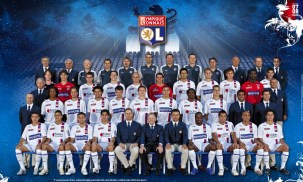 Olympique Lyonnais 2007-08: Gregory Coupet, Anthony Réveilleire, Sébastien Squillaci, Fabio Grosso, Sidney Govou, Jéremy Toulalan, Juninho Pernamucano, Kim Kallström, Fred, Karim Benzema, Kader Keita, Mathieu Bodmer, Francois Clerc, Rémy Vercoutre, Hatem Ben Arfa.
Olympique Lyonnais 2007-08: Gregory Coupet, Anthony Réveilleire, Sébastien Squillaci, Fabio Grosso, Sidney Govou, Jéremy Toulalan, Juninho Pernamucano, Kim Kallström, Fred, Karim Benzema, Kader Keita, Mathieu Bodmer, Francois Clerc, Rémy Vercoutre, Hatem Ben Arfa.
Manager: Alain Perrin
Achievement: Ligue 1 winners 2005-06, 2006-07 and 2007-08; Coupe de France winners 2007-08.
Key men: Karim Benzema, Lyon-born of Algerian descent, hard-working striker with superb aerial ability, subsequently starred for Real Madrid. Ligue 1 top scorer in 2008; Juninho Pernambucano, Brazilian midfielder signed from Vasco da Gama, dead ball specialist whop spent eight years with Lyon.
Perception: Outstanding hard-working team who completed seven consecutive league titles in 2008.
 Olympique Marseille 1990-1993: Pascal Olmeta, Fabien Barthez, Manuel Amoros, Eric Di Meco, Basile Boli, Carlos Mozer, Bruno Germain, Bernard Casoni, Franck Sauzée, Marcel Desailly, Jocelyn Angloma, Jean-Jacques Eydelie, Chris Waddle, Trevor Steven, Didier Deschamps, Laurent Fournier, Abedi Pele, Jean-Pierre Papin, Rudi Völler, Alen Bokšić, Marc Libbra, Philippe Vercruyse, Dragan Stojković.
Olympique Marseille 1990-1993: Pascal Olmeta, Fabien Barthez, Manuel Amoros, Eric Di Meco, Basile Boli, Carlos Mozer, Bruno Germain, Bernard Casoni, Franck Sauzée, Marcel Desailly, Jocelyn Angloma, Jean-Jacques Eydelie, Chris Waddle, Trevor Steven, Didier Deschamps, Laurent Fournier, Abedi Pele, Jean-Pierre Papin, Rudi Völler, Alen Bokšić, Marc Libbra, Philippe Vercruyse, Dragan Stojković.
Manager: Raymond Goethals
Achievement: Ligue 1 winners 1989-90, 1990-91, 1991-92, 1992-93 (stripped of title); European Cup runners-up 1990-91; Champions League winners 1992-93.
Key men: Jean-Pierre Papin, lethal and fast striker, specialising in volleys. 300-plus goals in 540 games in his career. Ballon d’Or winner in 1991; Didier Deschamps, French midfielder with over 100 caps who won the World Cup as both player and manager; Basile Boli, Ivory Coast-born defender who won 45 caps for France, scored winner in 1993 Champions League final; Abedi Pele, Ghanaian forward who was named African Footballer of the Year three times and the African player of the 20th century by IFHSS. Speedy with excellent close control and dribbling skills.
Perception: Expensive teams constructed during the Bernard Tapie era at OM. Exciting talent assembled to combat the top Italian and Spanish sides of the era, laced with controversy such as match-fixing scandal that saw them stripped of 1993 French title.
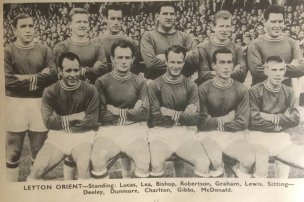 Orient 1962-63: Mike Pinner, Bill Robertson, Sid Bishop, Stan Charlton, Cyril Lea, Mal Lucas, Terry McDonald, Gordon Bolland, Billy Taylor, Norma Deeley, Dave Dunmore, Derek Gibbs, Malcolm Graham, Malcolm Musgrove, Eddie Lewis.
Orient 1962-63: Mike Pinner, Bill Robertson, Sid Bishop, Stan Charlton, Cyril Lea, Mal Lucas, Terry McDonald, Gordon Bolland, Billy Taylor, Norma Deeley, Dave Dunmore, Derek Gibbs, Malcolm Graham, Malcolm Musgrove, Eddie Lewis.
Manager: Johnny Carey
Achievement: Promotion to first division 1962.
Key men: Dave Dunmore, former Tottenham and West Ham striker who was signed by Orient in 1961 and ended up top scorer in their only first division campaign in 1962-63. Scored 131 Football League goals in his career, that also included two spells with York City. Stan Charlton, skippered the team in 1962-63 at the age of 33. Played amateur football with Bromley where he won amateur caps for England. A steady right back, he later played for Arsenal and returned to Orient for a second spell, playing a total of almost 500 league games in his career.
Perception: Shocked the football world by winning promotion, hard-working, industrious team.
 Orlando Pirates 1995: Willy Okpara, Edward Motali, Mark Fish, Gavin Lane, Bruce Ramokadi, Jerry Sikhhosana, Marks Maponyane, Helmen Mkhalele, Brendan Silent, Phiri Tsotetsi, John Moeti, Oumisa Ngobe, Innocent Mcwango, Marc Bachelor, Vincent Sokhela.
Orlando Pirates 1995: Willy Okpara, Edward Motali, Mark Fish, Gavin Lane, Bruce Ramokadi, Jerry Sikhhosana, Marks Maponyane, Helmen Mkhalele, Brendan Silent, Phiri Tsotetsi, John Moeti, Oumisa Ngobe, Innocent Mcwango, Marc Bachelor, Vincent Sokhela.
Manager: Joe Frickleton/ Ronald Mkhandawine
Achievement: South African National League Champions 1994; CAF Champions League winners 1995; Nedbank Cup winners 1996.
Key men: Gavin Lane, imposing defender known as the “stability unit”, also played for Giant Blackpool and Moroka Swallows; Mark Fish, impressive defender who also appeared for Lazio, Bolton and Charlton, winning 62 caps for South Africa; Edward Motale, strong defender who captained the team in the final of the Champions League and also featured in South Africa’s African Cup of Nations victory in 1996.
Perception: Solid team with reliable defence that kept six clean sheets in their 10 Champions League games. Had three coaches during the season.
P
 Peñarol 1960 – 1961: Luis Maidana, William Martinez, Salvador, Santiago Pino, Néstor Gonçalves, Walter Aguerre, Luis Cubilla, Carlos Abel Linazza, Alberto Spencer, Júpiter Crescio, Carlos Borges, José Mario Griecco, Núber Cano, Edguardo González, Roberto Matosas, José Sasía, Juan Joya, Ernesto Ledesma.
Peñarol 1960 – 1961: Luis Maidana, William Martinez, Salvador, Santiago Pino, Néstor Gonçalves, Walter Aguerre, Luis Cubilla, Carlos Abel Linazza, Alberto Spencer, Júpiter Crescio, Carlos Borges, José Mario Griecco, Núber Cano, Edguardo González, Roberto Matosas, José Sasía, Juan Joya, Ernesto Ledesma.
Manager: Roberto Scarone
Achievements: Copa Libertadores 1960, 1961; Uruguayan Primera Division champions 1960, 1961; Intercontinental Cup winners 1961.
Five year league record: 1 – 1 – 1- 1- 1
Key men: Alberto Spencer, Ecuadorian born striker who was prolific in the Copa Libertadores. Score well over 300 goals for Peñarol in more than 500 games. Known as Cabeza Magica (magic head) due to his aerial ability; Luis Cubilla, played in three World Cups for Uruguay, winning a total of 38 caps. A fast and tenacious winger; Néstor Gonçalves, defensive midfielder who appeared more than 600 times for the club. Won 50 caps for Uruguay, including two World Cups.
Perception: A tough, determined team that dominated Uruguayan football and also recognised the importance of the Copa Libertadores in its nascent years.
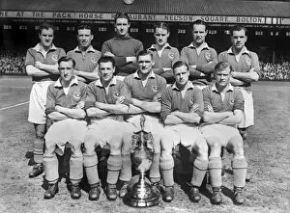 Portsmouth 1948-50: Ernie Butler, Harry Ferrier, Billy Hindmarsh, Phil Rookes, Jimmy Dickinson, Reg Flewin, Jimmy Scouler, Bill Spence, Peter Harris, Len Phillips, Duggie Reid, Ike Clarke, Bert Barlow, Reg Pickett, Jack Froggatt.
Portsmouth 1948-50: Ernie Butler, Harry Ferrier, Billy Hindmarsh, Phil Rookes, Jimmy Dickinson, Reg Flewin, Jimmy Scouler, Bill Spence, Peter Harris, Len Phillips, Duggie Reid, Ike Clarke, Bert Barlow, Reg Pickett, Jack Froggatt.
Manager: Bob Jackson
Achievements: Football League champions 1948-49, 1949-50. FA Cup semi-finalists, 1948-49.
Five-year FL record (1947-48 to 1951-52): 8 – 1 – 1 – 7 – 4
Key men: Jimmy Dickinson, long-serving wing half who played 828 games for Pompey. A dependable figure, known as “Gentleman Jim”, he was capped 48 times by England, including the 1950 World Cup. Jack Froggatt, left winger who won 13 caps for England. A stocky, robust player, renowned for his pace and excellent ball control. He played 279 games for Portsmouth. Affectionately known as “Jolly Jack”. Len Phillips, former Royal Marine, an inside forward who made 245 league appearances for the club, scoring 48 goals. He spent a decade at Portsmouth before moving into non-league football. Won three caps for England. Jimmy Scouler, Scottish international wing half (nine caps), who also played for Newcastle United and Bradford Park Avenue. A tough tackler with plenty of stamina, he was also a fine passer of the ball.
Perception: Good footballing team with some outstanding individuals.
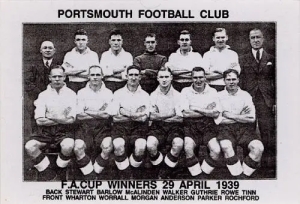 Portsmouth 1938-39: Harry Walker, Lew Morgan, Bill Rochford, Jimmy Guthrie, Tommy Rowe, Guy Wharton, Fred Worrall, Jimmy McAlinden, John Anderson, Bert Barlow, Cliff Parker.
Portsmouth 1938-39: Harry Walker, Lew Morgan, Bill Rochford, Jimmy Guthrie, Tommy Rowe, Guy Wharton, Fred Worrall, Jimmy McAlinden, John Anderson, Bert Barlow, Cliff Parker.
Manager: Jack Tinn
Achievement: FA Cup winners 1938-39
Key men: Jimmy Guthrie, half back who joined Portsmouth from Dundee for a £ 4,000 fee. He played 94 times for Portsmouth, captaining them to the FA Cup in 1939. Sadly, his career was hampered by a car crash and the second world war, although he did play after 1945. Became a pivotal figure in the players’ union. Bert Barlow, former Wolves inside forward who scored at Wembley against his old club in the cup final. Was still playing when Pompey won the first of their league titles in 1948-49.
Perception: Underdogs who beat Wolves 4-1 in the last FA Cup final before WW2.
 Preston North End 1888-1890: James Trainer, Robert Holmes, Bob Howarth, Johnny Graham, Sandy Robertson, David Russell, George Drummond, Fred Dewhurst, Sam Thomson, Jimmy Ross, Jack Gordon, John Goodall, Nick Ross, Bob Kelso, Robert Mills-Roberts.
Preston North End 1888-1890: James Trainer, Robert Holmes, Bob Howarth, Johnny Graham, Sandy Robertson, David Russell, George Drummond, Fred Dewhurst, Sam Thomson, Jimmy Ross, Jack Gordon, John Goodall, Nick Ross, Bob Kelso, Robert Mills-Roberts.
Manager: Selection committee and E.H. Bahr.
Achievements: Football League champions 1888-89 and 1889-90; FA Cup winners 1888-89; FA Cup finalists 1887-88.
Five-year placings: 1 – 1- 2 – 2 – 2
Key men: John Goodall, Centre forward who was signed from Great Lever after playing in Scotland with Kilmarnock Athletic. Won 14 England caps, scoring 12 goals. Moved to Derby Coiunty in 1889. Jimmy Ross, nippy Edinburgh-born inside forward who was signed from St. Bernard’s and stayed with PNE from 1883-1894 when he joined Liverpool. Scored 102 goals in 152 games for Preston. Bob Howarth, powerful and formidable full back who was born in Preston. Won four England caps and later played for Everton, whom he joined in 1891.
Perception: Experts at playing the “Scottish style” football, built around the passing game. The first “invincibles”, unbeaten in the 1888-89 campaign.
 Preston North End 1937-38: George Holdcroft, Frank Gallimore, Andy Beattie, Bill Shankly, Tom Smith, Bob Batey, Dickie Watmough, George Mutch, Bud Maxwell, Bobby Beattie, Hugh O’Donnell.
Preston North End 1937-38: George Holdcroft, Frank Gallimore, Andy Beattie, Bill Shankly, Tom Smith, Bob Batey, Dickie Watmough, George Mutch, Bud Maxwell, Bobby Beattie, Hugh O’Donnell.
Manager: James Taylor
Achievement: FA Cup winners 1937-38.
Five-year placings: 7 – 14 – 3 – 9 – 7
Key men: Bill Shankly, legendary manager of Liverpool, but a hard-running and gritty half back for Preston. Signed from Carlisle United in 1933 and finished playing in 1949. Won seven Scotland caps. George Mutch, inside forward who scored the winning goal in the FA Cup final. Won a single cap for Scotland. Joined from Manchester United. Andy Beattie, joined PNE in 1935 from Inverurie Loco Works and went on to win seven caps for Scotland. Career was interrupted by WW2 and finished playing in 1947. Became Scotland’s first manager.
Perception: Workmanlike team with some skilful players. Too inconsistent to challenge for the league.
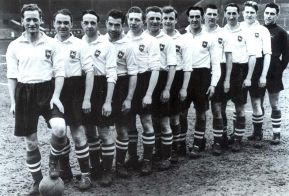 Preston North End 1952-53: George Thompson, Willie Cunningham, Bill Scott, Tommy Docherty, Joe Marston, Willie Forbes, Tom Finney, Derek Lewis, Charlie Wayman, Jimmy Baxter, Angus Morrison, Joe Walton, Joe Dunn, Bobby Beattie, Bobby Foster.
Preston North End 1952-53: George Thompson, Willie Cunningham, Bill Scott, Tommy Docherty, Joe Marston, Willie Forbes, Tom Finney, Derek Lewis, Charlie Wayman, Jimmy Baxter, Angus Morrison, Joe Walton, Joe Dunn, Bobby Beattie, Bobby Foster.
Manager: Scot Symon
Achievements: Football League runners-up 1952-53; FA Cup finalists 1953-54.
Five-year placings: 1* – 7 – 2 – 11- 14
(*Promotion)
Key men: Tommy Docherty, robust half-back who won 25 caps for Scotland. Went on to have a lengthy managerial career, winning the FA Cup with Manchester United. Tom Finney, legendary player for Preston and England. A wonderfully skilful winger or centre forward, he won 76 caps for England and played 473 games for PNE, scoring 210 goals. One of the all-time greats. Charlie Wayman, centre forward who was top scorer in the 1952-53 season and netted 105 times in 157 games for PNE. Joined the club from Southampton.
Perception: A hard-working team inspired by the genius of Tom Finney.
Q
 Queens Park Rangers 1975-76: Phil Parkes, David Clement, Ian Gillard, John Hollins, Frank McClintock, David Webb, Dave Thomas, Gerry Francis, Don Givens, Stan Bowles, Don Masson, Mick Leach.
Queens Park Rangers 1975-76: Phil Parkes, David Clement, Ian Gillard, John Hollins, Frank McClintock, David Webb, Dave Thomas, Gerry Francis, Don Givens, Stan Bowles, Don Masson, Mick Leach.
Manager: Dave Sexton
Achievements: Football League runners-up 1975-76.
Five-year record (1973-74 to 1977-78): 8 – 11 – 2 -14 -19
Key men: Stan Bowles, skilful ball-playing midfielder/striker who was one of the outstanding players of his generation. Occasionally wayward, he should have won more than his five England caps; Gerry Francis, hard-running and driven midfielder who was plagued by injuries in his career. Controversially appointed captain of England by Don Revie, his fitness prevented him from winning more than 12 caps; Phil Parkes, imposing goalkeeper who was signed from Walsall in 1970 and went on to make over 400 appearances for the club. Won just one England cap.
Perception: A wonderful footballing team with a hint of total football about them. One of the best teams never to win the Football League championship.
 Queens Park Rangers 1966-67: Peter Springett, Tony Hazell, Jim Langley, Mike Keen, Ron Hunt, Frank Sibley, Mark Lazarus, Keith Sanderson, Les Allen, Rodney Marsh, Roger Morgan, Ian Morgan, Ian Watson, Bobby Keetch, Mike Kelly.
Queens Park Rangers 1966-67: Peter Springett, Tony Hazell, Jim Langley, Mike Keen, Ron Hunt, Frank Sibley, Mark Lazarus, Keith Sanderson, Les Allen, Rodney Marsh, Roger Morgan, Ian Morgan, Ian Watson, Bobby Keetch, Mike Kelly.
Manager: Alec Stock
Achievements: Football League Cup winners 1966-67.
Five-year record (1964-65 to 1968-69): 14* – 3* – 1* – 2** – 22
* League division 3, ** League division 2.
Key men: Rodney Marsh, a talented striker who was signed from Fulham and became a folk hero at QPR. Strong and competitive, he possessed great technical ability. Stayed with QPR until 1972 when he joined Manchester City. Won nine England caps; Les Allen, former Spurs striker who won the double in 1961. Joined QPR in July 1965 for £ 21,000. His experience was an important part of the club’s rise up to the first division.
Perception: Fine footballing team that shocked first division West Bromwich Albion in the first Wembley final of the Football League Cup.
R
 Racing Club de Avellaneda 1967: Agustin Cejas, Oscar Martin, Roberto Perfumo, Alfio Basile, Ruben Diaz, Juan Carlos Rulli, Miguel A Mori, João Cardoso, Humberto Maschio, Juan Carlos Cárdenas, Norberto Raffo, Fernando Parenti, Juan José Rodriguez.
Racing Club de Avellaneda 1967: Agustin Cejas, Oscar Martin, Roberto Perfumo, Alfio Basile, Ruben Diaz, Juan Carlos Rulli, Miguel A Mori, João Cardoso, Humberto Maschio, Juan Carlos Cárdenas, Norberto Raffo, Fernando Parenti, Juan José Rodriguez.
Manager: Juan José Pizutti
Achievement: Primera División 1966; Copa Libertadores winners 1967; Intercontinental Cup 1967.
Key men: Alfio Basile, formidable defender converted from midfield. Won eight caps for Argentina; Roberto Perfumo, one of Argentina’s greatest defenders and rated the best players in Racing’s 1966-1967 triumphs.
Perception: Robust team, difficult to beat, capable of intimidating the opposition.
 Racing Club Paris 1936: Rodolph Hiden, Francis Roux, Maurice Dupuis, Raoul Diagne, Maurice Banide, Henri Ozenne, Edmund Delfour, Auguste Jordan, Fred Kennedy, Robert Mercier, Émile Veinante, Roger Couard, Jules Mathé, Roland Schmidt, Jean Greateroux.
Racing Club Paris 1936: Rodolph Hiden, Francis Roux, Maurice Dupuis, Raoul Diagne, Maurice Banide, Henri Ozenne, Edmund Delfour, Auguste Jordan, Fred Kennedy, Robert Mercier, Émile Veinante, Roger Couard, Jules Mathé, Roland Schmidt, Jean Greateroux.
Manager: George Kimpton
Achievement: Ligue 1 champions 1935-36; Coupe de France winners 1935-36.
Key men: Edmund Delfour, tireless midfield player who played in three World Cups and received 41 caps for France; Émile Veinante, striker who enjoyed a successful coaching career. Won 24 caps; Auguste Jordan, Austrian-born midfielder who was known as “the baby from Linz”.
Perception: A team at the height of its powers, dominating French football.
 Rapid Vienna 1930: Josef Bugala, Roman Schramseis, Leopold Czejka, Karl Rappan, Josef Smistik, Johann Vana, Willibald Kirbes, Franz Weselik, Matthias Kaburek, Johann Luef, Ferdinand Wesely.
Rapid Vienna 1930: Josef Bugala, Roman Schramseis, Leopold Czejka, Karl Rappan, Josef Smistik, Johann Vana, Willibald Kirbes, Franz Weselik, Matthias Kaburek, Johann Luef, Ferdinand Wesely.
Manager: Edi Bauer
Achievement: Mitropa Cup winners 1930; Austrian champions 1929 and 1930.
Key men: Karl Rappan, Swiss born half back who had a profound influence on European football when he invented the so-called “bolt” that was a forerunner of catenaccio; Matthias Kuburek, bustling forward who won four caps for Austria and played one game for Germany; Ferdinand Wesely, winger who played 40 times for Austria and more than 200 times for Rapid.
Perception: Free-scoring team epitomising the Danbian style.
 Stade de Reims 1955-56 to 1958-59: Dominique Colonna, Rene-Jean Jacquet, Simon Zimny, Armand Penverne, Robert Siatka, Raoul Giraudo, Robert Jonquet, Bruno Rodzik, Robert Lamartine, Michel Hidalgo, Jean Vincent, Michel Leblond, Jean Templin, Léon Glowacki, René Bliard, Just Fontaine, Raymond Kopa, Roger Piantoni.
Stade de Reims 1955-56 to 1958-59: Dominique Colonna, Rene-Jean Jacquet, Simon Zimny, Armand Penverne, Robert Siatka, Raoul Giraudo, Robert Jonquet, Bruno Rodzik, Robert Lamartine, Michel Hidalgo, Jean Vincent, Michel Leblond, Jean Templin, Léon Glowacki, René Bliard, Just Fontaine, Raymond Kopa, Roger Piantoni.
Coach: Albert Batteux
Achievements: Ligue 1 champions 1954-55, 1957-58, 1959-60; Coupe de France winners 1957-58; European Cup finalists 1955-56, 1958-59.
Key men
Just Fontaine, Moroccan-born striker who made history by scoring 13 goals in the 1958 World Cup. Formerly with Nice and played in Casablanca prior to moving to France. Won 21 caps for France, scoring 30 goals. One of the all-time greats of French football. Raymond Kopa, another French great, won 45 caps and played in the 1958 World Cup, the year he won the Ballon d’Or. Joined Real Madrid in 1956 and won three European Cups with the Spanish club. Nicknamed “Little Napoleon”. Robert Jonquet, 58 caps for France, one of the great defenders of his time. Made almost 600 appearances for Reims.
Perception: An exciting team with powerful forwards, so unlucky to face Real Madrid in two European Cup finals. Possibly greatest French club side of all time.
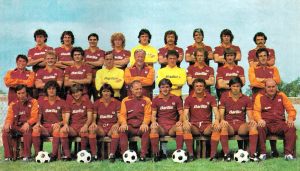 Roma 1982-1984: Franco Tancredi, Sebastian Nela, Pietro Vierchowod, Carlo Ancelotti, Paulo Falcao, Aldo Maldera, Bruno Conti, Herbert Prohaska, Roberto Pruzzo, Agostino Di Bartolomei, Maurizio Iorio, Odoacre Chierico, Michele Nappi.
Roma 1982-1984: Franco Tancredi, Sebastian Nela, Pietro Vierchowod, Carlo Ancelotti, Paulo Falcao, Aldo Maldera, Bruno Conti, Herbert Prohaska, Roberto Pruzzo, Agostino Di Bartolomei, Maurizio Iorio, Odoacre Chierico, Michele Nappi.
Manager: Nils Liedholm
Achievement: Serie A champions 1982-83; Coppa Italia winners 1983-84; European Cup finalists 1983-84.
Key men: Bruno Conti, left-footed winger who ranks among the finest produced by Italy. Played more than 300 games for Roma and won 47 caps; Paulo Falcão, brilliant and technical Brazilian midfielder, a deep-lying playmaker who possessed an ability to score with long-range shots; Roberto Pruzzo, ex-Genoa striker who was strong and hard-working, especially good in the air.
Perception: Skilful side who went so close to winning the European Cup, losing to Liverpool in the final on penalties.
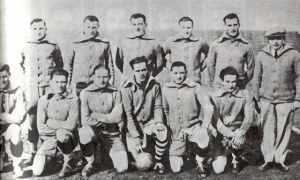 Romania 1929-1931: Alex Satmari, Nichita Rusen, Gheorghe Albu, Petre Steinbach, Gheorghe Muresanu, Andrei Glanzmann, Constantin Stanciu, Gratian Sepi, Iuliu Bodola, Elemer Kocsis, Rudolf Wetzer, Radu Niculescu.
Romania 1929-1931: Alex Satmari, Nichita Rusen, Gheorghe Albu, Petre Steinbach, Gheorghe Muresanu, Andrei Glanzmann, Constantin Stanciu, Gratian Sepi, Iuliu Bodola, Elemer Kocsis, Rudolf Wetzer, Radu Niculescu.
Manager: Costel Râdulescu
Achievement: Balkan Cup winners 1929-31.
Key men: Rudi Wetzer, captain and joint leading scorer in the Balkan Cup in 1929-31. Played for FC Juventus Bucharest and also represented Romania in the 1924 Olympics; Iuliu Bodola, prolific goalscorer for club (CA Oradea) and country. Also played for Hungary later in his career.
Perception: Rugged and determined team, underpinned by some skilful forwards.
S
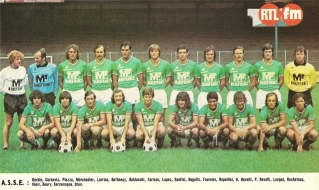 Saint-Étienne 1973-1977: Ivan Curkovic, Osvaldo Piazza, Gérard Janvion, Gérard Farison, Pierre Repellini, Alain Merchadier, Dominique Bathenay, Christian Synoeghel, Jean-Michel Larqué, Patrick Révelli, Jacques Santini, Dominique Rocheteau, Hervé Revelli, Christian Sarramagna, Jean-Marc Schaer, Georges Bereta.
Saint-Étienne 1973-1977: Ivan Curkovic, Osvaldo Piazza, Gérard Janvion, Gérard Farison, Pierre Repellini, Alain Merchadier, Dominique Bathenay, Christian Synoeghel, Jean-Michel Larqué, Patrick Révelli, Jacques Santini, Dominique Rocheteau, Hervé Revelli, Christian Sarramagna, Jean-Marc Schaer, Georges Bereta.
Manager: Robert Herbin
Achievements: Ligue 1 champions 1973-74, 1974-75, 1975-76; Coupe de France winners 1973-74, 1974-75, 1976-77; European Cup finalists 1975-76.
Key men: Dominique Bathenay, tall midfielder who won 20 caps for France between 1975 and 1982. Played 158 games in Ligue 1 for Saint-Étienne before joining Paris Saint-Germain. Hervé Revelli, striker who had two successful spells with the club. Played for France 30 times, scoring 15 goals. Won seven league titles with Saint-Étienne. Dominique Rocheteau, skilful winger, flamboyant and tricky for opponents to deal with. Nicknamed l’ange Vert (the green angel) by the club’s fans. He played in three World Cups and won 49 caps for France, scoring 15 goals. Later played for PSG and Toulouse. Gérard Janvion, Martinique-born defender who played over 300 games for the club. Was capped 40 times by France.
Perception: Combined good organisation with skill and determination. The first French side to capture the attention of overseas fans. Very unlucky not to have won the European Cup in 1976.
 Santos 1962 – 1963: Gilmar, Mauro Ramos, Calvet, Lima, Zito, Dalmo, Dorval, Mencálvio, Geraldino, Pagão, Coutinho, Pepe, Pelé.
Santos 1962 – 1963: Gilmar, Mauro Ramos, Calvet, Lima, Zito, Dalmo, Dorval, Mencálvio, Geraldino, Pagão, Coutinho, Pepe, Pelé.
Coach: Lula
Key men: Pelé – widely regarded as the greatest footballer of all time. Three World Cup winners’ medals make him unique, notably when he played a key role in Brazil’s 1958 and 1970 successes. A one-club man, although spent his last couple of years playing in the US with New York Cosmos. Wonderfully skilful, he became an iconic figure for football, for sport and for the plight of black athletes. Coutinho – made his debut at 13 and 11 months for Santos as a professional player. A clinical finisher, he scored over 400 goals in his career and formed a lethal partnership with Pelé. He won 15 caps for Brazil but injuries restricted his international career. Gilmar – One of the goalkeeping greats and a winner of two World Cups in his time with Brazil, for whom he won 94 caps. An excellent shot-stopper with superb reflexes.
Achievements: Brazilian Série A champions 1962, 1963; Campeanato Paulista champions 1962; Copa Libertadores winners 1962, 1963; Intercontinental Cup winners 1962, 1963.
Perception: One of the best sides to come out of Brazil in the 1960s. A team of skilful players, epitomising the spirit of Brazilian football at the time. Provided seven members of Brazil’s 1962 World Cup winning squad.
 Santos 2010 – 2011 : Rafael, Pará, Bruno Rodrigo, Durval, Alex Sandro, Arouca, Danilo, Adriano, Elano, Neymar, Zé Eduardo, Bruno Aguiar, Alan Patrick, Edu Dracena, Léo, Ganso, André.
Santos 2010 – 2011 : Rafael, Pará, Bruno Rodrigo, Durval, Alex Sandro, Arouca, Danilo, Adriano, Elano, Neymar, Zé Eduardo, Bruno Aguiar, Alan Patrick, Edu Dracena, Léo, Ganso, André.
Coach: Muricy Ramalho
Key men: Neymar – Talented and charismatic figure who never quite lived up to his billing as the new great hope of Brazilian football. Moved from Santos to Barcelona and then became one of the most expensive players of all time when he signed for Paris Saint-Germain. Arouca – Defensive midfielder who spent his career in Brazilian domestic football. Won four caps for Brazil. Danilo – Highly decorated defender who played for some of Europe’s top clubs, including Real Madrid, Porto, Manchester City and Juventus. Won 49 caps for Brazil.
Achievements: Copa do Brazil winners 2010; Campeonato Paulista winners 2010, 2011, 2012; Copa Libertadores winners 2011; Recopa Sudamericano 2012.
Perception: A team with some mercurial individuals – capable of brilliance, but also of inconsistency. Despite successful in cup competitions, were only a mid-table side in the league.
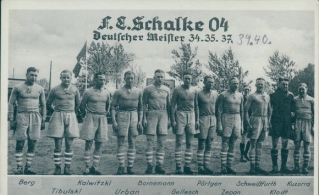 Schalke 04 1934-1939: Hans Klodt, Ernst Sontow, Hans Bornemann, Rudold Gellesch, Ötte Tilbuski, Walter Berg, Ernst Kalwitzki, Fritz Szepan, Ernst Poertgen, Ernst Kuzorra, Adolf Urban, Hermann Mellage, Hermann Nattkämper, Ferdinand Zajobs, Valentin Przybylski, Otto Schweisfurth, Hermann Eppenhoff.
Schalke 04 1934-1939: Hans Klodt, Ernst Sontow, Hans Bornemann, Rudold Gellesch, Ötte Tilbuski, Walter Berg, Ernst Kalwitzki, Fritz Szepan, Ernst Poertgen, Ernst Kuzorra, Adolf Urban, Hermann Mellage, Hermann Nattkämper, Ferdinand Zajobs, Valentin Przybylski, Otto Schweisfurth, Hermann Eppenhoff.
Coach: Hans Schmidt
Achievements: German champions 1934, 1935, 1937, 1939; German cup winners 1934
Key men: Fritz Szepan, playmaker forward who, despite a lack of pace, was highly skilled and influential. Scored 309 games in 434 games for Schalke, in a career that spanned 25 years, and won 34 caps for Germany. In 1938, he was named captain of the unified German team after “anchluss”. Adolf Urban, the son of Polish immigrants, Urban died during the Second World War in combat. As a footballer, he played 21 times for Germany and as well as playing in the 1936 Olympics was also a member of the Breslau Elf. Ernst Kuzorra, another forward who enjoyed a lengthy career with Schalke, from 1924 to 1949. Scored over 400 goals for the club and was capped 12 times by Germany. A very athletic and technical player.
Perception: As exponents of the so-called Schalker Kriesel (the spinning top), this team dominated German football before the Second World War thanks to their marvellous array of attacking talent.
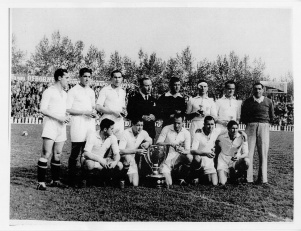 Sevilla 1945-46: José Busto, Joaquín Jiménez Postigo, Diego Villalonga, Pedro Alconero, Pedro Eguiluz, Félix Garcia, José Campos, Juan Arza, José Palacios Herrera, José López, Juan Araujo.
Sevilla 1945-46: José Busto, Joaquín Jiménez Postigo, Diego Villalonga, Pedro Alconero, Pedro Eguiluz, Félix Garcia, José Campos, Juan Arza, José Palacios Herrera, José López, Juan Araujo.
Manager: Ramón Encinas
Achievement: La Liga champions 1945-46
Key men: Juan Arza, stocky forward who was known as the “golden boy”. A powerful player who scored 182 goals in 349 games for Sevilla; José Campos, top scorer, fast and skilful; José López, a member of a forward line known as the “stuka”, a reference to a WW2 German fighter plane.
Perception: Surprise league champions.
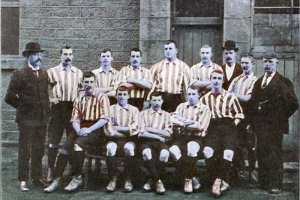 Sheffield United 1897-98 – 1901-02: Willie Foulke, Harry Thickett, Peter Boyle, Tom Morren, Ernest Needham, Rabi Howell, John Cunningham, Harry Johnson, Tom Morren, Billy Beer, George Hedley, Kenny McKay, Bob Cain, Jack Almond, Walter Bennett, Fred Priest, Bert Lipsham, Oakey Field, Alf Common.
Sheffield United 1897-98 – 1901-02: Willie Foulke, Harry Thickett, Peter Boyle, Tom Morren, Ernest Needham, Rabi Howell, John Cunningham, Harry Johnson, Tom Morren, Billy Beer, George Hedley, Kenny McKay, Bob Cain, Jack Almond, Walter Bennett, Fred Priest, Bert Lipsham, Oakey Field, Alf Common.
Manager: J.B. Wostinholm, John Nicholson
Achievements: Football League champions 1897-98, runners up 1899-00; FA Cup winners 1898-99, 1901-02, finalists 1900-01.
Key men: Willie Foulke, giant goalkeeper who was picked up playing for Blackwell Miners Welfare and went on to play over 300 games for Sheffield United. A larger-than-life character, he weighed over 136 kilograms and stood 6ft 10 inches in height. Won one England cap and when he departed in 1905, joined the infant Chelsea club. Harry Thickett, right back who was capped twice by England. Joined from Rotherham Town. A big, sturdy full back who was a hard tackler and also had a nice turn of pace. Ernest Needham, a legendary player from the late 19th century, Needham was an all-round sportsman and also played first-class cricket. He was capped 16 times by England and played 551 games for Sheffield United. He had great ball control and dribbling skills and possessed a fierce shot. Known as “Nudger” and “The Price of Half-Backs”. Captained club and country. Walter Bennett, a thick-set forward with a sharp eye for goal, Bennett was top scorer in United’s league title triumph and netted 59 goals in 195 league games. Played twice for England. Sadly died young in a mining accident in Denaby Main.
Perception: A team with some truly outstanding players, most of whom were internationals. Enjoyed an excellent run in which they were always challenging for honours.
 Spain 1964: José Angel Iribar, Feliciano Rivilla, Isacio Calleja, Ignacío Zoco, Ferran Olivella, Josep Maria Fustré, Carlos Lapetra, Luis Suárez, Marcelino Martinez, Jesús Maria Pereda, Amancio Amaro.
Spain 1964: José Angel Iribar, Feliciano Rivilla, Isacio Calleja, Ignacío Zoco, Ferran Olivella, Josep Maria Fustré, Carlos Lapetra, Luis Suárez, Marcelino Martinez, Jesús Maria Pereda, Amancio Amaro.
Manager: José Villalonga
Achievement: European Championship winners 1964, beating USSR in the final and before that, Romania, Northern Ireland and Republic of Ireland.
Key men: Jesús Maria Pereda, Barcelona midfielder who also played briefly for Real Madrid. Catalan-born players who won 15 caps for Spain. Had a very good eye for goal; Luis Suárez, Galician-born inside forward or attacking midfielder, an elegant player possessing an explosive shot. Starred for Barcelona and also played for Inter Milan and Sampdoria; Amancio, outside right who was known as El Brujo (the magician). Played 14 years with Real Madrid and won 42 caps for Spain.
Perception: Skilful but inconsistent team of individuals.
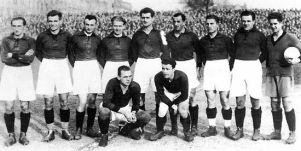 Sparta Prague 1927: František Hochmann, Antonin Hojer, Antonin Perner, Jaroslav Burgr, František Kolenaty, Jaroslav Červeny, Karel Pešek, Ferdinand Hajny, Josef Horejs, Josef Silny, Adolf Patek, Josef Sima, Josef Miclík.
Sparta Prague 1927: František Hochmann, Antonin Hojer, Antonin Perner, Jaroslav Burgr, František Kolenaty, Jaroslav Červeny, Karel Pešek, Ferdinand Hajny, Josef Horejs, Josef Silny, Adolf Patek, Josef Sima, Josef Miclík.
Manager: Václav Špindler
Achievements: Czechoslovak champions 1925-26, 1926-27; Mitropa Cup winners 1927.
Key men: Josef Silny, Forward who topped the Mitropa Cup scoring list in 1927 with five goals. Formerly with Slavia, he won 50 caps for Czechoslovakia, scoring 28 goals. Adolf Patek, Austrian forward, born in Vienna, who joined Sparta from Wiener SC. Karel Pešek, full back or half back who won 44 caps for Czechoslovakia. A very technical player who appeared in two Olympics.
Perception: The famous “Iron Sparta” team that was effective, tough and blunt.
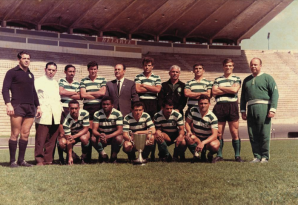 Sporting Lisbon 1961-1965: Joaquim Carvalho, Mário Lino, João Morais, António Morato, Hilário Conceição, José Péreides, Fernando Mendes, Figueiredo, Geo Carvalho, Hugo Sarmento, Diego Arizaga, Pedro Gomes, Jose Carlos Alexandra Baptista, Osvaldo da Silva, Mascarenhas, Fernando Peres, Lourenço, Ferreira Pinto, Oliveira Duarte.
Sporting Lisbon 1961-1965: Joaquim Carvalho, Mário Lino, João Morais, António Morato, Hilário Conceição, José Péreides, Fernando Mendes, Figueiredo, Geo Carvalho, Hugo Sarmento, Diego Arizaga, Pedro Gomes, Jose Carlos Alexandra Baptista, Osvaldo da Silva, Mascarenhas, Fernando Peres, Lourenço, Ferreira Pinto, Oliveira Duarte.
Manager/Coach: Juca
Achievement: Primeira Liga champions 1961-62, 1965-66; European Cup-Winners’ Cup winners 1963-64; Taca de Portugal winners 1962-63.
Key men: Joaquim Carvalho, consistent goalkeeper who played for 12 years for Sporting. Won six caps for Portugal and appeared briefly in the 1966 World Cup. Joäo Morais, versatile player who could play at full back or as a winger. As a defender, he was occasionally brutal, as seen in the 1966 World Cup. Ernesto Figueiredo, striker who netted 100 goals in 155 league games for Sporting. Spent eight years with the club.
Perception: An exciting team who had a golden period in the mid-1960s.
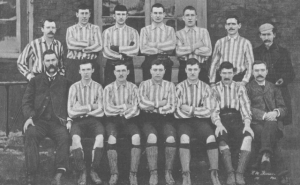 Sunderland 1891-1895: Ned Doig, Donald Gow, Tom Porteous, John Auld, John Murray, Will Gibson, Jimmy Hannah, Hughie Wilson, John Smith, Jimmy Miller, John Campbell, John Scott, David Hannah, Robert Smellie, John Harvey, James Gillespie, Billy Dunlop, Harry Johnston, Andy McCreadie, Peter Meehan.
Sunderland 1891-1895: Ned Doig, Donald Gow, Tom Porteous, John Auld, John Murray, Will Gibson, Jimmy Hannah, Hughie Wilson, John Smith, Jimmy Miller, John Campbell, John Scott, David Hannah, Robert Smellie, John Harvey, James Gillespie, Billy Dunlop, Harry Johnston, Andy McCreadie, Peter Meehan.
Manager: Tom Watson
Achievements: Football League champions 1891-92, 1892-93, 1894-95
Key men: Ned Doig, exceptional goalkeeper who played five times for Scotland. Formerly with Arbroath and Blackburn Rovers. He played 457 games for Sunderland before moving to Liverpool. Jimmy Hannah, Glasgow-born winger who played 151 games, scoring 69 goals for Sunderland. Won a single cap for Scotland and later played for Third Lanark and Queens Park Rangers. Jimmy Miller, forward who relied on skill on the ball rather than physical power. A Scottish international, he played 140 games for Sunderland and scored 83 goals. Sadly died young from tuberculosis. John Campbell, a prolific goalscorer who topped the league list in 1892, 1893 and 1895. Newcastle-born forward who netted 133 goals in 186 games.
Perception: The renowned “team of all the talents” who has strength in every department. One of the all-time great sides and a the force in the late 19th century.
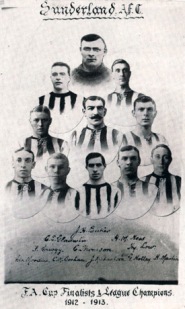 Sunderland 1912-13: Joe Butler, Charlie Gladwin, Harry Ness, Frank Cuggy, Charlie Thomson, Harry Low, Jackie Mordue, Charles Buchan, James Richardson, George Holly, Harry Martin, Tom Hall, Albert Milton.
Sunderland 1912-13: Joe Butler, Charlie Gladwin, Harry Ness, Frank Cuggy, Charlie Thomson, Harry Low, Jackie Mordue, Charles Buchan, James Richardson, George Holly, Harry Martin, Tom Hall, Albert Milton.
Manager: Bob Kyle
Achievements: Football League champions 1912-13, FA Cup finalists 2012-13
Key men: Frank Cuggy, right half whose career spanned either side of the first world war. A tough performer, he was capped twice by England and made 166 league appearances for Sunderland. He later worked in the Wearside shipyards and also had a brief spell coaching in Spain. Charlie B Thomson, Scottish centre half who played 21 times for his country. An athletic defender who was tenacious and known for his stamina. He was signed from Hearts and played 236 league games for Sunderland. Jackie Mordue, right winger who was signed from Woolwich Arsenal in 1908, costing £ 750. He was selected twice by England and played almost 300 games for Sunderland. An expert penalty taker. Charlie Buchan, a tall, elegant centre forward who was one of the leading players of his time. Capped six times by England, he played 411 games for Sunderland and scored 222 goals. Although approaching 34, Arsenal signed him in 1925, paying Sunderland £ 2,000. Later became a famous football writer and lent his name to the magazine, Football Monthly.
Perception: A talented team that was so unlucky not to win the coveted double.
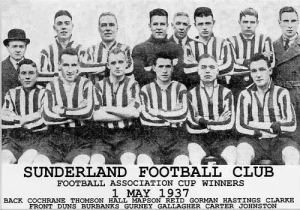 Sunderland 1935-1937: Jimmy Thorpe, Matt Middleton, Johnny Mapson, Tom Morrison, Alex Hall, Jimmy Gorman, Bill Murray, Alex Hastings, Charlie Thomson, Jimmy Clark, Bert Johnston, Sandy McNab, Bert Davis, Len Duns, Raich Carter, Bobby Gurney, Patsy Gallacher, Eddie Burbanks, Jimmy Connor, George Collin.
Sunderland 1935-1937: Jimmy Thorpe, Matt Middleton, Johnny Mapson, Tom Morrison, Alex Hall, Jimmy Gorman, Bill Murray, Alex Hastings, Charlie Thomson, Jimmy Clark, Bert Johnston, Sandy McNab, Bert Davis, Len Duns, Raich Carter, Bobby Gurney, Patsy Gallacher, Eddie Burbanks, Jimmy Connor, George Collin.
Manager: Johnny Cochrane
Achievements: Football League champions 1935-36, FA Cup winners 1936-37.
Key men: Raich Carter, legendary inside forward born in Sunderland. Played 278 games for Sunderland, scoring 128 goals. Won 13 caps for England and possibly should have played more times for his country. Allergic to coaching, he was something of a wayward spirit and the driving force for Sunderland’s mid-1930s success. Alex Hastings, left half who captained the team and played over 300 games for Sunderland. Capped twice by Scotland, he began his career with Stenhousemuir. Bobby Gurney, picked up from amateur club Bishop Auckland. A talented forward, he scored 228 goals in 290 games for Sunderland and remains the club’s record scorer. Capped once by England.
Perception: A team run by Carter who did enough to push Arsenal, the team of the 1930s, into the shadows for a while.
T
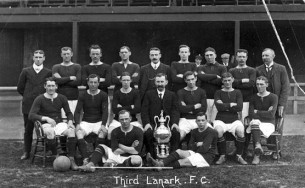 Third Lanark 1903-1906: Jimmy Raeside, Robert Barr, William McIntosh, David Hill, Tom Sloan, John Cross, Hughie Wilson, Jimmy Simpson, John Neilson, James Comrie, William Wardrope, David Munro, Jack Kidd, Willie Reid, Robert Graham, Tom McKenzie.
Third Lanark 1903-1906: Jimmy Raeside, Robert Barr, William McIntosh, David Hill, Tom Sloan, John Cross, Hughie Wilson, Jimmy Simpson, John Neilson, James Comrie, William Wardrope, David Munro, Jack Kidd, Willie Reid, Robert Graham, Tom McKenzie.
Manager: J. Campbell
Achievements: Scottish League champions 1903-04, Scottish Cup winners 1904-05, Scottish Cup finalists 1905-06.
Key men: Robert Barr, often underrated right back who was once a member of the Black Watch regiment. Made 300 appearances for Third Lanark. A tenacious player, he represented the Glasgow FA on a number of occasions. Tom McKenzie, skilful centre forward who spent three years with Third Lanark after joining from Petershill. Also played for Sunderland, Plymouth and Portsmouth, among others. Hughie Wilson, a fine player who could line-up as wing half or inside forward. Made over 400 appearances in a long career, including 136 games for Third Lanark.
Perception: A tough team, well disciplined.
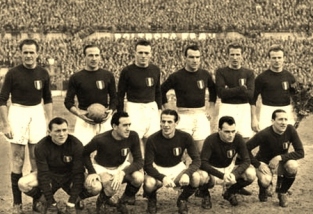 Torino 1944-49: Valerio Bacigalupo, Aldo Ballarin, Virgilio Maroso, Eusebio Castigliano, Mario Rigamonti, Danilo Martelli, Giuseppe Grezar, Gugliemo Gabetto, Valentino Mazzola, Franco Ossolo, Romeo Menti, Sauro Toma, Ezio Loik, Pietro Ferraris, Iosif Fabian, Francesco Rosetta, Sergio Piacentini, Alfonso Santagiuliana.
Torino 1944-49: Valerio Bacigalupo, Aldo Ballarin, Virgilio Maroso, Eusebio Castigliano, Mario Rigamonti, Danilo Martelli, Giuseppe Grezar, Gugliemo Gabetto, Valentino Mazzola, Franco Ossolo, Romeo Menti, Sauro Toma, Ezio Loik, Pietro Ferraris, Iosif Fabian, Francesco Rosetta, Sergio Piacentini, Alfonso Santagiuliana.
Manager: Leslie Lievesley, Mario Sperone, Luigi Ferrero.
Achievements: Serie A champions 1945-46, 1946-47, 1947-48, 1948-49
Key men: Valerio Bacigalupo+, one of the great goalkeepers of his time – strong, very athletic and one of the first to venture out of his area. Signed from Genoa and a pivotal figure in the success of Grande Torino. Won five caps for Italy. Aldo Ballarin+ a tough defender who was an uncompromising tackler and very good in the air. He was also capable of accelerating with the ball, a trait from his time as a winger. Played nine times for Italy. Valentino Mazzola+, father of Sandro Mazzola, a star in the 1960s with Inter. A versatile, hard-working forward/midfielder who was quick and strong and possessed superb dribbling skills. Signed from Venezia, capped 12 times by Italy. Gugliemo Gabetto+, another outstanding forward who was among the finest of his era. Played for Juventus before signing for Torino for a big fee. A creative and very technical player who had pace and excellent close ball control. Scored 122 goals in 219 league games for the club. Won six caps for Italy.
Perception: The legendary Grande Torino side that perished in the Superga air crash. Wonderfully skilful, disciplined and, for a long time, unbeatable. +Died at Superga.
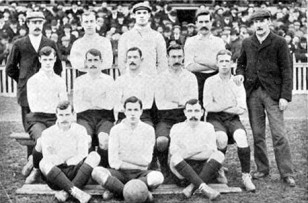 Tottenham Hotspur 1901: George Clawley, Harry Erentz, Sandy Tait, Tom Morris, Jack Jones, Tom Smith, John Cameron, Sandy Brown, Davie Copeland, Jack Kirwan, Ted Hughes.
Tottenham Hotspur 1901: George Clawley, Harry Erentz, Sandy Tait, Tom Morris, Jack Jones, Tom Smith, John Cameron, Sandy Brown, Davie Copeland, Jack Kirwan, Ted Hughes.
Manager: John Cameron (player-manager)
Achievement: Southern League champions 1899-00; FA Cup winners 1900-01
Key men: Sandy Brown, Scottish forward who won a single cap for his country. A prolific goalscorer, he was nicknamed “the Glenbuck goalgetter” and scored 64 goals in 84 games for Spurs before leaving in 1902; Sandy Tait, full back who played over 200 games for Spurs. He possessed an excellent football brain and positional sense. Nicknamed “terrible Tait” owing to his ferocious tackling; John Cameron, Glasgow-born forward who played once for Scotland. Joined from Everton and was later an accomplished journalist. He worked in Germany and was interned during the first world war in Germany.
Perception: A skilful Southern League team that shocked Sheffield United in the FA Cup final of 1901.
 Tottenham Hotspur 1951: Ted Ditchburn, Alf Ramsey, Arthur Willis, Bill Nicholson, Harry Clarke, Ronnie Burgess, Sonny Walters, Peter Murphy, Alex Wright, Len Duquemin, Eddie Baily, Les Medley, Les Bennett.
Tottenham Hotspur 1951: Ted Ditchburn, Alf Ramsey, Arthur Willis, Bill Nicholson, Harry Clarke, Ronnie Burgess, Sonny Walters, Peter Murphy, Alex Wright, Len Duquemin, Eddie Baily, Les Medley, Les Bennett.
Manager: Arthur Rowe
Achievement: Second Division champions 1949-50; Football League champions 1950-51
Key men: Ted Ditchburn, brave and muscular goalkeeper who won six caps for England. He was responsible for the goalkeeper’s “short throw” which proved instrumental in Spurs’ success of 1951; Ronnie Burgess, Welsh international half-back (32 caps) and skipper of Spurs. Spent 15 years with the club; Alf Ramsey, better known for leading England to the World Cup in 1966, but also won 32 caps for his country. A full back, many felt he was too slow but he had an intelligent grasp on tactics; Sonny Walters, leading scorer in the title-winning year, a fast winger who not only scored frequently, but also created plenty of goals for his team-mates.
Perception: The famed “push and run” side of Arthur Rowe that introduced an innovative style that made full use of laying the ball off to a team-mate and then running into space. Much copied in the 1950s.
 Tottenham Hotspur 1960-1963: Bill Brown, Peter Baker, Ron Henry, Danny Blanchflower, Maurice Norman, Dave Mackay, Cliff Jones, Les Allen, Bobby Smith, John White, Terry Medwin, Terry Dyson, Tony Marchi, Jimmy Greaves.
Tottenham Hotspur 1960-1963: Bill Brown, Peter Baker, Ron Henry, Danny Blanchflower, Maurice Norman, Dave Mackay, Cliff Jones, Les Allen, Bobby Smith, John White, Terry Medwin, Terry Dyson, Tony Marchi, Jimmy Greaves.
Manager: Bill Nicholson
Achievement: Football League champions 1960-61; FA Cup winners 1960-61, 1961-62; European Cup-Winners’ Cup winners 1962-63.
Key men: Danny Blanchflower, whimsical and skilful Irishman who was signed from Aston Villa for £ 30,000. A sublime passer of the ball, he was named Footballer of the Year in 1958 and 1961. Won 56 caps for Northern Ireland and captained Spurs to four trophies; Dave Mackay, ranked by Bill Nicholson as the best signing he made in football when Spurs paid £ 32,000 to Hearts for the imposing half back. A brave player who suffered some cruel injuries, he was powerful and determined and an inspiration to his team-mates. Left Spurs to enjoy an Indian summer under Brian Clough at Derby; John White, a talented inside forward who sadly died at 27, struck by lightning on a golf course. Signed from Falkirk for £ 22,000 he won 22 caps for Scotland; Jimmy Greaves, one of the greatest goalscorers in football history. Joined Spurs in December 1961 from AC Milan after he had joined the Italian club from Chelsea. Won 57 caps for England, scoring 44 goals, but famously missed the 1966 World Cup final.
Perception: One of English football’s greatest teams, combining skill, fitness and guile. Bill Nicholson’s first notable Spurs side.
 Tottenham Hotspur 1970-1972: Pat Jennings, Joe Kinnear, Cyril Knowles, Alan Mullery, Mike England, Phil Beal, John Pratt, Alan Gilzean, Steve Perryman, Martin Chivers, Martin Peters, Roger Morgan, Jimmy Neighbour, Ralph Coates.
Tottenham Hotspur 1970-1972: Pat Jennings, Joe Kinnear, Cyril Knowles, Alan Mullery, Mike England, Phil Beal, John Pratt, Alan Gilzean, Steve Perryman, Martin Chivers, Martin Peters, Roger Morgan, Jimmy Neighbour, Ralph Coates.
Manager: Bill Nicholson
Achievement: Football League Cup winners 1970-71 and 1972-73; UEFA Cup winners 1971-72.
Key men: Pat Jennings, with huge hands, he was the ideal goalkeeper and marvellously consistent. Joined Spurs from Watford in 1964 and played almost 600 games for the club before joining Arsenal. Won 119 caps for Northern Ireland and in total, kept goal for over 1,000 games; Alan Mullery, a deep-lying midfielder who joined Sours from Fulham in 1964. Became a regular England player in the post-1966 years, winning 35 caps but was the first to Southampton for £ 125,000 in January 1968. Took time to settle, but between 1970 and 1973, he was one of the top forwards in Europe. Won 24 caps for England, scoring 13 goals.
 Tottenham Hotspur 2018-19: Hugo Lloris, Kieran Trippier, Toby Alderweireld, Jan Vertonghen, Danny Rose, Moussa Sissoko, Harry Winks, Dele Alli, Christian Eriksen, Son Heung-Min, Harry Kane, Eric Dier, Lucas Moura, Fernando Llorente.
Tottenham Hotspur 2018-19: Hugo Lloris, Kieran Trippier, Toby Alderweireld, Jan Vertonghen, Danny Rose, Moussa Sissoko, Harry Winks, Dele Alli, Christian Eriksen, Son Heung-Min, Harry Kane, Eric Dier, Lucas Moura, Fernando Llorente.
Manager: Mauricio Pochettino
Achievement: UEFA Champions League finalists 2018-19
Key men: Harry Kane, England captain and centre forward who has scored well over 200 goals for Spurs and 41 in 65 appearances for his country (October 2021). A strong, forceful striker who is good in the air and powerful in front of goal; Son-Heung Min, South Korean international (and captain) with more than 90 caps, joined Spurs in 2015 from Bayer Leverkusen for £ 22 million. A fast, skilful forward who is a popular figure with the Spurs crowd. Ranked one of the top three Asian players of all time. Dele Alli, who was considered one of the best midfielders of his generation early in his career. Since 2019, his career has stalled, perhaps affected by the overall decline of the Spurs team. Has won 37 caps for England.
Perception: A team of nearly men who could have achieved more, but failed at the final hurdle.
U
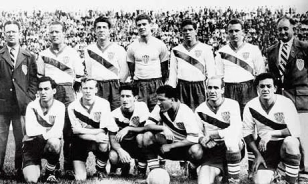 USA 1950: Frank Borghi, Harry Keough, Joe Maca, Ed McIlvenny, Charlie Colombo, Walter Bahr, Gino Parian, John Souza, Frank Wallace, Ed Souza, Joe Gaetjens.
USA 1950: Frank Borghi, Harry Keough, Joe Maca, Ed McIlvenny, Charlie Colombo, Walter Bahr, Gino Parian, John Souza, Frank Wallace, Ed Souza, Joe Gaetjens.
Manager: William Jeffrey
Achievement: They beat England 1-0 in the 1950 World Cup.
Key men: Joe Gaetjens – Haitian-born forward who scored the goal that humbled England. Although capped three times by the US, he was never given American citizenship. Ed McIlvenny, Scottish wing half who played briefly for Manchester United and later turned out for Waterford and Headington United (Oxford United).
Perception: Contrary to popular opinion, the team was not built around non-Americans. However, it was largely drawn from St. Louis.
 USSR 1960: Lev Yashin, Giri Chokheli, Anatoly Krutikov, Anatoli Maslyonkin, Yuriy Younov, Igor Netto, Slava Metreveli, Viktor Ponedelnik, Valentin Ivanov, Valentin Bubukin, Mikheil Meskhi.
USSR 1960: Lev Yashin, Giri Chokheli, Anatoly Krutikov, Anatoli Maslyonkin, Yuriy Younov, Igor Netto, Slava Metreveli, Viktor Ponedelnik, Valentin Ivanov, Valentin Bubukin, Mikheil Meskhi.
Manager: Gavriil Kachalin
Achievement: European Championship winners 1960 – beating Hungary, Czechoslavakia and Yugoslavia to win the competition.
Key men: Lev Yashin, considered the world’s best goalkeeper at the time, renowned for his bravery and athleticism. Vocal and very authoritive both for the USSR and his club, Dynamo Moscow; Igor Netto, captain of the team and one of the Soviet Union’s greatest players. An intelligent central midfielder who played for Spartak Moscow; Slava Metreveli, fast winger who was born in Georgia and played for Dinamo Tbilisi. Won 48 caps for USSR.
Perception: Muscular team who were too physical and strong for their opponents.
W
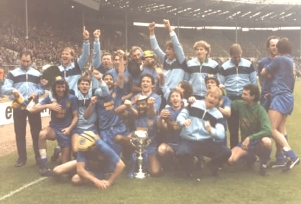 Wealdstone 1984-85: Bob Iles, Steve Perkins, Roy Davies, Dennis Byatt, Paul Bowgett, Robin Wainwright, Brian Greenaway, Lee Holmes, Alan Cordice, Andy Graham, Gary Donnellan, Neil Cordice, Mark Graves.
Wealdstone 1984-85: Bob Iles, Steve Perkins, Roy Davies, Dennis Byatt, Paul Bowgett, Robin Wainwright, Brian Greenaway, Lee Holmes, Alan Cordice, Andy Graham, Gary Donnellan, Neil Cordice, Mark Graves.
Manager: Brian Hall
Achievements: Gola League champions 1984-85, FA Trophy winners 1984-85.
Key men: Paul Bowgett, non-league stalwart who was a youth player at Tottenham and played for Wimbledon in the Football League before playing over 400 games for Wealdstone. A central defender who could also appear in midfield, he later played for Hitchin, Baldock and Stevenage. Alan Cordice, fast front man who was a pivotal figure in Wealdstone’s success. Scored 109 goals for the club in 334 appearances. He was capped by England’s semi-professional XI. Robin Wainwright, lanky midfielder who started out as a professional, playing for Millwall and Luton Town, among others. Was a ball boy in the 1966 World Cup final and made over 400 appearances for Wealdstone.
Perception: Hard-working and focused team of experienced players, the peak season in a very consistent period for the club. The first non-league club to achieve the double of National League (then Gola League) and FA Trophy.

West Bromwich Albion 1886-1888: Bob Roberts, Harry Green, Harry Bell, Ezra Horton, Charlie Perry, George Timmins, George Woodhall, Tommy Green, Jem Bayliss, Arthur Leach, George Bell, Albert Aldridge, Jack Paddock, Tom Pearson, Billy Bassett, Joe Wilson
Achievement: FA Cup winners 1888; FA Cup finalists 1886, 1887
Key men: Billy Bassett, 16 England caps and eight goals in a long career. A quick, direct winger with superb ball control. Gave WBA 50 years service on and off the pitch; Bob Roberts, tall goalkeeper known as “Long Bob” and “the Prince of goalkeepers”. Won three caps for England and could also play in an outfield position; George Woodhall, a sprightly centre forward or outside right who was capped by England. A hard working player who excelled at crossing. Also played for Wolves.
Perception: Fit team packed with England internationals, beat the great Preston side in the cup final of 1888.
 West Bromwich Albion 1919-20: Hubert Pearson, Joe Smith, Jesse Pennington, Sammy Richardson, Sid Bowser, Bobby McNeal, Jack Crisp, Alfred Smith, Alf Bentley, Fred Morris, Howard Gregory, Tommy Magee.
West Bromwich Albion 1919-20: Hubert Pearson, Joe Smith, Jesse Pennington, Sammy Richardson, Sid Bowser, Bobby McNeal, Jack Crisp, Alfred Smith, Alf Bentley, Fred Morris, Howard Gregory, Tommy Magee.
Manager: Fred Everiss
Achievement: Football League champions 1919-20.
Key men: Jesse Pennington, outstanding full back who played for WBA from 1907 to 1920, winning the last of his 25 England caps at the age of 36. Renowned as a gentleman on and off the pitch; Fred Morris, former Royal Flying Corp pilot who served in WW1, leading scorer in the Football League Division One with 37 goals; Joe Smith, consistent full back picked up from local football who went on to be capped by England. Played over 400 league games for Albion.
Perception: A team built on a strong defence but also prolific in front of goal, scoring 104 goals in 42 games.
 West Bromwich Albion 1967-68: John Osborne, Doug Fraser, Graham Williams, Tony Brown, John Talbut, John Kaye, Graham Lovett, Ian Collard, Jeff Astle, Bobby Hope, Clive Clark, Dennis Clarke.
West Bromwich Albion 1967-68: John Osborne, Doug Fraser, Graham Williams, Tony Brown, John Talbut, John Kaye, Graham Lovett, Ian Collard, Jeff Astle, Bobby Hope, Clive Clark, Dennis Clarke.
Manager: Alan Ashman
Achievement: FA Cup winners 1967-68.
Key men: Jeff Astle, dangerous centre forward who scored in every round of the FA Cup in 1968, including the winning goal in the final against Everton. Won five caps for England but sadly died young from illness possibly linked to constant heading of the ball; Tony Brown, wing half/inside forward who was also a prolific goalscorer in a very long career with WBA. One England cap, arguably deserved more; Graham Williams, full back and captain of WBA, 26 caps for his country. Stead and reliable, hard in the tackle.
Perception: A team capable of very brilliant football, but woefully inconsistent. Three cup finals (one FA Cup., two Football League Cup) in as many years.
 West Bromwich Albion 1978-79: Tony Godden, Brendan Batson, Derek Statham, Tony Brown, John Wile, Ally Robertson, Bryan Robson, Len Cantello, Cyrille Regis, Ally Brown, Laurie Cunningham, John Trewick and David Mills.
West Bromwich Albion 1978-79: Tony Godden, Brendan Batson, Derek Statham, Tony Brown, John Wile, Ally Robertson, Bryan Robson, Len Cantello, Cyrille Regis, Ally Brown, Laurie Cunningham, John Trewick and David Mills.
Manager: Ron Atkinson
Achievement: Football League third place 1978-79, UEFA Cup quarter finals 1978-79.
Key men: Cyrille Regis, superb centre forward, strong, powerful, good technique. Signed from non-league Hayes in 1977 and made instant impact at WBA. Capped five times by England; Laurie Cunningham, brilliant ball-playing winger, full of tricks and skill. Signed from Orient in 1977 and left in 1979 to join Real Madrid. Six England caps; Bryan Robson, one of the best box-to-box midfielders of his generation, eventually winning 90 caps and captaining England. Joined Manchester United in 1981-82 for £ 1.5 million.
Perception: The famous “Three degrees” team with three black players, Batson, Regis and Cunningham. Great to watch, so close to success.
 West Ham United 1963-1965: Jim Standen, John Bond, Joe Kirkup, Eddie Bovington, Jack Burkett, Ken Brown, Bobby Moore, Martin Peters, Peter Brabrook, Brian Dear, Ronnie Boyce, Johnny Byrne, Alan Sealey, Geoff Hurst, John Sisson
West Ham United 1963-1965: Jim Standen, John Bond, Joe Kirkup, Eddie Bovington, Jack Burkett, Ken Brown, Bobby Moore, Martin Peters, Peter Brabrook, Brian Dear, Ronnie Boyce, Johnny Byrne, Alan Sealey, Geoff Hurst, John Sisson
Manager: Ron Greenwood
Achievement: FA Cup winners 1963-64, European Cup-Winners’ Cup 1964-65.
Key men: Bobby Moore, skipper of the Hammers and the 1966 England team, the consummate professional and outstanding half-back, great timing in the tackle and leadership; Geoff Hurst, tall striker, hard-worker, good in the air and in linking-up with team-mates. England 1966 hero, netting a hat-trick in the final; Johnny Byrne, forward signed from Crystal Palace and compared by Ron Greenwood to Alfredo di Stefano, England international, 11 caps.
Perception: Capable of superb, flowing and thoughtful footballer. Team indelibly linked to the England 1966 World Cup winners.
 West Ham United 1974-1976: Mervyn Day, John McDowell, Frank Lampard, Keith Coleman, Billy Bonds, Tommy Taylor, Pat Holland, Kevin Lock, Graham Paddon, Alan Taylor, Billy Jennings, Keith Robson, Trevor Brooking.
West Ham United 1974-1976: Mervyn Day, John McDowell, Frank Lampard, Keith Coleman, Billy Bonds, Tommy Taylor, Pat Holland, Kevin Lock, Graham Paddon, Alan Taylor, Billy Jennings, Keith Robson, Trevor Brooking.
Manager: John Lyall
Achievement: FA Cup winners 1974-75, European Cup-Winners’ Cup finalists 1975-76.
Key men: Billy Bonds, captain of the side and inspirational figure. All action, 100% effort and a West Ham legendary figure; Trevor Brooking, one-club man who made over 500 league appearances for the Hammers. A cultured player who won 47 caps for England, playing in two major competitions; Graham Paddon, swashbuckling midfielder who joined the club from Norwich City in 1973. A strong left foot, he also possessed a very long throw-in.
Perception: Inconsistent team but capable of raising their game in cup competitions.
 West Ham United 1985-86: Phil Parkes, Ray Stewart, Steve Walford, Tony Gale, Alvin Martin, Alan Devonshire, Mark Ward, Frank McAvennie, Alan Dickens, Tony Cottee, Neil Orr, George Parris.
West Ham United 1985-86: Phil Parkes, Ray Stewart, Steve Walford, Tony Gale, Alvin Martin, Alan Devonshire, Mark Ward, Frank McAvennie, Alan Dickens, Tony Cottee, Neil Orr, George Parris.
Manager: John Lyall
Achievement: Football League Division One third place.
Key men: Ray Stewart, Scottish full back signed from Dundee United who scored over 60 league goals for the club, mostly from the penalty spot. The only non-Englishman to play in West Ham’s cup-winning teams; Alan Devonshire, returned from a long injury lay-off to play a key role in creating goals for the Hammers’ forward in 1985-86. A pacy player earlier in his career, he won eight England caps between 1980 and 1983; Frank McAvennie, joined from St. Mirren and converted from midfield to striker where he excelled, scoring 33 league goals in 1985-86. Formed a good partnership with Tony Cottee, but returned to Scotland in 1987. Five caps for Scotland.
Perception: A one-season team that went close to winning the league title.
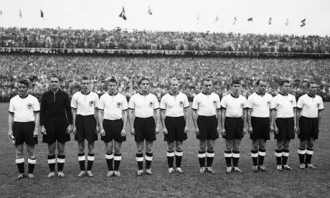 West Germany 1954: Toni Turek, Heinz Kwaitowski, Josef Posipal, Werner Liebrich, Werner Kohlmeyer, Horst Eckel, Karl Mai, Hemlmut Rahn, Max Morlock, Ottmar Walter, Fritz Walter, Hans Schäfer, Fritz Laband, Hans Bauer, Berni Klodt, Paul Mebus, Richard Herrmann, Alfred Pfaff.
West Germany 1954: Toni Turek, Heinz Kwaitowski, Josef Posipal, Werner Liebrich, Werner Kohlmeyer, Horst Eckel, Karl Mai, Hemlmut Rahn, Max Morlock, Ottmar Walter, Fritz Walter, Hans Schäfer, Fritz Laband, Hans Bauer, Berni Klodt, Paul Mebus, Richard Herrmann, Alfred Pfaff.
Manager: Sepp Herberger
Achievements: World Cup winners 1954
Key men: Fritz Walter, 33 year-old attacking midfielder and captain who became a folk hero due to the 1954 World Cup. An heroic figure, he won 61 caps and scored 33 goals. He was a prisoner of war during WW2 and escaped imprisonment in a Russian Gulag. Played for Kaiserlautern for most of his career, almost averaging a goal a game; Helmut Rahn, a winger who scored two goals in the 1954 final, including the winner four minutes from time. Played for Rott-Weiß Essen at the peak of his career and became known as “the cannon from Essen”. Won 40 caps, scoring 21 goals; Max Morlock, scored six goals in 1954 World Cup, including one in the final. Played for Nürnberg, scoring almost 300 goals in almost 500 games. A very technical player with a strong fighting spirit.
Perception: A physical and very strategic team, marshalled by legendary coach Sepp Herberger.
 West Germany 1966: Hans Tilkowski, Horst-Dieter Höttges, Willi Schulz, Wolfgang Weber, Karl-Heinz Schnellinger, Franz Beckenbauer, Wolfgang Overath, Helmut Haller, Uwe Seeler, Sigfried Held, Lothar Emmerich, Albert Bruells, Werner Kraemer
West Germany 1966: Hans Tilkowski, Horst-Dieter Höttges, Willi Schulz, Wolfgang Weber, Karl-Heinz Schnellinger, Franz Beckenbauer, Wolfgang Overath, Helmut Haller, Uwe Seeler, Sigfried Held, Lothar Emmerich, Albert Bruells, Werner Kraemer
Manager: Helmut Schön
Achievements: World Cup finalists 1966
Key men: Uwe Seeler, a Hamburg legend, Seeler, a modest character, was captain of the 1966 side. Renowned for his strong approach, he was remarkably good in the air. Scored almost 500 goals for Hamburg and won 72 caps for West Germany, scoring 43 goals; Helmut Haller, a winger with good dribbling skills. A playmaker and a goalscorer, Haller won 33 caps for his country and played in Italy with Bologna and Juventus. Karl-Heinz Schnellinger, one of the most complete full backs of his generation, he could also play as sweeper. Schnellinger played for, among others, Köln, Roma and AC Milan and won 47 caps, scoring one goal, in the so-called “Game of the Century”, the World Cup semi-final in 1970 against Italy.
Perception: The forerunner of the great West German teams of the early 1970s.
 West Germany 1972-1974: Sepp Maier, Franz Beckenbauer, Horst-Dieter Höttges, Berti Vogts, Hans-Georg Schwarzenbeck, Paul Breitner, Herbert Eimmer, Uli Hoeneß, Günter Netzer, Juup Heynckes, Erwin Kremers, Gerd Müller, Jupp Heynckes, Heinz Flohe, Rainer Bonhof, Wolfgang Overath, Bernd Holzenbein, Jürgen Grabowski.
West Germany 1972-1974: Sepp Maier, Franz Beckenbauer, Horst-Dieter Höttges, Berti Vogts, Hans-Georg Schwarzenbeck, Paul Breitner, Herbert Eimmer, Uli Hoeneß, Günter Netzer, Juup Heynckes, Erwin Kremers, Gerd Müller, Jupp Heynckes, Heinz Flohe, Rainer Bonhof, Wolfgang Overath, Bernd Holzenbein, Jürgen Grabowski.
Manager: Helmut Schön.
Achievement: World Cup third place 1970, European Championship winners 1972, World Cup winners 1974.
Key men: Franz Beckenbauer, one of Germany’s greatest of all time, “Der Kaiser” was one of the outstanding players of the 1970s, captaining and later managing his country and Bayern Munich. Midfielder, sweeper or central defender; Günter Netzer, powerful charismatic midfielder with a powerful shot, who played for Borussia Mönchengladbach before moving to Real Madrid. 1972 was his year, for by the time 1974 World Cup came along, he was out of favour and played just 20 minutes in the competition; Gerd Müller, prolific goalscorer for West Germany and Bayern Munich, top scorer in both the 1970 World Cup and 1972 Euros; Paul Breitner, Bavarian full back or midfielder with strong political views. The woolly-haired Breitner played for Bayern Munich before joining Real Madrid in 1974. An expert penalty taker with a fierce long-range shot.
Perception: Wonderful team, full of energy, power and skill. Arguably stronger in 1972 than they were in 1974 when they won the World Cup.
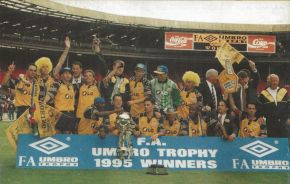 Woking 1994-1997: Laurence Batty, John Crumplin, Kevan Brown, Dereck Brown, Mark Tucker, Terry Howard, Lloyd Wye, Steve Foster, Tom Jones, Scott Steele, Colin Fielder, Clive Walker, Steve Thompson, Robin Taylor, David Puckett, Darran Hay, Shane Wye, Justin Jackson, Richard Newbery.
Woking 1994-1997: Laurence Batty, John Crumplin, Kevan Brown, Dereck Brown, Mark Tucker, Terry Howard, Lloyd Wye, Steve Foster, Tom Jones, Scott Steele, Colin Fielder, Clive Walker, Steve Thompson, Robin Taylor, David Puckett, Darran Hay, Shane Wye, Justin Jackson, Richard Newbery.
Manager: Geoff Chapple
Achievements: FA Trophy winners 1993-94, 1994-95, 1996-97
Key men: Laurence Batty, one of the best non-league goalkeepers of his time, Barry started with Fulham and went on. To make well over 300 appearances for Woking. He also played for an assortment of non-league clubs. Darran Hay, made history by scoring the winning goal in two Wembley FA Trophy finals. Began his career with Cambridge United but was better known for his non-league exploits. A popular figure with the supporters. Clive Walker, one of the few players to have enjoyed a lengthy Football League career, followed by an equally long and productive time in non-league. Initially with Chelsea where he forged a reputation for his pace, shooting and crossing ability, he played for Fulham, Sunderland, QPR and Brighton and had spells with Woking and Cheltenham where his crossing created many goals for his team-mates.
Perception: A very talented team, managed by a manager who knew how to get the best out of his players.
 Wolverhampton Wanderers 1938-39: Alec Scott, Bill Morris, Frank Taylor, Tom Galley, Stan Cullis, Joe Gardner, Stan Burton, Alex McIntosh, Dennis Westcott, Dicky Dorsett, Teddy Maguire, Harry Thompson.
Wolverhampton Wanderers 1938-39: Alec Scott, Bill Morris, Frank Taylor, Tom Galley, Stan Cullis, Joe Gardner, Stan Burton, Alex McIntosh, Dennis Westcott, Dicky Dorsett, Teddy Maguire, Harry Thompson.
Manager: Major Frank Buckley
Achievements: Football League runners-up 1938-39, FA Cup finalists 1938-39.
Key men: Stan Cullis, Mr Wolverhampton Wanderers, representing the club as a manager and player (centre half) from the 1930s to the 1960s. Although he won 12 caps for England, the second world war took the best of his career; Dennis Westcott, centre forward who also saw his career disrupted by WW2. Joined Wolves from New Brighton and later played for Manchester City and Blackburn Rovers. Capped by England in wartime internationals; Bill Morris, a solid full back who was capped by England. Morris joined Wolves after being on the books of West Bromwich Albion.
Perception: Fit and energetic team, harnessed by the innovative and often bizarre ideas of Major Frank Buckley.
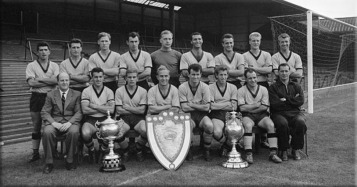 Wolverhampton Wanderers 1957-1960: Malcolm Finlayson, Eddie Stuart, Gerry Harris, Eddie Clamp, Billy Wright, Ron Flowers, Norman Deeley, Colin Booth, Jimmy Murray, Peter Broadbent, Jimmy Mullen, Mickey Lill, Bill Slater, George Showell, Des Horne, Barry Stobart.
Wolverhampton Wanderers 1957-1960: Malcolm Finlayson, Eddie Stuart, Gerry Harris, Eddie Clamp, Billy Wright, Ron Flowers, Norman Deeley, Colin Booth, Jimmy Murray, Peter Broadbent, Jimmy Mullen, Mickey Lill, Bill Slater, George Showell, Des Horne, Barry Stobart.
Manager: Stan Cullis
Achievements: Football League champions 1957-58 and 1958-59; FA Cup winners 1959-60.
Five year record (1955-56 to 1959-60): 3 – 6 -1 -1 – 2
Key men: Billy Wright, an England legend who captained club and country in a career that spanned 1939-1959. Won 105 caps for England, including the infamous 1953 defeat at the hands of Hungary. Wright was less successful as manager of Arsenal, but remained a much-loved figure in the game; Ron Flowers, a member of the 1966 World Cup England squad, Flowers played over 500 games for Wolves and won 49 caps for England, starting out as an attacking half back but developing into a defensive role; Jimmy Murray scored over 200 goals for Wolves and was top scorer in the title-winning season of 1957-58. Later enjoyed success at non-league level; Peter Broadbent, an inside forward who won seven caps for England. Played 452 league games for Wolves. A much-admired player, he had a profund influence of many players, including George Best.
Perception: Fast and furious at times, a team that bridged the gap between the Busby babes and Bill Nicholson’s Spurs
 Zaire 1974: Kazadi Mwamba, Mwepu Ilunga, Lobila Boba, Bwanga Tschimen, Mwanza Mukombo, Kilasu Massamba, Mana Mamuwene, Kidumu Mantantu, Mayanga Maku, Ndaya Mulamba, Kakoko Etepé, Kembo Uba Kembo, Kibonge Mafu, Tubilandu Ndimbi, Tshinabu Wa Munda, Jean Kalala N’Tumba.
Zaire 1974: Kazadi Mwamba, Mwepu Ilunga, Lobila Boba, Bwanga Tschimen, Mwanza Mukombo, Kilasu Massamba, Mana Mamuwene, Kidumu Mantantu, Mayanga Maku, Ndaya Mulamba, Kakoko Etepé, Kembo Uba Kembo, Kibonge Mafu, Tubilandu Ndimbi, Tshinabu Wa Munda, Jean Kalala N’Tumba.
Manager: Blagoje Vidinić, Yugoslav who also took Morocco to the World Cup in 1970.
Achievement: Africa Cup of Nations winners 1974; World Cup 1974, group stage; Africa Cup of Nations 1972, fourth place.
Key men: Lobilo Boba, defender who played for Vita Club. Runner-up in African footballer of the year in 1974; Bwange Tshimen, known as the “Black Beckenbauer” for his elegant play as a sweeper. TB Mazembe player who was African footballer of the year in 1973 and runner-up in 1972.
Perception: The Leopards of 1974 were an outstanding team within their own continent but were very much out of their depth in the World Cup. Raw and a little ill-disciplined, they had some excellent players.



